Waste Management Business Plan Template & PDF Example
- September 4, 2024

Creating a comprehensive business plan is crucial for launching and running a successful waste management business. This plan serves as your roadmap, detailing your vision, operational strategies, and financial plan. It helps establish your waste management business’s identity, navigate the competitive market, and secure funding for growth.
This article not only breaks down the critical components of a waste management business plan, but also provides an example of a business plan to help you craft your own.
Whether you’re an experienced entrepreneur or new to the service industry, this guide, complete with a business plan example, lays the groundwork for turning your waste management business concept into reality. Let’s dive in!
Our waste management business plan is structured to address all key components necessary for a detailed and strategic approach. It outlines the company’s operational methods, marketing strategies, market environment, competitors, management team, and financial projections.
- Executive Summary : Offers an overview of the waste management company’s business model, emphasizing its commitment to providing comprehensive waste management solutions, market analysis , management expertise, and financial strategy.
- Operations & Service Area Coverage: Discusses the operational scope, including the geographical coverage of services, types of waste managed, and the company’s operational facilities and capabilities.
- Services & Rates: Details the waste management services offered, such as collection, recycling, hazardous waste handling, and their associated pricing structure.
- Key Stats: Provides essential statistics that illustrate the size and growth of the waste management industry, highlighting the ongoing demand for such services.
- Key Trends : Highlights significant trends in waste management, including technological advancements, regulatory changes, and shifts towards sustainability.
- Key Competitors: Evaluates major competitors in the market, detailing their services and how the company differentiates itself from these competitors.
- SWOT Analysis : Conducts a thorough analysis of strengths, weaknesses, opportunities, and threats, offering strategic insights for the company’s growth.
- Marketing Plan : Specifies the marketing strategies designed to promote the waste management services and establish long-term relationships with clients.
- Timeline : Sets key milestones for the waste management company, outlining the path from startup to expansion and operational excellence.
- Management: Introduces the management team, highlighting their experience, roles, and contributions to driving the company towards its goals.
- Financial Plan: Forecasts the financial performance of the waste management company, detailing expected revenue streams, profitability, and the financial strategy to ensure sustainability and growth.


Waste Management Business Plan Template (Download)

Fully editable 30+ slides Powerpoint presentation business plan template.
Download an expert-built 30+ slides Powerpoint business plan template
Executive Summary
The Executive Summary introduces your waste management business plan, offering a concise overview of your company and its services. It should detail your market positioning, the range of waste collection, recycling, and disposal services you offer, its location, capacity, and an outline of day-to-day operations.
This section should also explore how your waste management business will integrate into the local market, including the number of direct competitors within the area, identifying who they are, along with your company’s unique selling points that differentiate it from these competitors.
Furthermore, you should include information about the management and co-founding team, detailing their roles and contributions to the company’s success. Additionally, a summary of your financial projections, including revenue and profits over the next five years, should be presented here to provide a clear picture of your company’s financial plan.
Waste Management Business Plan Executive Summary Example

Business Overview
In the business overview section of your executive summary, provide clear and direct information about your waste management service. This should include your company’s name, the regions you serve, the services you offer, and a snapshot of your operations.
This section introduces your business and sets the stage for discussing its unique attributes. Your unique selling proposition ( USP ) is what differentiates your service from others in the industry. Whether it’s your advanced technology, commitment to zero-waste goals, or custom solutions for different waste types, your USP should grab your audience’s attention and highlight the value your service brings to the waste management market.
Example: “GreenHorizon Waste Solutions,” serving the tri-state area, offers a comprehensive suite of waste management services, including recycling, composting, and hazardous waste handling. With a capacity to process over 5,000 tons of waste daily, our USP is our innovative approach to waste minimization and our state-of-the-art recycling technology, which significantly reduces landfill reliance.
Market Overview
It’s important to outline the waste management industry’s size, growth trends, and dynamics, using data such as market value and growth rates. Highlighting trends like the adoption of smart waste solutions and the shift towards sustainable practices can give insight into the industry’s direction and your company’s role within it.
The competitive landscape should also be addressed. Here, you’ll identify your main competitors and explain how your service stands out, whether through unique waste processing methods, customer service excellence, or environmental stewardship.
Example: GreenHorizon operates in the $140 billion waste management industry, expected to grow at a 5% CAGR through 2030. Despite competition, GreenHorizon distinguishes itself with its focus on advanced waste processing technologies and custom solutions, catering to the specific needs of residential, commercial, and industrial clients.
Management Team
The expertise and background of your management team are key assets. Highlight the qualifications and experiences of your team members, emphasizing the industry knowledge and leadership driving your business.
Example: The GreenHorizon team is led by founders Alex Reed and Jamie Chen. Alex brings over 20 years of experience in environmental engineering, while Jamie’s expertise in sustainable business practices and regulatory compliance sets a strong foundation for GreenHorizon’s operations and growth.
Financial Plan
Summarize your financial goals and projections, including revenue targets and profit margins, to provide a clear overview of your waste management service’s financial future.
Example: GreenHorizon aims to achieve $6.7 million in annual revenue by 2028, with a 15% EBITDA margin. Our financial strategy focuses on expanding our service offerings and enhancing our processing capabilities, driving growth and efficiency while upholding our commitment to environmental sustainability.
For a waste management business, the Business Overview section can be concisely divided into 2 main slides:
Operations & Service Area Coverage
Detail the operational aspects of your waste management business, emphasizing the efficiency, reliability, and environmental compliance of your services. Mention the geographical scope of your service area, highlighting its extent and the variety of communities or businesses you serve.
Explain why your operations are strategically located to optimize service delivery and logistical efficiency, such as proximity to major highways or waste processing facilities. Discuss how your operational capabilities and service area coverage position your business to meet the needs of your target market effectively.
Services & Rates
Outline the range of waste management services offered, from regular residential waste collection to specialized services like recycling, hazardous waste disposal, or commercial waste management solutions.
Detail your pricing strategy , ensuring it is competitive and reflects the value of the services you provide, taking into consideration factors like service frequency, waste type, and volume. Highlight any unique service offerings, subscription models, or incentive programs for waste reduction and recycling that distinguish your business from competitors, promoting sustainability and customer engagement.

Industry size & growth
In the Market Overview of your waste management business plan, begin by analyzing the size of the waste management industry and its growth potential. This exploration is vital for grasping the market’s breadth and pinpointing opportunities for expansion.
Key market trends
Next, delve into recent trends within the waste management sector, such as the escalating demand for sustainable and eco-friendly waste disposal methods, advancements in recycling technologies, and the increasing importance of waste-to-energy solutions.
For instance, underscore the growing consumer and corporate emphasis on reducing environmental impact, which has led to a heightened demand for services capable of managing recyclable, compostable, and hazardous waste more effectively.
Competitive Landscape
A competitive analysis is not just a tool for gauging the position of your waste management business in the market and its key competitors; it’s also a fundamental component of your business plan. This analysis helps in identifying your waste management’s unique selling points, essential for differentiating your business in a competitive market.
In addition, the competitive analysis is integral in laying a solid foundation for your business plan. By examining various operational aspects of your competitors, you gain valuable information that ensures your business plan is robust, informed, and tailored to succeed in the current market environment.
Identifying Your Competitors in the Waste Management Industry
Begin your competitive analysis by identifying the key players in the waste management sector. Local waste disposal companies, recycling facilities, and waste management services are your immediate competitors. Take note of both direct competitors, like other waste management companies in your region, and indirect competitors, such as companies offering specialized recycling services or innovative waste reduction solutions.
Utilize online resources and industry databases to compile a comprehensive list of competitors. Platforms like industry forums, government waste management reports, and customer reviews can offer valuable insights into the strengths and weaknesses of your competitors. For instance, positive reviews highlighting the efficiency and eco-friendly practices of a competitor could indicate a significant strength.

Waste Management Business Competitors’ Strategies
To analyze your competitors effectively, consider various aspects of their strategies:
- Waste Management Services: Examine the range of services offered by competitors. If a waste management company, like “Eco Solutions,” is gaining traction for its comprehensive recycling programs, this suggests a market trend toward sustainability and eco-conscious waste management.
- Technology and Innovation: Assess the technological advancements and innovative practices adopted by competitors. A waste management company employing state-of-the-art waste sorting technologies or implementing smart waste collection systems may have a competitive edge.
- Pricing Structure : Compare your pricing structure with that of your competitors. Are your waste management services priced competitively with other local companies, or do you position yourself as a premium service with enhanced features like “Efficient Waste Solutions”?
- Marketing Strategies : Investigate how competitors market their services. Do they rely on digital marketing, social media, or community outreach programs? Understanding their marketing tactics can help you refine your own strategies to reach and engage your target audience effectively.
- Customer Satisfaction: Evaluate the customer experience provided by competitors. A waste management company known for its prompt and reliable service, or one with excellent customer support, may have a distinct advantage.
- Environmental Commitment: Assess the environmental sustainability practices of competitors. In a market increasingly concerned with eco-friendly solutions, a waste management company with a strong commitment to environmental responsibility may have a competitive edge.
What’s Your Waste Management Business’s Value Proposition?
Reflect on your waste management business’s unique value proposition . Perhaps your company specializes in innovative waste-to-energy solutions, or you prioritize community engagement and educational programs to promote responsible waste disposal.
Identify market gaps through customer feedback and industry trends. For instance, if customers express a growing demand for streamlined electronic waste recycling and your competitors are not fully addressing this need, it represents an opportunity for your business to stand out.
Consider your location and target market . A waste management company operating in an industrial area might emphasize industrial waste solutions, while one in a residential neighborhood could focus on household recycling initiatives.

Begin by executing a SWOT analysis for your waste management business, pinpointing Strengths (such as advanced recycling technology and comprehensive waste solutions), Weaknesses (including high initial investment costs or stringent regulatory compliance), Opportunities (for instance, the growing emphasis on sustainable practices and green energy), and Threats (such as shifts in environmental policies that could impact operational costs).

Marketing Plan
Then, formulate a marketing plan that details strategies for engaging and expanding your customer base through focused advertising campaigns, service promotions, an active online presence, and participation in environmental initiatives. Highlight how these efforts will not only raise awareness of your waste management solutions but also underscore your commitment to sustainability and community well-being.
Marketing Channels
Utilize various marketing channels to reach your target audience , increase brand visibility, and showcase your waste management solutions.
Digital Marketing
- Website and SEO: Develop an informative website emphasizing your services, expertise, case studies, and industry insights. Optimize it for search engines to enhance online visibility.
- Content Marketing: Create engaging blog posts, whitepapers, and infographics focusing on waste management trends, recycling guides, and sustainability practices to position your business as an industry thought leader.
- Social Media: Harness social media platforms such as LinkedIn, Twitter, and Instagram to disseminate educational content, success stories, client testimonials, and updates about waste management innovations.
Local Networking and Outreach
- Industry Events: Participate in environmental and waste management conferences, workshops, and trade shows to network with potential clients, industry experts, and government officials.
- Community Engagement: Collaborate with local authorities, educational institutions, and environmental groups to organize clean-up drives, awareness campaigns, or workshops on waste reduction and recycling.
Promotional Activities
Engage your target audience through appealing offers and initiatives to drive interest in your waste management services.
- Tailored Solutions: Offer customizable waste management plans catering to specific client needs, such as recycling optimization, hazardous waste disposal, or sustainable waste-to-energy solutions.
- Free Consultations: Offer complimentary waste audits or consultations to potential clients. This not only showcases your expertise but also allows you to understand their specific needs, thereby tailoring solutions that align with their objectives and challenges.
- Referral Programs: Encourage existing clients or industry partners to refer your services by offering incentives such as discounts, additional services, or loyalty rewards for successful referrals. Consider implementing a structured and mutually beneficial referral program that acknowledges and rewards those who bring in new business.

Sales Channels
Implement effective sales strategies to convert leads into clients and maximize revenue opportunities.
- Consultative Selling: Continue to educate potential clients about the significance of proper waste management practices, elucidating the environmental benefits, cost savings, and long-term advantages through personalized consultations. Showcase expertise and commitment by offering in-depth discussions on waste management strategies tailored to the client’s unique needs and objectives.
- Customized Proposals: Elevate your proposals by providing detailed and personalized waste management strategies, inclusive of cost breakdowns and projected outcomes aligned precisely with the client’s goals and operational requirements. This reinforces transparency and professionalism, instilling confidence in your company’s ability to deliver results.
- Service Bundling and Add-Ons: Showcase the versatility and additional value your services offer by bundling waste management services or providing value-added offerings. Consider providing ongoing waste reduction monitoring, educational workshops, or comprehensive sustainability reports, positioning your services as holistic solutions that go beyond mere waste disposal.
Client Retention Strategies
- Regular Follow-ups: Strengthen relationships with clients by maintaining consistent communication channels. Beyond initial transactions, keep clients engaged through newsletters, industry updates, and tips for optimizing their waste management processes. Ensure they stay informed about regulatory changes and industry trends.
- Exceptional Customer Service: Uphold a reputation for exceptional customer service by being responsive, proactive, and empathetic. Address any concerns promptly, seek feedback regularly, and actively work towards resolving any issues that may arise. Aim for a seamless and positive client experience throughout their engagement with your waste management services.
Strategy Timeline
Conclude with a comprehensive timeline that maps out key milestones, from the launch of your waste management services and marketing initiatives to customer acquisition and potential service expansion. This timeline should serve as a roadmap, guiding your business towards achieving its short and long-term goals with clarity and strategic focus.
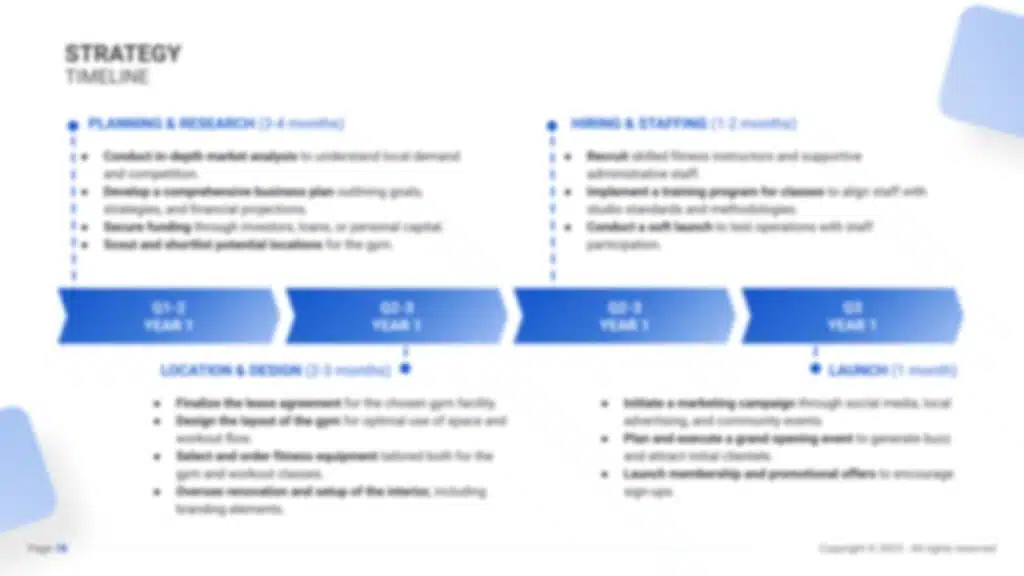
The Management section focuses on the waste management business’s management and their direct roles in daily operations and strategic direction. This part is crucial for understanding who is responsible for making key decisions and driving the waste management business toward its financial and operational goals.
For your waste management business plan, list the core team members, their specific responsibilities, and how their expertise supports the business.

The Financial Plan section is a comprehensive analysis of your financial projections for revenue, expenses, and profitability. It lays out your waste management business’s approach to securing funding, managing cash flow, and achieving breakeven.
This section typically includes detailed forecasts for the first 5 years of operation, highlighting expected revenue, operating costs and capital expenditures.
For your waste management business plan, provide a snapshot of your financial statement (profit and loss, balance sheet, cash flow statement), as well as your key assumptions (e.g. number of customers and prices, expenses, etc.).
Make sure to cover here _ Profit and Loss _ Cash Flow Statement _ Balance Sheet _ Use of Funds

Related Posts

Carpet and Upholstery Cleaning Business Plan Template & PDF Example
- Business Plan

Taxi Business Plan Template & PDF Example

Competitive Analysis for a Carpet and Upholstery Cleaning Business (Example)
- Business Plan , Competitive Analysis
Privacy Overview
- Sample Business Plans
- Manufacturing & Wholesale
Waste Management Business Plan

The need and demand for properly managing waste are increasing day by day, so if you are planning to cash out the opportunity and make a profitable business out of it, then waste management is a great choice.
Anyone can start a new business, but you need a detailed business plan when it comes to raising funding, applying for loans, and scaling it like a pro!
Need help writing a business plan for your waste management business? You’re at the right place. Our waste management business plan template will help you get started.

Free Business Plan Template
Download our free waste management business plan template now and pave the way to success. Let’s turn your vision into an actionable strategy!
- Fill in the blanks – Outline
- Financial Tables
How to Write A Waste Management Business Plan?
Writing a waste management business plan is a crucial step toward the success of your business. Here are the key steps to consider when writing a business plan:
1. Executive Summary
An executive summary is the first section planned to offer an overview of the entire business plan. However, it is written after the entire business plan is ready and summarizes each section of your plan.
Here are a few key components to include in your executive summary:
- Introduce your Business: Start your executive summary by briefly introducing your business to your readers. This section may include the name of your waste management business, its location, when it was founded, the type of waste management business (E.g., waste collection & hauling, recycling centers, composting facilities, hazardous waste management, landfill management), etc.
- Market Opportunity: Summarize your market research, including market size, growth potential, and marketing trends. Highlight the opportunities in the market and how your business will fit in to fill the gap.
- Waste Management Services: Highlight the waste management services you offer your clients. The USPs and differentiators you offer are always a plus. For instance, you may include waste collection & transportation, recycling services, composting services, landfill management, etc as some of your services.
- Marketing & Sales Strategies: Outline your sales and marketing strategies—what marketing platforms you use, how you plan on acquiring customers, etc.
- Financial Highlights: Briefly summarize your financial projections for the initial years of business operations. Include any capital or investment requirements, associated startup costs, projected revenues, and profit forecasts.
- Call to Action: Summarize your executive summary section with a clear CTA, for example, inviting angel investors to discuss the potential business investment.
Ensure your executive summary is clear, concise, easy to understand, and jargon-free.
Say goodbye to boring templates
Build your business plan faster and easier with AI
Plans starting from $7/month

2. Business Overview
The business overview section of your business plan offers detailed information about your company. The details you add will depend on how important they are to your business. Yet, business name, location, business history, and future goals are some of the foundational elements you must consider adding to this section:
- Recycling centers
- Waste collection & hauling
- Composting facilities
- Hazardous waste management
- Waste-to-energy plants
- Landfill management
- Solid waste management
- Medical waste management
- Waste-consulting & advisory services
- Describe the legal structure of your waste management business, whether it is a sole proprietorship, LLC, partnership, or others.
- Explain where your business is located and why you selected the place.
- Owners: List the names of your waste management company’s founders or owners. Describe what shares they own and their responsibilities for efficiently managing the business.
- Mission Statement: Summarize your business’ objective, core principles, and values in your mission statement. This statement needs to be memorable, clear, and brief.
- Business History: If you’re an established waste management service provider, briefly describe your business history, like—when it was founded, how it evolved over time, etc. Additionally, If you have received any awards or recognition for excellent work, describe them.
- Future Goals: It’s crucial to convey your aspirations and vision. Mention your short-term and long-term goals; they can be specific targets for revenue, market share, or expanding your services.
This section should provide a thorough understanding of your business, its history, and its future plans. Keep this section engaging, precise, and to the point.
3. Market Analysis
The market analysis section of your business plan should offer a thorough understanding of the industry with the target market, competitors, and growth opportunities. You should include the following components in this section.
- Target market: Start this section by describing your target market. Define your ideal customer and explain what types of services they prefer. Creating a buyer persona will help you easily define your target market to your readers. For instance, residential customers, commercial & industrial sectors, construction & demolition companies, or industrial manufacturing companies would be an ideal target audience for a waste management business.
- Market size and growth potential: Describe your market size and growth potential and whether you will target a niche or a much broader market. For instance, the market size of waste management was 17.21 billion USD in 2022 as a whole, describe the market segment your business will cover.
- Competitive Analysis: Identify and analyze your direct and indirect competitors. Identify their strengths and weaknesses, and describe what differentiates your waste management business from them. Point out how you have a competitive edge in the market.
- Market Trends: Analyze emerging trends in the industry, such as technology disruptions, changes in customer behavior or preferences, etc. Explain how your business will cope with all the trends. For instance, waste-to-energy has a booming market; explain how you plan on dealing with this potential growth opportunity.
- Regulatory Environment: List regulations and licensing requirements that may affect your waste management company, such as federal laws & regulations, state & local regulations, state & local regulations, etc.
Here are a few tips for writing the market analysis section of your waste management business plan:
- Conduct market research, industry reports, and surveys to gather data.
- Provide specific and detailed information whenever possible.
- Illustrate your points with charts and graphs.
- Write your business plan keeping your target audience in mind.
4. Products And Services
The product and services section should describe the specific services and products that will be offered to customers. To write this section should include the following:
- Waste collection services
- Recycling services
- Composting services
- Waste-to-energy
- Describe each service: Provide a detailed description of each service you provide and the types of that particular service you provide. For instance; for recycling services, you can mention the recyclable materials you accept, the recycling procedures you use, and if you have any affiliations or certifications that improve your capacity for recycling.
- Quality measures: This section should explain how you maintain quality standards and consistently provide the highest quality service. This may include focus on customer satisfaction, safety performance, operational efficiency, continuous improvement, etc.
- Additional Services: Mention if your waste management company offers any additional services. You may include services like e-waste recycling, waste audits, consulting, etc.
In short, this section of your waste management plan must be informative, precise, and client-focused. By providing a clear and compelling description of your offerings, you can help potential investors and readers understand the value of your business.
5. Sales And Marketing Strategies
Writing the sales and marketing strategies section means a list of strategies you will use to attract and retain your clients. Here are some key elements to include in your sales & marketing plan:
- Unique Selling Proposition (USP): Define your business’s USPs depending on the market you serve, the equipment you use, and the unique services you provide. Identifying USPs will help you plan your marketing strategies. For example, comprehensive waste solutions, sustainable practices, customized solutions, or strong regulatory compliance could be some of the great USPs for a waste management company.
- Pricing Strategy: Describe your pricing strategy—how you plan to price your services and stay competitive in the local market. You can mention any discounts you plan on offering to attract new customers.
- Marketing Strategies: Discuss your marketing strategies to market your services. You may include some of these marketing strategies in your business plan—social media marketing, Google ads, content marketing, and print marketing.
- Sales Strategies: Outline the strategies you’ll implement to maximize your sales. Your sales strategies may include partnering with other businesses, offering referral programs, etc.
- Customer Retention: Describe your customer retention strategies and how you plan to execute them. For instance, introducing loyalty programs, discounts & offers, personalized service, etc.
Overall, this section of your waste management business plan should focus on customer acquisition and retention.
Have a specific, realistic, and data-driven approach while planning sales and marketing strategies for your waste management business, and be prepared to adapt or make strategic changes in your strategies based on feedback and results.
6. Operations Plan
The operations plan section of your business plan should outline the processes and procedures involved in your business operations, such as staffing requirements and operational processes. Here are a few components to add to your operations plan:
- Staffing & Training: Mention your business’s staffing requirements, including the number of employees, drivers, or other staff needed. Include their qualifications, the training required, and the duties they will perform.
- Operational Process: Outline the processes and procedures you will use to run your waste management business. Your operational processes may include waste assessment & planning, waste collection, sorting & segregation, recycling & recovering, waste disposal, etc.
- Equipment & Machinery: Include the list of equipment and machinery required for waste management, such as waste collecting vehicles, waste sorting & processing equipment, recycling equipment, hazardous waste handling equipment, landfill equipment, etc. Explain how these technologies help you maintain quality standards and improve the efficiency of your business operations.
Adding these components to your operations plan will help you lay out your business operations, which will eventually help you manage your business effectively.
7. Management Team
The management team section provides an overview of your waste management business’s management team. This section should provide a detailed description of each manager’s experience and qualifications, as well as their responsibilities and roles.
- Founders/CEO: Mention the founders and CEO of your waste management company, and describe their roles and responsibilities in successfully running the business.
- Key managers: Introduce your management and key members of your team, and explain their roles and responsibilities. It should include, senior management, and other department managers (e.g. operations manager, customer services manager, general manager.) involved in the waste management business operations, including their education, professional background, and any relevant experience in the industry. Organizational structure: Explain the organizational structure of your management team. Include the reporting line and decision-making hierarchy.
- Compensation Plan: Describe your compensation plan for the management and staff. Include their salaries, incentives, and other benefits.
- Advisors/Consultants: Mentioning advisors or consultants in your business plans adds credibility to your business idea. So, if you have any advisors or consultants, include them with their names and brief information consisting of roles and years of experience.
This section should describe the key personnel for your waste management services, highlighting how you have the perfect team to succeed.
8. Financial Plan
Your financial plan section should provide a summary of your business’s financial projections for the first few years. Here are some key elements to include in your financial plan:
- Profit & loss statement: Describe details such as projected revenue, operational costs, and service costs in your projected profit and loss statement . Make sure to include your business’s expected net profit or loss.
- Cash flow statement: The cash flow for the first few years of your operation should be estimated and described in this section. This may include billing invoices, payment receipts, loan payments, and any other cash flow statements.
- Balance Sheet: Create a projected balance sheet documenting your waste management business’s assets, liabilities, and equity.
- Break-even point: Determine and mention your business’s break-even point—the point at which your business costs and revenue will be equal. This exercise will help you understand how much revenue you need to generate to sustain or be profitable. Financing Needs: Calculate costs associated with starting a waste management business, and estimate your financing needs and how much capital you need to raise to operate your business. Be specific about your short-term and long-term financing requirements, such as investment capital or loans.
Be realistic with your financial projections, and make sure you offer relevant information and evidence to support your estimates.
9. Appendix
The appendix section of your plan should include any additional information supporting your business plan’s main content, such as market research, legal documentation, financial statements, and other relevant information.
- Add a table of contents for the appendix section to help readers easily find specific information or sections.
- In addition to your financial statements, provide additional financial documents like tax returns, a list of assets within the business, credit history, and more. These statements must be the latest and offer financial projections for at least the first three or five years of business operations.
- Provide data derived from market research, including stats about the industry, user demographics, and industry trends.
- Include any legal documents such as permits, licenses, and contracts.
- Include any additional documentation related to your business plan, such as product brochures, marketing materials, operational procedures, etc.
Use clear headings and labels for each section of the appendix so that readers can easily find the necessary information.
Remember, the appendix section of your waste management business plan should only include relevant and important information supporting your plan’s main content.
The Quickest Way to turn a Business Idea into a Business Plan
Fill-in-the-blanks and automatic financials make it easy.
This sample waste management business plan will provide an idea for writing a successful waste management plan, including all the essential components of your business.
After this, if you still need clarification about writing an investment-ready business plan to impress your audience, download our waste management business plan pdf .
Related Posts
Recycling Business Plan
Steps for Writing a Business Plan
Renewable Energy Business Plan
Main Components of a Business Plan
How to Create a Business Plan Cover Page
Competitive Analysis Frameworks Guide
Frequently Asked Questions
Why do you need a waste management business plan.
A business plan is an essential tool for anyone looking to start or run a successful waste management business. It helps to get clarity in your business, secures funding, and identifies potential challenges while starting and growing your business.
Overall, a well-written plan can help you make informed decisions, which can contribute to the long-term success of your waste management company.
How to get funding for your waste management business?
There are several ways to get funding for your waste management business, but self-funding is one of the most efficient and speedy funding options. Other options for funding are:
- Bank loan – You may apply for a loan in government or private banks.
- Small Business Administration (SBA) loan – SBA loans and schemes are available at affordable interest rates, so check the eligibility criteria before applying for it.
- Crowdfunding – The process of supporting a project or business by getting a lot of people to invest in your business, usually online.
- Angel investors – Getting funds from angel investors is one of the most sought startup options.
Apart from all these options, there are small business grants available, check for the same in your location and you can apply for it.
Where to find business plan writers for your waste management business?
There are many business plan writers available, but no one knows your business and ideas better than you, so we recommend you write your waste management business plan and outline your vision as you have in your mind.
What is the easiest way to write your waste management business plan?
A lot of research is necessary for writing a business plan, but you can write your plan most efficiently with the help of any waste management business plan example and edit it as per your need. You can also quickly finish your plan in just a few hours or less with the help of our business plan software .
How do I write a good market analysis in a waste management business plan?
Market analysis is one of the key components of your business plan that requires deep research and a thorough understanding of your industry. We can categorize the process of writing a good market analysis section into the following steps:
- Stating the objective of your market analysis—e.g., investor funding.
- Industry study—market size, growth potential, market trends, etc.
- Identifying target market—based on user behavior and demographics.
- Analyzing direct and indirect competitors.
- Calculating market share—understanding TAM, SAM, and SOM.
- Knowing regulations and restrictions
- Organizing data and writing the first draft.
Writing a marketing analysis section can be overwhelming, but using ChatGPT for market research can make things easier.
What's the importance of a marketing strategy in a waste management business plan?
Marketing strategy is a key component of your waste management business plan. Whether it is about achieving certain business goals or helping your investors understand your plan to maximize their return on investment—an impactful marketing strategy is the way to do it!
Here are a few pointers to help you understand the importance of having an impactful marketing strategy:
- It provides your business an edge over your competitors.
- It helps investors better understand your business and growth potential.
- It helps you develop products with the best profit potential.
- It helps you set accurate pricing for your products or services.
About the Author

Vinay Kevadiya
Vinay Kevadiya is the founder and CEO of Upmetrics, the #1 business planning software. His ultimate goal with Upmetrics is to revolutionize how entrepreneurs create, manage, and execute their business plans. He enjoys sharing his insights on business planning and other relevant topics through his articles and blog posts. Read more

Turn your business idea into a solid business plan
Explore Plan Builder
Plan your business in the shortest time possible
No Risk – Cancel at Any Time – 15 Day Money Back Guarantee

Create a great Business Plan with great price.
- 400+ Business plan templates & examples
- AI Assistance & step by step guidance
- 4.8 Star rating on Trustpilot
Streamline your business planning process with Upmetrics .


Waste Management Business Plan [Sample Template]
By: Author Tony Martins Ajaero
Home » Business Plans » Green & Eco-friendly

Are you about starting a waste management company ? If YES, here is a complete sample Waste Management Business plan template & feasibility report you can use for FREE .
If you decide to start a business in the waste collection industry, you are sure of making a huge return from your investment. This is so because reliable statistics shows that the waste collection industry in the United States of America rakes in a whopping sum of about $45 billion dollars annually.
Suggested for You
- Biodegradable Plastic Bag Business Plan [Sample Template]
- Biodiesel Production Business Plan [Sample Template]
- Valet Trash Service Business Plan [Sample Template]
- Air Purifier Product Business Plan [Sample Template]
- Biomass Power Plant Business Plan [Sample Template]
If you want to partake in this thriving industry, then you would need to obtain the entire necessary license and then launch your own waste management company. The truth is that, the market is still pretty much open for new investors to come in.
A Sample Waste Management Business Plan Template
1. industry overview.
Companies that operate in the waste collection services industry basically collect hazardous and nonhazardous waste and recyclable materials. Non-hazardous waste includes municipal solid waste (household waste) and industrial and commercial waste.
Transfer stations where waste is transferred from local vehicles to long-distance automobiles for transport to disposal facilities are also included in the waste management industry. It is important to state that this industry does not account for government-provided services of a similar nature.
A close study of the industry shows that the Waste Collection Services industry has benefited from the recovery of the industrial, construction and commercial business sectors. As these sectors expand, it is natural for them to produce more waste.
So also, steady demand from the residential market has helped stabilize the overall revenue generated by the waste collection services industry.
Going forward, the demand for waste collection services will continue to be driven by population growth, privatization and business creation. Additionally, the industry will benefit from the public’s growing interest in the recycling industry.
The Waste Collection Services industry will continue to experience growth in all parts of the world especially in developed countries such as united states of America, Canada, United Kingdom , Germany, Australia, South Korea, Japan and China et al.
The companies with the leading market share in the industry are Republic and Waste Management. Statistics has it that in the United States of America alone, there are about 7,676 licensed and registered waste management companies scattered all across the length and breadth of the country and they are responsible for employing about 206,928 employees.
The industry rakes in a whooping sum of $45 billion annually with an annual growth rate projected at 0.6 percent within 2011 and 2016.
A recent report published by IBISWORLD shows that the distribution of establishments in the Waste Collection Services industry across the United States largely reflects the size and distribution of the US population and economic activity.
Densely populated areas that are particularly economically active tend to generate large quantities of waste, necessitating the presence of greater numbers of industry establishments.
The report further stated that other factors that contribute to the relative concentration of industry establishments in a geographic location include the structure of the local economy and the commitment to and level of recycling. Some industries, particularly in the service sector, generate relatively little waste.
No doubt starting and operating a waste management company can be challenging, but the truth is that it can be rewarding at the same time.
One good thing about the industry is that it is open for both big time investors who have the capacity to start the business with fleet of waste collection trucks and aspiring entrepreneurs who may want to start with just one waste collection truck.
2. Executive Summary
Thomas Parker® Waste Management Company is a registered and licensed waste collection company that will be based in Dover – Delaware. We have been able to secure all the relevant licenses and permits to operate as a standard hazardous and non – hazardous waste Collection Company in the United States.
We will ensure that we abide by the rules and regulations guiding the industry and we will only hire experienced and qualified drivers with valid commercial driver’s license (CDL) to handle our waste collection trucks.
We are in business to provide services such as ash and brush collection and hauling, waste and refuse collection and hauling, hazardous waste collection and hauling, radioactive waste collection and local hauling, recyclable material collection and hauling, removal and hauling of rubble, construction and demolition debris , waste transfer station operation, municipal solid waste (MSW) collection and hauling amongst other related services.
We will provide daily services all around Dover – Delaware and neighboring cities. Our customers and potential customers alike can be rest assured that they will get quality services at competitive rates. We will go the extra mile to ensure the safety of hazardous and non – hazardous waste under our care and our customers get value for their money.
At Thomas Parker® Waste Management Company our goal is to provide excellent service to our customers and we pride ourselves on the integrity and competence of our company and our employees. Thomas Parker® Waste Management Company will ensure that all our waste pick – ups are on time and we supersede the expectation of our customers.
We will only put trucks that are in top shape on the road, and all our cleaners and drivers will be trained to be extra careful, pay attention to details, courteous, friendly and to abide by the rules and regulations of the industry. We will maintain and take proper care of our cleaners and drivers as well as our trucks and equipment.
At Thomas Parker® Waste Management Company we are passionate in the pursuit of excellence and financial success with uncompromising services and integrity which is why we have decided to start our own hazardous waste disposal business; we are in the industry to make a positive mark.
We are quite optimistic that our values and quality of service offering will help us drive our hazardous waste disposal business to enviable heights and also help us attract the numbers of clients that will make the business highly profitable.
We are a company that will be dedicated to establishing good business relationship with our clients giving them value for their money and reasons for them to hire our services over and over again.
We are quite aware that in order to become the number one choice in our city, we must continue to deliver quality services and that is exactly what we will do. We are open to the use of latest technology in The Waste Collection Services industry.
No doubt our excellent customer service and the quality of services we offer will position us to always welcome repeated customers and handle massive deals from both government agencies and industrial giants.
Our client’s best interest will always come first, and everything we do will be guided by our values and professional ethics. We will ensure that we hold ourselves accountable to the highest standards by meeting our client’s needs precisely and completely.
We will cultivate a working environment that provides a human, sustainable approach to earning a living, and living in our world, for our partners, employees and for our clients. Thomas Parker® Waste Management Company is a family business that is owned by Thomas Parker and his immediate family members. Thomas Parker is an investor who has interest in The Waste Collection Services industry.
The company will be fully financed by Thomas Parker and he will be the founding chief operating officer of the company. He has a diploma in Waste Management and his has over 15 years of experience in The Waste Collection Services industry.
3. Our Products and Services
Thomas Parker® Waste Management Company is established with the aim of maximizing profits in the waste collection services industry.
We want to compete favorably with the leading waste management companies in the United States which is why we have but in place a competent quality assurance team that will ensure that every service carried out or related services rendered meet and even surpass our customers’ expectations.
We will ensure that we do all that is permitted by law in the United States to achieve our business goals and objectives. Our service offerings are listed below;
- Ash and brush collection and hauling
- Waste and refuse collection and hauling
- Hazardous waste collection and hauling
- Radioactive waste collection and local hauling
- Recyclable material collection and hauling
- Removal and hauling of rubble, construction and demolition debris
- Waste transfer station operation
- Municipal solid waste (MSW) collection and hauling
4. Our Mission and Vision Statement
- Our Vision is to become one of the preferred choices of individual and organization when it comes to the demand for hazardous and non – hazardous waste collection and disposal services in the whole of Dover – Delaware and neighboring cities.
- Our mission is to ensure that we build a successful waste management company that will operate in the whole of the United States of America; a company that will grow to become one of the top 10 waste management companies in the whole of the United States of America.
Our Business Structure
Our business structure will be designed in such a way that it can accommodate but full – time employees and part – time / contract staff; those who just want to take some time off to generate additional incomes. We intend starting the business with a handful of full time employees (waste truck drivers, professional cleaners and back office staff) and some of the available driving roles will be handled by qualified contract drivers.
Adequate provision and competitive packages has been prepared for all our employees. At Thomas Parker® Waste Management Company we will ensure that we hire people that are qualified, hardworking, creative, customer centric and are ready to work to help us build a prosperous business that will benefit all the stakeholders (the owners, workforce, and customers).
As a matter of fact, profit-sharing arrangement will be made available to all our senior management staff and it will be based on their performance for a period of five years or more as agreed by the board of trustees of the company.
For now, we will contract the maintenance of our trucks to service provider, we don’t intend to maintain a very large overhead from the onset. But as soon as the business grow and stabilize, we will assemble our own in – house maintenance team. Below is the business structure and the roles that will be available at Thomas Parker® Waste Management Company;
- Chief Operating Officer (Owner)
Admin and HR Manager
Transport and Logistics Manager
- Marketing and Sales Executive (Business Developer)
- Hazardous and Non – Hazardous Waste Operators / Cleaners
Waste Truck Drivers
- Customer Services Executive / Front Desk Officer
5. Job Roles and Responsibilities
Chief Operating Officer (Owner):
- Increases management’s effectiveness by recruiting, selecting, orienting, training, coaching, counseling, and disciplining managers; communicating values, strategies, and objectives; assigning accountabilities; planning, monitoring, and appraising job results; developing incentives; developing a climate for offering information and opinions; providing educational opportunities.
- Creates, communicates, and implements the organization’s vision, mission, and overall direction – i.e. leading the development and implementation of the overall organization’s strategy.
- Responsible for fixing prices and signing business deals
- Responsible for providing direction for the business
- Responsible for signing checks and documents on behalf of the company
- Evaluates the success of the organization
- Responsible for coordinating drivers, vehicles, loads and journeys
- Responsible for operating IT systems
- Responsible for negotiating and agreeing contracts
- Responsible for developing and confirming schedules
- Responsible for planning for and negotiating technical difficulties
- Responsible for preparing paperwork for regulatory bodies
- Responsible for liaising and managing staff
- Responsible for implementing health and safety standards
- In charge of planning routes and load scheduling for multi-drop deliveries.
- Responsible for booking in deliveries and liaising with customers.
- Responsible for allocating and recording resources and movements on the transport planning system.
- Ensuring all partners in the supply chain are working effectively and efficiently to ensure smooth operations.
- Communicating effectively with clients and responding to their requirements.
- Directs all transportation activities.
- Develops transportation relationships.
- Responsible for monitoring transport costs.
- Deals with the effects of congestion.
- Confronts climate change issues by implementing transport strategies and monitoring an organization’s carbon footprint.
- Responsible for overseeing the smooth running of HR and administrative tasks for the organization
- Design job descriptions with KPI to drive performance management for clients
- Regularly hold meetings with key stakeholders to review the effectiveness of HR Policies, Procedures and Processes
- Maintains office supplies by checking stocks; placing and expediting orders; evaluating new products.
- Ensures operation of equipment by completing preventive maintenance requirements; calling for repairs.
- Defines job positions for recruitment and managing interviewing process
- Carries out staff induction for new team members
- Responsible for training, evaluation and assessment of employees
- Responsible for arranging travel, meetings and appointments
- Updates job knowledge by participating in educational opportunities; reading professional publications; maintaining personal networks; participating in professional organizations.
- Oversees the smooth running of the daily office activities.
Marketing and Sales Executives (Business Developers)
- Identifies, prioritizes, and reaches out to new clients, and business opportunities et al
- Identifies development opportunities; follows up on development leads and contacts; participates in the structuring and financing of projects; assures the completion of projects.
- Writes winning proposal documents, negotiate fees and rates in line with organizations’ policy
- Responsible for handling business research, market surveys and feasibility studies for clients
- Responsible for supervising implementation, advocate for the customer’s needs, and communicate with clients
- Develops, executes and evaluates new plans for expanding increase sales
- Documents all customer contact and information
- Represents Thomas Parker® Waste Management Company. in strategic meetings
- Helps to increase sales and growth for Thomas Parker® Waste Management Company.
- Responsible for preparing financial reports, budgets, and financial statements for the organization
- Provides managers with financial analyses, development budgets, and accounting reports; analyzes financial feasibility for the most complex proposed projects; conducts market research to forecast trends and business conditions.
- Responsible for financial forecasting and risks analysis.
- Performs cash management, general ledger accounting, and financial reporting for one or more properties.
- Responsible for developing and managing financial systems and policies
- Responsible for administering payrolls
- Ensuring compliance with taxation legislation
- Handles all financial transactions for the company
- Serves as internal auditor for the company
- Assists in loading and unloading hazardous and non – hazardous waste.
- Maintains a logbook of their driving activities to ensure compliance with federal regulations governing the rest and work periods for operators.
- Keeps a record of vehicle inspections and make sure the truck is equipped with safety equipment, such as hazardous material placards.
- Assists the transport and logistics manager in planning their route according to a pick – up and delivery schedule.
- Inspects vehicles for mechanical items and safety issues and perform preventative maintenance
- Complies with waste truck driving rules and regulations (size, weight, route designations, parking, break periods etc.) as well as with company policies and procedures
- Collects and verify delivery instructions
- Reports defects, accidents or violations
Waste Collectors and Cleaners
- Responsible for handling core services such as, ash and brush collection and hauling, waste and refuse collection and hauling, hazardous waste collection and hauling, radioactive waste collection and local hauling, recyclable material collection and hauling, removal and hauling of rubble, construction and demolition debris, waste transfer station operation, municipal solid waste (MSW) collection and hauling amongst other related services
- Handles any other duty as assigned by the transport and logistics manager
Customer Service Officer
- Welcomes clients and visitors by greeting them in person or on the telephone; answering or directing inquiries.
- Ensures that all contacts with clients (e-mail, walk-In center, SMS or phone) provides the client with a personalized customer service experience of the highest level
- Through interaction with clients on the phone, uses every opportunity to build client’s interest in the company’s products and services
- Manages administrative duties assigned by the HR manager in an effective and timely manner
- Consistently stays abreast of any new information on the organizations’ products, promotional campaigns etc. to ensure accurate and helpful information is supplied to potential clients when they make enquiries
- Receives parcels / documents for the company
- Distributes mails in the organization
- Handles any other duties as assigned by the human resources and admin manager.
6. SWOT Analysis
Going by our vision, our mission and the kind of business we want to set – up, we don’t have any other option than to follow due process. Following due process involves hiring business consultant to help us conduct SWOT analysis for our business.
Thomas Parker® Waste Management Company hired the services of a seasoned business consultant with bias in start – ups in the U.S. to help us conduct a thorough SWOT analysis and to guide us in formulating other business strategies that will help us grow our business and favorable compete in the Waste Collection Services industry.
As a company, we look forward to maximizing our strength and opportunities and also to work around our weaknesses and threats. Here is a summary from the result of the SWOT analysis that was conducted on behalf of Thomas Parker® Waste Management Company.
Our strength is centered around strong management, strong fleet operations, our waste collection network serves some of the largest population centers in Dover – Delaware, size advantages, cost advantages, customer loyalty and strong reputation amongst domestic and industry players.
Basically, our business is centrally located in a densely populated industrial and residential estate in Dover – Delaware; our location is in fact one of our major strength. Another strength that counts for us is the power of our team; our workforce and management.
We have a team that is considered experts in the waste collection services industry, a team of hardworking and dedicated individuals.
Our weakness could be lack of finance, high debt burden, cost structure, lack of scale compared to our peers who have already gained ground in the industry.
As a new waste management company, which is owned by an individual (family), and we may not have the financial muscle to sustain the kind of publicity we want to give our business. As a new business, we are also quite aware that it will take time for us to build trust with our clients.
- Opportunities:
The opportunities that are available to us as a waste collection and disposal company in the United States are new services, new technology, and of course the opening of new markets.
We are centrally located in one of the busiest industrial areas in Dover – Delaware and we are open to all the available opportunities that the city has to offer. Our business concept also positioned us to be the preferred choice in Dover – Delaware.
The truth is that there are no standard and well – equipped waste management companies within the area where ours is going to be located; the closest waste management company to our proposed location is about 15 miles away. In a nutshell, we do not have any direct competition within our target market area.
Some of the threats that we are likely going to face are mature markets, bad economy (economy downturn), stiff competition, volatile costs, and rising fuel prices.
Other threats that are likely going to confront Thomas Parker® Waste Management Company is unfavorable government policies , seasonal fluctuations, demographic / social factors, downturn in the economy which is likely going to affect consumers spending and of course emergence of new competitors within the same location where ours is located.
7. MARKET ANALYSIS
- Market Trends
The market trends as it involves the waste collection services industry- especially in the United States and Canada is indeed dynamic and at the same challenging.
But one thing is certain, once a waste collection and disposal company can gain credibility, it will be much easier for the company to secure permanent deals / contracts with big time hazardous and non – hazardous waste generators who are compelled by the law in the United States and Canada to clean up and dispose their waste as at when due.
Latest trends show that the Waste Collection Services industry has benefited from the recovery of the industrial, construction and commercial business sectors. As these sectors expand, it is natural for them to produce more waste. So also, steady demand from the residential market has helped stabilize the overall revenue generated by the waste collection services industry.
Lastly, some of the major factors that count positively in this line of business are competence, trust, honesty, good relationship management and of course timely and safe pick – ups.
8. Our Target Market
Before starting our waste management company, we are certain that there is a wide range of both corporate and individual clients who cannot successfully dispose their wastes without hiring the services of a standard and licensed waste management company like ours.
We will ensure that we develop strategic pacts with corporate organizations, and household et al. This will give us several options to generate revenue for our company. In view of that, we have created strategies that will enable us reach out to various corporate organizations and households who we know can’t afford to do without our services.
We have conducted our market research and survey and we will ensure that all our waste collection services are well accepted in the marketplace. Below is a list of the people and organizations that we have specifically market our services to;
- Construction sites
- Dry Cleaners
- Printing Companies
- Manufacturers (Chemical manufacturers, and Textiles manufactures et al)
- Automobile repair shops
- Exterminators
- Photo processing centers / Photo Labs
- Electroplating companies,
- Household who generate sludge and hazardous waste
- Corporate organizations who generate hazardous waste
- Small business owners who generate hazardous waste
- Oil and gas sector
Our competitive advantage
Our major competitive advantage is the vast industry experience and solid reputation of our owner, Thomas Parker and our management team. Thomas Parker® Waste Management Company no doubt is a new waste management company, which is why we took our time to do a thorough homework before launching the business.
We were able to highlight some factors that will give us competitive advantage in the marketplace; some of the factors are trust, honesty, good waste collection network and excellent relationship management, strong management, strong fleet operations, our waste collection and transportation network serves some of the largest population centers in the Dover – Delaware, our size advantages, cost advantages, customer loyalty and strong reputation amongst domestic industry players.
Another competitive advantage that we are bringing to the industry is the fact that we have designed our business in such a way that we can comfortably work with both individuals who may want to dispose hazardous and non – hazardous waste by making use of small trucks and also big conglomerates who are involved in massive generation of hazardous and non – hazardous waste.
Lastly, all our employees will be well taken care of, and their welfare package will be among the best within our category (startups waste management companies in the United States) in the industry. It will enable them to be more than willing to build the business with us and help deliver our set goals and achieve all our business aims and objectives.
9. SALES AND MARKETING STRATEGY
- Sources of Income
Thomas Parker® Waste Management Company will ensure that we leverage on our strength and the opportunities available to us in the U.S. market to generate enough income that will help us drive the business to stability. We will go all the way to explore every available source of income in the waste collection services industry. Below are the sources we intend exploring to generate income for Thomas Parker® Waste Management Company;
10. Sales Forecast
We are well positioned to take on the available market in Dover – Delaware and we are quite optimistic that we will meet our set target of generating enough income / profits from the first month or operations and grow the business and clientele beyond Dover to other cities in the state of Delaware.
We have been able to critically examine the waste collection services industry and we have analyzed our chances in the industry and we have been able to come up with the following sales forecast. The sales projections are based on information gathered on the field and some assumptions that are peculiar to similar startups in the United States of America.
Below are the sales projection for Thomas Parker® Waste Management Company, it is based on the location of our business and our competitive advantage;
- First Fiscal Year-: $200,000
- Second Fiscal Year-: $500,000
- Third Fiscal Year-: $750,000
N.B : This projection is done based on what is obtainable in the industry and with the assumption that there won’t be any major economic meltdown and there won’t be any major competitor offering same waste collection and disposal services as we do within same location. Please note that the above projection might be lower and at the same time it might be higher.
- Marketing Strategy and Sales Strategy
The marketing strategy for Thomas Parker® Waste Management Company is going to be driven basically by professionalism, excellent customer service, honesty and quality service delivery. We will ensure that we build a loyal customer base.
We want to drive sales via the output of our jobs and via referral from our satisfied customers. We are quite aware of how satisfied customers drive business growth especially businesses like waste collection and disposal services.
Thomas Parker® Waste Management Company is a business that is strategically located and we are going to maximize the opportunities that is available which is why we spend more to locate the business in a location that will be visible and enable us to access our target market.
Our sales and marketing team will be recruited based on their vast experience in the industry and they will be trained on a regular basis so as to be well equipped to meet their targets and the overall goal of Thomas Parker® Waste Management Company.
Our goal is to grow Thomas Parker® Waste Management Company to become the leading waste management company in Dover – Delaware which is why we have mapped out strategy that will help us take advantage of the available market and grow to become a major force to reckon with in the waste collection services industry.
Thomas Parker® Waste Management Company is set to make use of the following marketing and sales strategies to attract clients;
- Introduce our waste collection and disposal business by sending introductory letters alongside our brochure to corporate organizations who into manufacturing, oil and gas refineries, photo labs, households and other key stakeholders in Dover – Delaware
- Print out fliers and business cards and strategically drop them in offices, libraries, public facilities and train stations et al.
- Use friends and family to spread word about our business
- Post information about our company and the services we offer on bulletin boards in places like schools, libraries, and local coffee shops et al
- Placing a small or classified advertisement in the newspaper, or local publication about our company and the services we offer
- Leverage on referral networks such as agencies that will attract clients who would need our customized services
- Advertise our waste collection and disposal company in relevant magazines, newspapers, TV stations, and radio station.
- Attend relevant expos, seminars, and business fairs et al to market our services
- Engage in direct marketing approach
- Encourage the use of Word of mouth marketing from loyal and satisfied students
- Join local chambers of commerce and industry to market our services.
11. Publicity and Advertising Strategy
Any business that wants to grow beyond the corner of the street they are operating from must be ready and willing to utilize every available means ( both conventional and non – conventional means ) to advertise and promote the business.
We intend growing our business beyond Dover – Delaware which is why we have perfected plans to build our brand via every available means. We have been able to work with our brand and publicity consultants to help us map out publicity and advertising strategies that will help us walk our way into the heart of our target market.
We are set to become the number one choice for both corporate clients and households in the whole of Dover – Delaware and beyond which is why we have made provisions for effective publicity and advertisement of our waste management company.
Below are the platforms Thomas Parker® Waste Management Company intend leveraging on to promote and advertise the business;
- Place adverts on both print (newspapers and magazines) and electronic media platforms
- Sponsor relevant community based events / programs
- Leverage on the internet and social media platforms like; Instagram, Facebook, twitter, YouTube, Google + et al to promote our services
- Install our BillBoards on strategic locations all around Dover – Delaware
- Engage in road show from time to time in targeted neighborhoods
- Distribute our fliers and handbills in target areas
- Contact corporate organizations and households and corporate organizations by calling them up and informing them of Thomas Parker® Waste Management Company and the services we offer
- List our company in local directories / yellow pages
- Advertise our company in our official website and employ strategies that will help us pull traffic to the site.
- Ensure that all our staff members wear our branded shirts and all our waste collection trucks are well branded with our company logo et al.
12. Our Pricing Strategy
Thomas Parker® Waste Management Company has a lease arrangement with various companies and the company’s pricing is based on miles per thousands of tons of waste collected and transported.
We have perfected our plans to charge competitive rates since we have minimal overhead compared to our competition in the industry. We will ensure that we leverage on price to win over customers; our prices will be affordable and negotiable.
The fact that our business door is open to both individuals and corporations means that we will have different price range for different category of clients. As the business grows, we will continue to review our pricing system to accommodate a wide range of clientele.
- Payment Options
The payment policy adopted by Thomas Parker® Waste Management Company LLC is all inclusive because we are quite aware that different customers prefer different payment options as it suits them but at the same time, we will ensure that we abide by the financial rules and regulation of the United States of America.
Here are the payment options that Thomas Parker® Waste Management Company will make available to her clients;
- Payment via bank transfer
- Payment with cash
- Payment via online bank transfer
- Payment via mobile money
- Payment via Point of Sales Machines (POS Machines)
- Payment via check
- Payment via bank draft
In view of the above, we have chosen banking platforms that will enable our client make payment for waste collection and disposal services without any stress on their part. Our bank account numbers will be made available on our website and promotional materials to clients who may want to deposit cash or make online transfer for our services.
13. Startup Expenditure (Budget)
In setting up any business, the amount or cost will depend on the approach and scale you want to undertake. If you intend to go big by renting a place, then you would need a good amount of capital as you would need to ensure that your employees are well taken care of, and that your facility is conducive enough for workers to be creative and productive.
This means that the start-up can either be low or high depending on your goals, vision and aspirations for your business. The tools and equipment that will be used are nearly the same cost everywhere, and any difference in prices would be minimal and can be overlooked.
As for the detailed cost analysis for starting a standard waste management company; it might differ in other countries due to the value of their money. However, this is what it would cost us to start Thomas Parker® Waste Management Company in the United of America;
- The total fee for incorporating the business in the United States of America – $750.
- The budget for liability insurance, permits and license – $5,500
- The amount needed to acquire a suitable office facility with enough parking space for our waste collection trucks in Dover – Delaware for 6 months (Re – Construction of the facility inclusive) – $150,000.
- The amount required to finance the purchase of the first set of waste collection trucks – $100,000
- The cost for equipping the office (computers, printers, fax machines, furniture, telephones, filing cabins, safety gadgets and electronics et al): $5,000
- The cost for accounting software, CRM software and Payroll Software – $3,000
- Other start-up expenses including stationery – $1000
- Phone and Utilities (gas, sewer, water and electric) deposits – ( $3,500 ).
- Operational cost for the first 3 months (salaries of employees, payments of bills et al) – $120,000
- The cost for launching our official website: $600
- Additional Expenditure (Business cards, Signage, Adverts and Promotions et al): $2,500
Going by the report from the market research and feasibility studies conducted, we will need about three hundred and fifty thousand ( 350,000 ) U.S. dollars to successfully set – up a medium scale but standard waste management company in the United States of America. Please note that the salary for the payment of staff members for the first 3 months is included.
Generating Funds/ Startup Capital for Thomas Parker® Waste Management Company
Thomas Parker® Waste Management Company is set to start as a private business that will be solely owned by Mr. Thomas Parker and his immediate family members. He will be the sole financial of the company but may likely welcome other business partners when need for expansion arises.
These are the areas we intend generating our start – up capital for our business;
- Generate part of the start – up capital from personal savings
- Source for soft loans from family members and friends
- Apply for loan from my Bank
N.B: We have been able to generate about $100,000 ( Personal savings – $80,000 and soft loan from family members – $80,000 ) and we are at the final stages of obtaining a loan facility of $250,000 from our bank. All the papers and document has been duly signed and submitted, the loan has been approved and any moment from now our account will be credited.
14. Sustainability and Expansion Strategy
The future of a business lies in the numbers of loyal customers that they have the capacity and competence of the employees, their investment strategy and the business structure. If all of these factors are missing from a business (company), then it won’t be too long before the business close shop.
One of our major goals of starting Thomas Parker® Waste Management Company is to build a business that will survive off its own cash flow without the need for injecting finance from external sources once the business is officially running.
We know that one of the ways of gaining approval and winning customers over is to offer our waste collection and disposal services a little bit cheaper than what is obtainable in the market and we are well prepared to survive on lower profit margin for a while.
Thomas Parker® Waste Management Company will make sure that the right foundation, structures and processes are put in place to ensure that our staff welfare are well taken of. Our company’s corporate culture is designed to drive our business to greater heights and training and retraining of our workforce is at the top burner of our business strategy.
As a matter of fact, profit-sharing arrangement will be made available to all our management staff and it will be based on their performance for a period of ten years or more as determined by the board of the organization. We know that if that is put in place, we will be able to successfully hire and retain the best hands we can get in the industry; they will be more committed to help us build the business of our dreams.
Check List / Milestone
- Business Name Availability Check: Completed
- Business Incorporation: Completed
- Opening of Corporate Bank Accounts various banks in the United States: Completed
- Opening Online Payment Platforms: Completed
- Application and Obtaining Tax Payer’s ID: In Progress
- Application for business license and permit: Completed
- Purchase of All form of Insurance for the Business: Completed
- Acquiring of trucks and relevant hazardous and non – hazardous waste disposal equipment: In progress
- Renting of Office Facility ( Parking Yard for our waste collection trucks ) in Dover – Delaware: Completed
- Conducting Feasibility Studies: Completed
- Start – up Capital Generation: Completed
- Writing of Business Plan: Completed
- Drafting of Employee’s Handbook: Completed
- Drafting of Contract Documents: In Progress
- Design of The Company’s Logo: Completed
- Graphic Designs and Printing of Packaging Marketing / Promotional Materials: Completed
- Recruitment of employees and drivers: In Progress
- Purchase of the Needed furniture, office equipment, electronic appliances and facility facelift: In progress
- Creating Official Website for the Company: In Progress
- Creating Awareness for the business (Business PR): In Progress
- Health and Safety and Fire Safety Arrangement: In Progress
- Establishing business relationship with key players in the industry ( networking and membership of relevant organizations and chambers of commerce ): Completed
How to Create a Waste Management Business Plan [Free Templates]
- By Rakesh Patel
- Last Updated: February 21, 2024
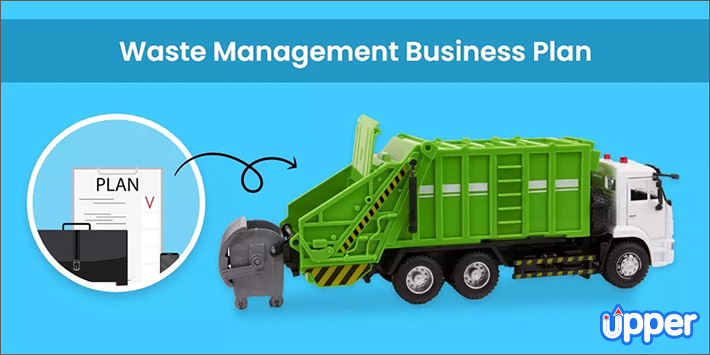
- Details on the services to be provided, the target market, the competitors, and financial projections should all be included in a waste management business plan.
- Starting a waste management business requires a number of key activities, including conducting market research and creating a marketing plan.
- Research your target market and competition thoroughly to analyze the industry so that you can understand how to capture the market.
- A waste management business can succeed by building a solid workforce and having a well-defined operating strategy.
It is no wonder that many individuals want to enter the waste management industry worth nearly $890 billion as it is pretty ripe for the taking. Though before getting started on your business journey, you may need a proper business plan.
Just one look at the business plan for a waste management company will make the head spin for any average person. Though making such a waste management business plan is essential if you are looking to start a business in the industry.
Worry not, we will look at how you can make a business plan for your own waste management business with ease. While these business plans look confusing at first, learning how to make them is as simple as understanding what the headings mean.
Forget Spaghetti Routes, Optimize Routes for Your Entire Team with Upper
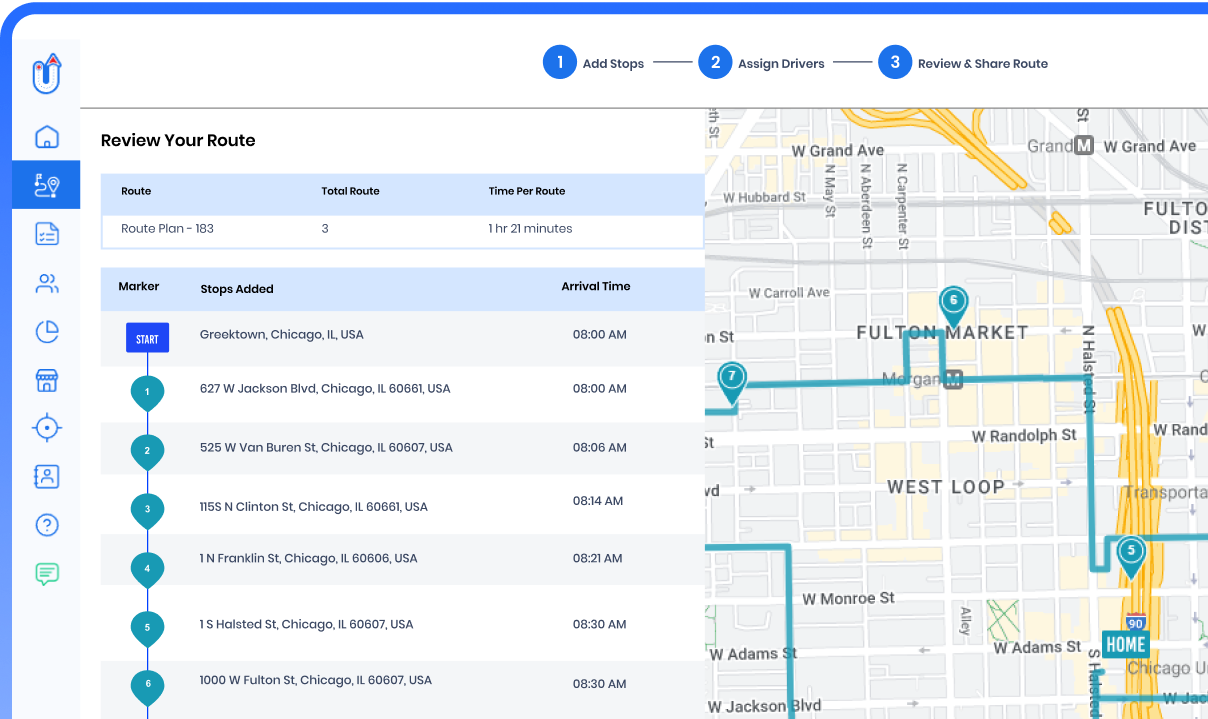
Table of Content
- Give an Industry Overview
- Create an Executive Summary
- Define Your Mission Statement and Values
- Research the Market for Your Market Analysis Section
- Evaluate the Services and Products You Will Offer
- Define Your Operational Plans
- Specify the Projected Finances for Your Business
- Introduce Your Team With Their Designations
- Showcase Your Marketing Strategy
- Perform a SWOT Assessment
Free Waste Management Business Plan Template
Why is a business plan necessary, 1. give an industry overview .
Before starting your business plan it is a good idea to introduce the reader to the subject using an Industry overview. With an industry overview, your goal is to provide a detailed introduction to the waste management industry and how it functions.
You must not only provide the definition of your industry but also provide data that can refine the reader’s understanding of the industry. Your industry overview must provide the following data:
Goal and objectives
This signifies what you aim to do in your waste disposal businesses and clarifies what your business needs to achieve the set goals. It gives the reader greater assurance of your vision and makes them feel more confident about your products and services.
Key competitors and their market share
Let’s say that you own an organic waste management business, in this case, you will have to provide details on the competitors in the market. This means you will have to show the other organic waste management companies and their effects on the market.
Industry size and growth projections
To the potential that your business could hold for the investors, it is a good idea to include information about the industry size in the introduction. It also validates your goals and targets to the reader because of the contextualization.
Industry definition
You must also define what your business industry does to set the ground for differentiation. When you let the reader know more about the industry and its standards, it can allow you to make your products and services stand out.
Current and future industry trends
Showing what the current trends in the waste management industry are, lets you showcase the ways in which your company can capture the market. It helps readers make connections between your company and the current trends in the industry.
Overview Example
Our main goal is to provide safe and effective waste disposal services to clients, achieve sustainability, and reduce waste going to landfills.
The key players in this industry are Waste Management, Inc., Republic Services, and Veolia. The industry generates $80 billion annually and is projected to grow by 2.3% annually over the next five years.
So, we have increased focus on sustainability, technological advancements in waste management equipment, and the use of data analytics.
2. Create an Executive Summary
The executive summary basically delivers a brief understanding of your business structure and operations. It contains a small explanation of the sections that lie ahead. The main advantage of the executive summary is that it allows you to quickly read key data without having to browse.
It is typically written after the completion of other sections to easily brief the contents in the most effective manner. This is so that you can hook the readers with the key bits of information as fast as possible without making them search around for it.
Though creating this executive summary first might allow you to better structure the other sections in your business plan. The sections after the executive summary cover the information in the summary in greater depth for better understanding.
An Example of Executive Summary
Our waste management company, [Your Company Name], provides environmental-friendly waste solutions for businesses and households.
We are committed to reducing the environmental impact of waste and ensuring that our clients have access to efficient and cost-effective waste management services.
Our services include waste collection, sorting, recycling, and disposal. We have a strong focus on community outreach and education, promoting waste reduction and recycling initiatives.
We believe that our innovative approach and dedication to environmental responsibility will position us as a leader in the waste management industry.
3. Define Your Mission Statement and Values
This step is crucial because your mission statement acts like a pole star – it always keeps you going in the right direction by helping you figure out:
- What do you want your business to achieve?
- What’s your ultimate organizational goal?
Either you want to help reduce the amount of waste going to landfills or you are passionate about recycling and want to make it easier for people to do so. In any case, make sure it is clear and concise.
In addition to that, your values are significant things to keep in mind while moving toward your goal. For instance, it can be excellent customer service, environmental sustainability, or business goals.
4. Research the Market for Your Market Analysis Section
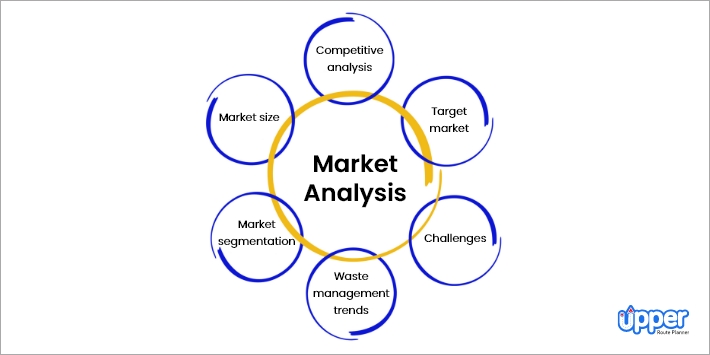
In the market analysis section, you must specify your target market and the related information about it. You must denote your target audience and how the competition has been gaining control of the market. Writing about market trends is also important for the following reasons.
- Allows you to target the potential customers better
- Shows how your services can penetrate the market
- Gives the reader more insights into your business
- Allows you to estimate costs to capture the market
Mentioning who the key players are and how they capture the market in the industry is also crucial for this section as it allows for quick business plan evaluation. With the competitor’s information, the reader can quickly compare how your business plan scales up.
Conducting market research is perhaps the best thing you can do for your own waste management company as it can prepare you for upcoming waste management challenges . You can also find additional ways to generate revenue when you have accurate market-related data.
5. Evaluate the Services and Products You Will Offer
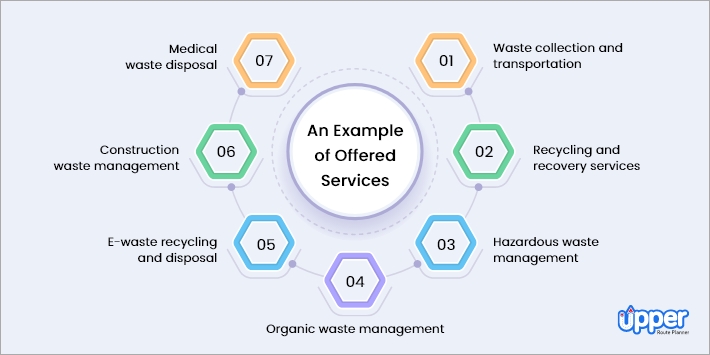
To justify your confidence in capturing the market, you must specify the products and services that you will offer to the target audience. Add details about what your products and services are in detail and how they will evolve over time to satisfy the demands of customers.
This step should be quite simple if you have conducted a proper market analysis and understood what products and services are sought after by customers. This allows the reader to understand your plans and motivations for the business as they are able to judge your offerings.
Make sure that you also stay within a given field and don’t end up offering too many services that can dilute your company’s value. Your services have to be as specialized as possible so that you can differentiate yourself in the market.
6. Define Your Operational Plans
Now that you have listed down the products/services you will provide, the next important thing to figure out is how you are going to operate your day-to-day activities.
This is important because higher efficiency in running your business means: –
- More money saved
- More time saved
- Better customer service
So, in your case, you must think of what your regular waste management operations consist of and how you will manage them for peak efficiency.
First things first, figure out each step you need to take right from acquiring a client to serving his needs in the best way possible.
Then, you need to ensure that your flow of activities provides you with maximum productivity throughout the day. Ask yourself: –
- Are there any steps I need to add or remove from my flow?
- Is there any software that I can use to make the tasks easier for my waste management business?
Regarding that, it turns out that there is ideal route planning software for waste management businesses that will ease your daily business operation—Upper. It saves you time and slashes your gas bill by providing you with the most optimum route for your drivers. Sounds exciting?
Get Efficient Routes for Waste Disposal on Upper
Help your drivers get optimized routes in as little as a few minutes to save up to 40% on your gas bill. Perform your waste collection and disposal process hassle-free with Upper.
7. Specify the Projected Finances for Your Business
Projected finances are vital if you are looking to secure investment as it allows investors to understand how their funds will be used precisely. Your projected finances should cover all your expenses, revenue, and profits.
It should provide previous financial statements that show your assets, costs, current revenue, and projected earnings over several years. If your business mainly deals with products such as dumpster rentals for construction sites, then things like the MOQ formula could be useful.
Once you have calculated all the given finances, you can review them again to see if you have missed any costs or income. Accounting for even the smallest transitions shows that you own a business that is highly responsible when it comes to financial responsibility.
Tips to Include Projected Finances
- Make your projections more realistic
- Projected finances should go over all your expenses, revenue, and profits
- Make sure you have factored in all the possibilities to get accurate numbers.
- Break down your revenue projections into different sources.
8. Introduce Your Team With Their Designations
The leadership team in your company should have the names and designations of all the key employees that manage operations. This includes everyone from the fleet manager to the lead human resources manager. This section will differ wildly with varying company sizes.
Along with the names and designations it should also mention the specializations and experiences of the employees. A well-experienced leadership team will show how you can surpass the best waste management companies in the market.
Remember that such sections are only supposed to highlight employees who have a higher level of responsibility and accountability regarding business operations. So refrain from adding all of your business’s employees.
9. Showcase Your Marketing Strategy
Writing about your marketing strategy to capture customers’ attention will go a long way toward building confidence in your company. Developing a good marketing strategy for promoting something like sustainable waste management can help you gain new customers.
You can always consult a good blog that talks about waste management marketing strategies to get a new perspective on the subject. Using tactics targeting a particular demographic or geographical area is considered the best way to market your business.
In this section, you must write about the tactics you will implement in your marketing strategy. You must also specify the methods of marketing that your company will use so that the reader can better judge when analyzing your marketing plan.
10. Perform a SWOT Assessment
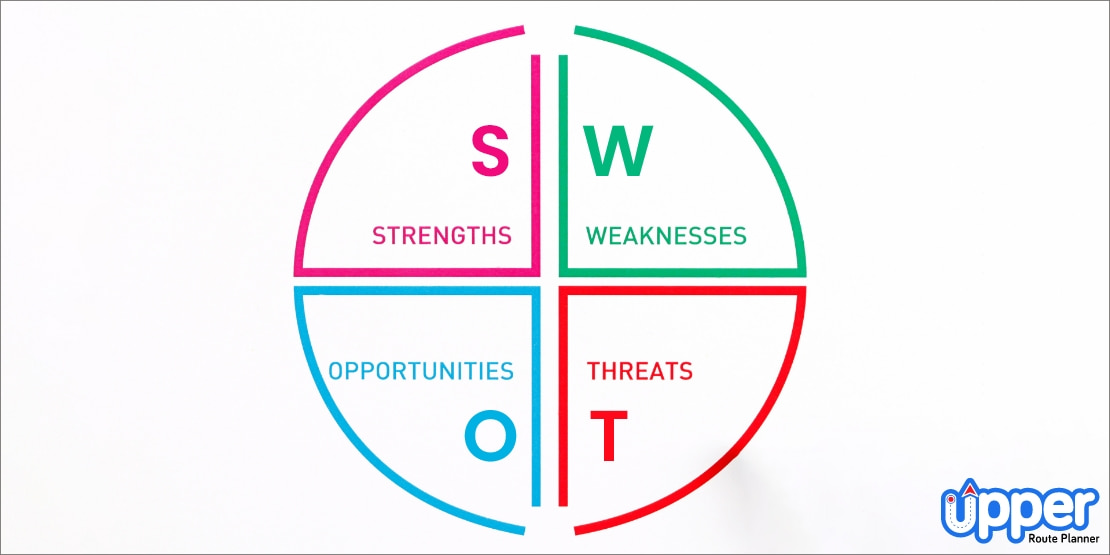
SWOT stands for Strengths (S), Weaknesses (W), Opportunities (O), and Threats (T). The purpose of the SWOT assessment is to go over and understand the strengths, weaknesses, opportunities, and threats that your business faces in its current state.
This is a vital part of the business plan, as without it, there is no clear and concise way to measure business potential. Because it highlights the entirety of your business’s condition, some readers choose to skip directly to this part.
The SWOT assessment is very beneficial as it allows you to consolidate your goals and refine your operations to meet said goals. It can help investors and employees understand your business needs in the most efficient manner possible.
Sometimes it is best not to bother with overly complicated processes to achieve the end result. This is why we have made for your company a preset template for any waste management business to use free of charge.
All you have to do is modify the document and the information to your liking, Viola! You have a flawless business plan ready for use. Click below to get the document for yourself.
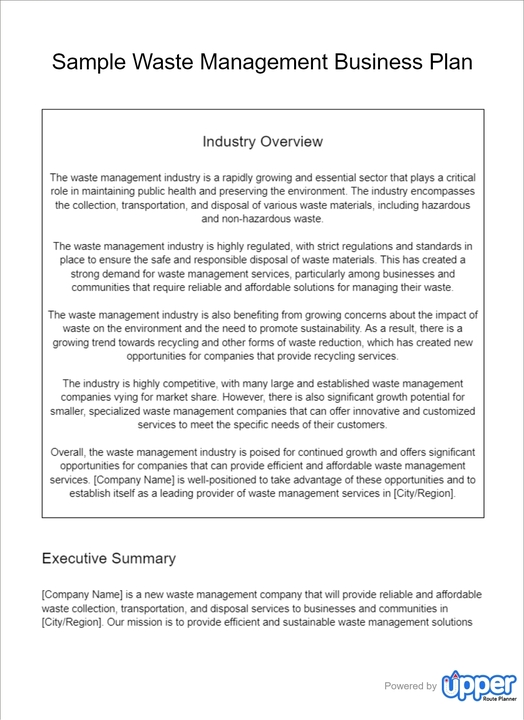
Free Editable Waste Management Business Plan Template
Access The Template
Seeing all the complex steps and details in a business plan, it is natural for new entrepreneurs to question its utility and function. Upon reading the top three reasons for making a business plan, you will have a much better idea of its usefulness for any given business.
1. Acquire investment
The biggest reason for businesses to create a business plan is to attract investors and make it easy for them to evaluate business value. Sending in a business plan is the easiest way to explain what your business does and why it is a great idea to invest in it.
Even a new business could potentially secure funding if it is able clearly to lay out its business plan in a way that is satisfactory to the investor. The less ambiguous and more direct your business plan, the better your chances of having investors on board.
2. Easier employee onboarding
When you hire high-priority talent, it can take weeks to make them understand the functions, vision, and challenges of your business. This is why it is better to go over the business plan as it gives a clear and concise insight into business operations.
With this newfound clarity, employees can quickly get to work to remedy the challenges faced by your business and give you the fastest results. They can consult the business plan at a whim and resolve any queries they may have by themselves.
3. Opportunity to refine business operations
When you have a waste management business plan right in front of you, you are able to inspect all current processes and see if they are working to meet your goals. The waste management industry is notorious for having inefficient processes that hamper your profits and revenue.
Having the business plan at hand will not only allow you to access these inefficiencies but also help you look for the best solutions for them. For example, a simple evaluation of your business operations will make you understand how a route planning software solution can perfect your waste collection process.
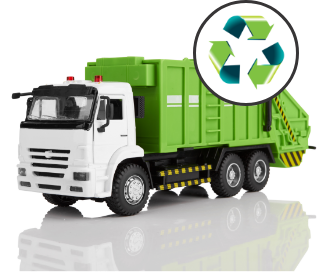
Your Waste Collection Trips Made Shorter
While there are no direct consequences to not making a business plan, you could surely miss out on potential growth opportunities. This is because you are usually unaware of the challenges facing your business and methods of combating those challenges.
The recycling industry is indeed profitable if you are able to attract clients and meet industry demands. The biggest way to gain profits in the waste management industry is through constant innovation. The majority of recycling centers know this and are able to stay profitable.
Unlike other businesses, a waste management business will mostly be able to profit from traditional marketing methods such as cards, flyers, and posters. These methods target local customers and make it easy for them to reach out to you for your services.
The benefits of creating a business plan for any waste management business is quite obvious and usually need no introduction. Though creating a business plan is the difficult part. It is surely time-consuming, but it is not difficult once you understand its objectives and structure.
Every business must have a business plan in this day and age if they want to progress in their given industry. This is all because of the biggest advantage of business plans, which is the ability to identify ways to perfect the business processes for peak efficiency.
Though there is one solution that can help you perfect your waste collection operations and that is using Upper route planner. The efficiency delivered by Upper’s key features is best experienced first-hand, which is why you must try our 7 days FREE TRIAL .

Rakesh Patel, author of two defining books on reverse geotagging, is a trusted authority in routing and logistics. His innovative solutions at Upper Route Planner have simplified logistics for businesses across the board. A thought leader in the field, Rakesh's insights are shaping the future of modern-day logistics, making him your go-to expert for all things route optimization. Read more.
Related Posts
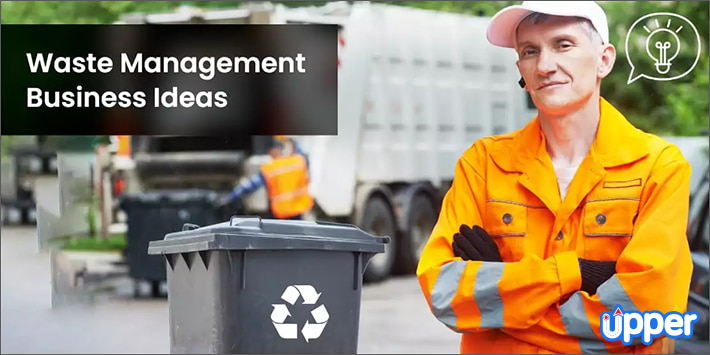
12 Waste Management Business Ideas to Maximize Your Profit in 2024
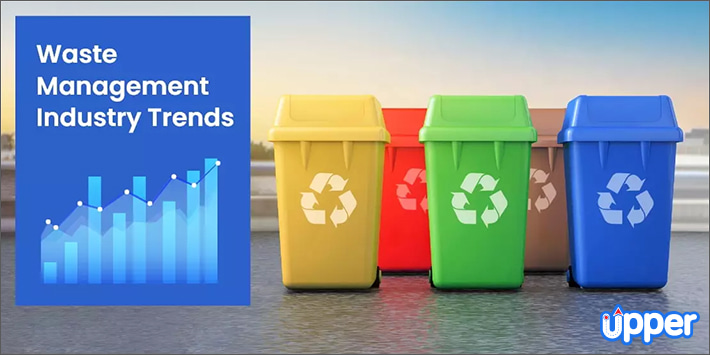
Comprehensive Analysis of Waste Management Industry Trends for 2024 and Beyond
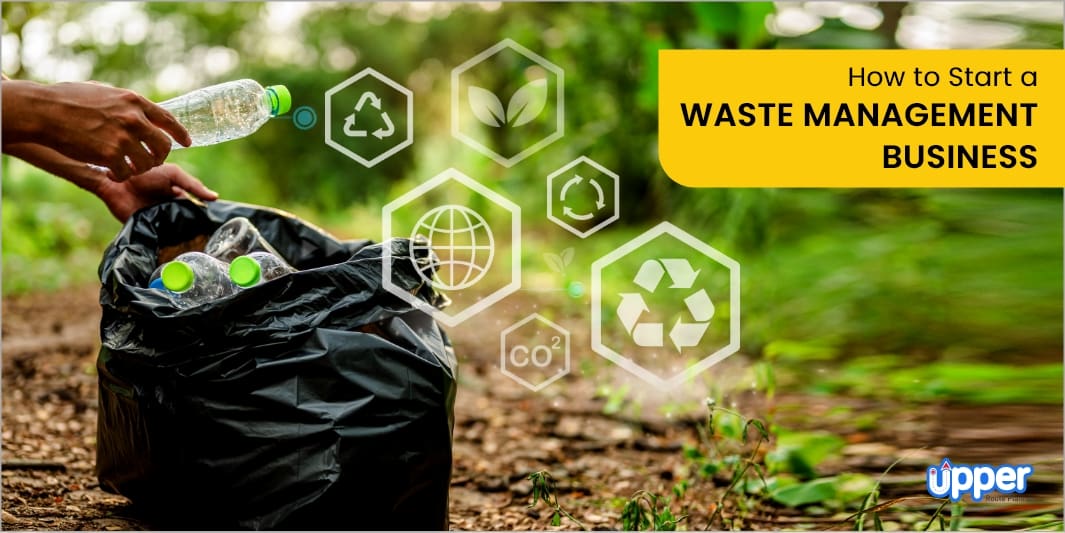
How to Start a Waste Management Business – An A-Z Guide for Beginners
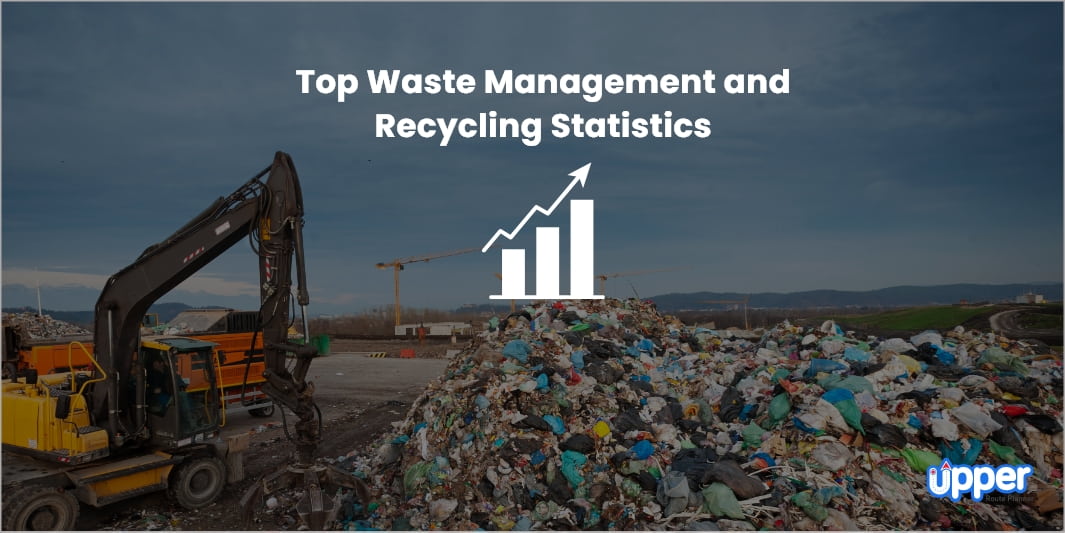
Waste Management Statistics: Uncovering the State of Waste Around the World
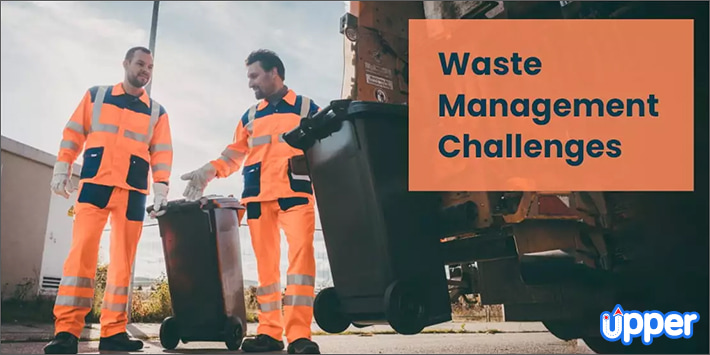
8 Solutions for Overcoming Common Waste Management Challenges
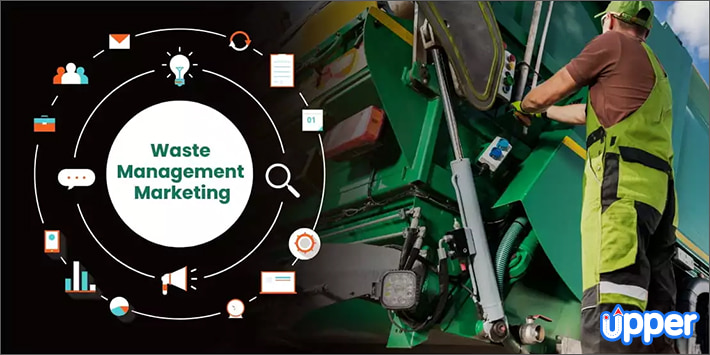
7 Waste Management Marketing Strategies: A Complete Guide to Growing Your Business in 2024
Sign Up with Upper Route Planner and automate your daily business process route planning, scheduling, and optimizing!
Grab a FREE Trial of Upper
- Plan routes with hundreds of stops in a minute
- Schedule routes months in advance
- Collect reliable proof of delivery
- Track drivers live for real-time updates
- Experience unparalleled customer support
Grab a FREE Trial of Upper TODAY!
- Schedule routes in advance for weeks
- Collect proof of delivery to maintain accountability
- Experience 24/7 customer support
- Smart reporting to get real-time insights

How To Write a Waste Management and Recycling Business Plan + Template
Creating a business plan is essential for any business, but it can be especially helpful for waste management and recycling businesses who want to improve their strategy and/or raise funding.
A well-crafted business plan not only outlines the vision for your company, but also documents a step-by-step roadmap of how you are going to accomplish it. In order to create an effective business plan, you must first understand the components that are essential to its success.
This article provides an overview of the key elements that every waste management and recycling business owner should include in their business plan.
Download the Ultimate Business Plan Template
What is a Waste Management and Recycling Business Plan?
A waste management and recycling business plan is a formal written document that describes your company’s business strategy and its feasibility. It documents the reasons you will be successful, your areas of competitive advantage, and it includes information about your team members. Your business plan is a key document that will convince investors and lenders (if needed) that you are positioned to become a successful venture.
Why Write a Waste Management and Recycling Business Plan?
A waste management and recycling business plan is required for banks and investors. The document is a clear and concise guide of your business idea and the steps you will take to make it profitable.
Entrepreneurs can also use this as a roadmap when starting their new company or venture, especially if they are inexperienced in starting a business.
Writing an Effective Waste Management and Recycling Business Plan
The following are the key components of a successful waste management and recycling business plan:
Executive Summary
The executive summary of a waste management and recycling business plan is a one to two page overview of your entire business plan. It should summarize the main points, which will be presented in full in the rest of your business plan.
- Start with a one-line description of your waste management and recycling company
- Provide a short summary of the key points in each section of your business plan, which includes information about your company’s management team, industry analysis, competitive analysis, and financial forecast among others.
Company Description
This section should include a brief history of your company. Include a short description of how your company started, and provide a timeline of milestones your company has achieved.
If you are just starting your waste management and recycling business, you may not have a long company history. Instead, you can include information about your professional experience in this industry and how and why you conceived your new venture. If you have worked for a similar company before or have been involved in an entrepreneurial venture before starting your waste management and recycling firm, mention this.
You will also include information about your chosen waste management and recycling business model and how, if applicable, it is different from other companies in your industry.
Industry Analysis
The industry or market analysis is an important component of a waste management and recycling business plan. Conduct thorough market research to determine industry trends and document the size of your market.
Questions to answer include:
- What part of the waste management and recycling industry are you targeting?
- How big is the market?
- What trends are happening in the industry right now (and if applicable, how do these trends support the success of your company)?
You should also include sources for the information you provide, such as published research reports and expert opinions.
Customer Analysis
This section should include a list of your target audience(s) with demographic and psychographic profiles (e.g., age, gender, income level, profession, job titles, interests). You will need to provide a profile of each customer segment separately, including their needs and wants.
For example, a waste management and recycling business’ customers may include:
- Businesses that need to dispose of or recycle waste
- Individuals who need to dispose of or recycle waste
- Government agencies that regulate waste management and recycling businesses
You can include information about how your customers make the decision to buy from you as well as what keeps them buying from you.
Develop a strategy for targeting those customers who are most likely to buy from you, as well as those that might be influenced to buy your products or waste management and recycling services with the right marketing.
Competitive Analysis
The competitive analysis helps you determine how your product or service will be different from competitors, and what your unique selling proposition (USP) might be that will set you apart in this industry.
For each competitor, list their strengths and weaknesses. Next, determine your areas of competitive differentiation and/or advantage; that is, in what ways are you different from and ideally better than your competitors.
Below are sample competitive advantages your waste management and recycling business may have:
- Specialized experience in the waste management and recycling industry
- Strong relationships with customers and suppliers
- Cutting-edge technology and equipment
- Well-trained employees
- Proven business model
Marketing Plan
This part of the business plan is where you determine and document your marketing plan. . Your plan should be clearly laid out, including the following 4 Ps.
- Product/Service : Detail your product/service offerings here. Document their features and benefits.
- Price : Document your pricing strategy here. In addition to stating the prices for your products/services, mention how your pricing compares to your competition.
- Place : Where will your customers find you? What channels of distribution (e.g., partnerships) will you use to reach them if applicable?
- Promotion : How will you reach your target customers? For example, you may use social media, write blog posts, create an email marketing campaign, use pay-per-click advertising, or launch a direct mail campaign. Or you may promote your waste management and recycling business via word-of-mouth.
Operations Plan
This part of your waste management and recycling business plan should include the following information:
- How will you deliver your product/service to customers? For example, will you do it in person or over the phone only?
- What infrastructure, equipment, and resources are needed to operate successfully? How can you meet those requirements within budget constraints?
The operations plan is where you also need to include your company’s business policies. You will want to establish policies related to everything from customer service to pricing, to the overall brand image you are trying to present.
Finally, and most importantly, in your Operations Plan, you will lay out the milestones your company hopes to achieve within the next five years. Create a chart that shows the key milestone(s) you hope to achieve each quarter for the next four quarters, and then each year for the following four years. Examples of milestones for a waste management and recycling business include reaching $X in sales, adding new products or services, building a new facility, or hiring additional staff.
Management Team
List your team members here including their names and titles, as well as their expertise and experience relevant to your specific waste management and recycling industry. Include brief biography sketches for each team member.
Particularly if you are seeking funding, the goal of this section is to convince investors and lenders that your team has the expertise and experience to execute on your plan. If you are missing key team members, document the roles and responsibilities you plan to hire for in the future.
Financial Plan
Here you will include a summary of your complete and detailed financial plan (your full financial projections go in the Appendix).
This includes the following three financial statements:
Income Statement
Your income statement should include:
- Revenue : how much revenue you generate.
- Cost of Goods Sold : These are your direct costs associated with generating revenue. This includes labor costs, as well as the cost of any equipment and supplies used to deliver the product/service offering.
- Net Income (or loss) : Once expenses and revenue are totaled and deducted from each other, this is the net income or loss.
Sample Income Statement for a Startup Waste Management and Recycling Business
Balance sheet.
Include a balance sheet that shows your assets, liabilities, and equity. Your balance sheet should include:
- Assets : All of the things you own (including cash).
- Liabilities : This is what you owe against your company’s assets, such as accounts payable or loans.
- Equity : The worth of your business after all liabilities and assets are totaled and deducted from each other.
Sample Balance Sheet for a Startup Waste Management and Recycling Business
Cash flow statement.
Include a cash flow statement showing how much cash comes in, how much cash goes out and a net cash flow for each year. The cash flow statement should include:
- Cash Flow From Operations
- Cash Flow From Investments
- Cash Flow From Financing
Below is a sample of a projected cash flow statement for a startup waste management and recycling business.
Sample Cash Flow Statement for a Startup Waste Management and Recycling Business
You will also want to include an appendix section which will include:
- Your complete financial projections
- A complete list of your company’s business policies and procedures related to the rest of the business plan (marketing, operations, etc.)
- Any other documentation which supports what you included in the body of your business plan.
Writing a good business plan gives you the advantage of being fully prepared to launch and/or grow your waste management and recycling company. It not only outlines your business vision but also provides a step-by-step process of how you are going to accomplish it.
A well-crafted business plan is an essential tool for any waste management and recycling company. Now that you understand the importance of a business plan for your waste management and recycling company, as well as the key components to include, you are ready to get started.
Finish Your Business Plan in 1 Day!
Wish there was a faster, easier way to finish your business plan?
With our Ultimate Business Plan Template you can finish your plan in just 8 hours or less!
- Paragraph Generator
- Cover Letter
- Authorization Letter
- Application Letter
- Letter of Intent
- Letter of Recommendation
- Business Plan
- Incident Report
- Reference Letter
- Minutes of Meeting
- Letter of Resignation
- Excuse Letter
- Research Proposal
- Job Application
- Acknowledgement
- Employment Letter
- Promissory Note
- Business Proposal
- Statement of Purpose
- Offer Letter
- Deed of Sale
- Letter of Interest
- Power of Attorney
- Solicitation Letter
8+ SAMPLE Waste Management Business Plan in PDF | MS Word

Waste Management Business Plan | MS Word
8+ sample waste management business plan, what is a waste management business plan, types of waste management disposal, benefits of waste management, tips when making a waste management business plan, why is a waste management business plan vital, is the waste management industry lucrative, is it possible to start my own waste management company.
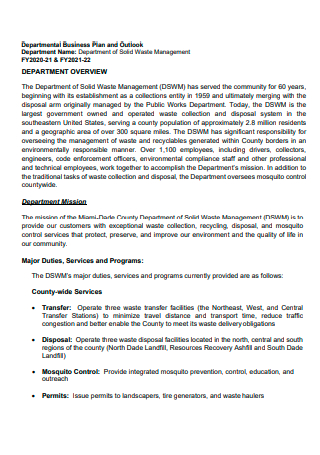
Department of Solid Waste Management Business Plan
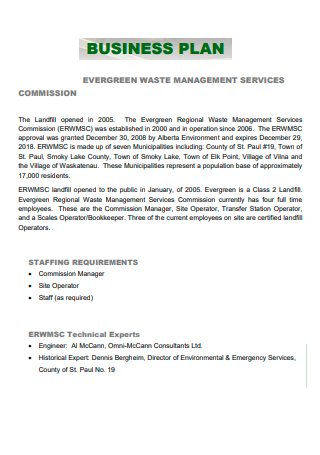
Waste Management Services Commission Business Plan
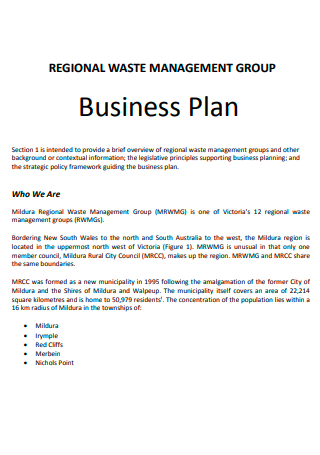
Regional Waste Management Group Business Plan
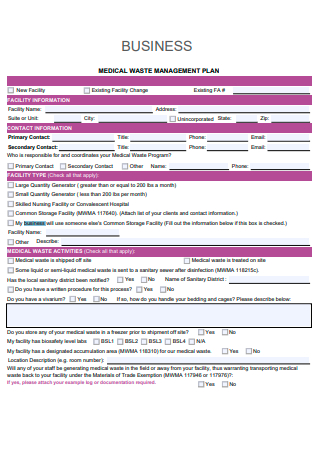
Meical Waste Management Business Plan
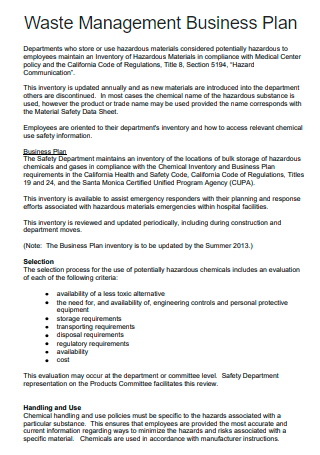
Waste Management Business Plan Example
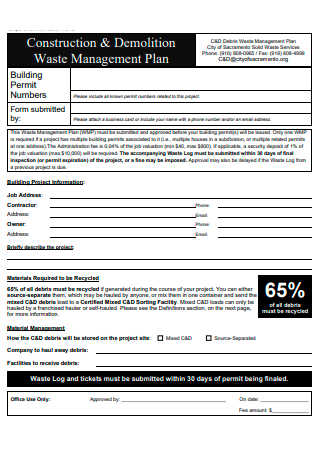
Printable Waste Management Business Plan
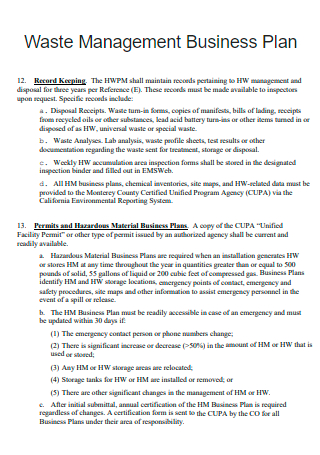
Simple Waste Management Business Plan
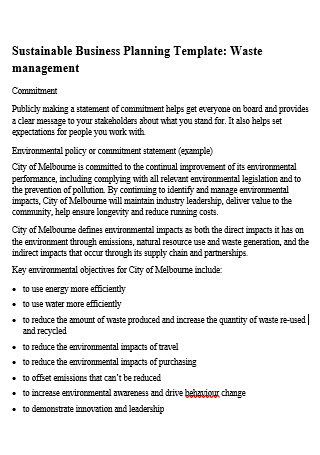
Waste Management Sustainable Business Planning
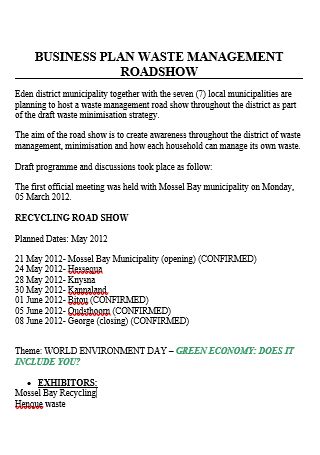
Waste Management Business Plan in DOC
1. set objectives and goals, 2. check for permits, 3. select a type of waste management disposal, 4. create a waste management system, 5. create a waste management business plan, share this post on your network, you may also like these articles, agriculture business plan.
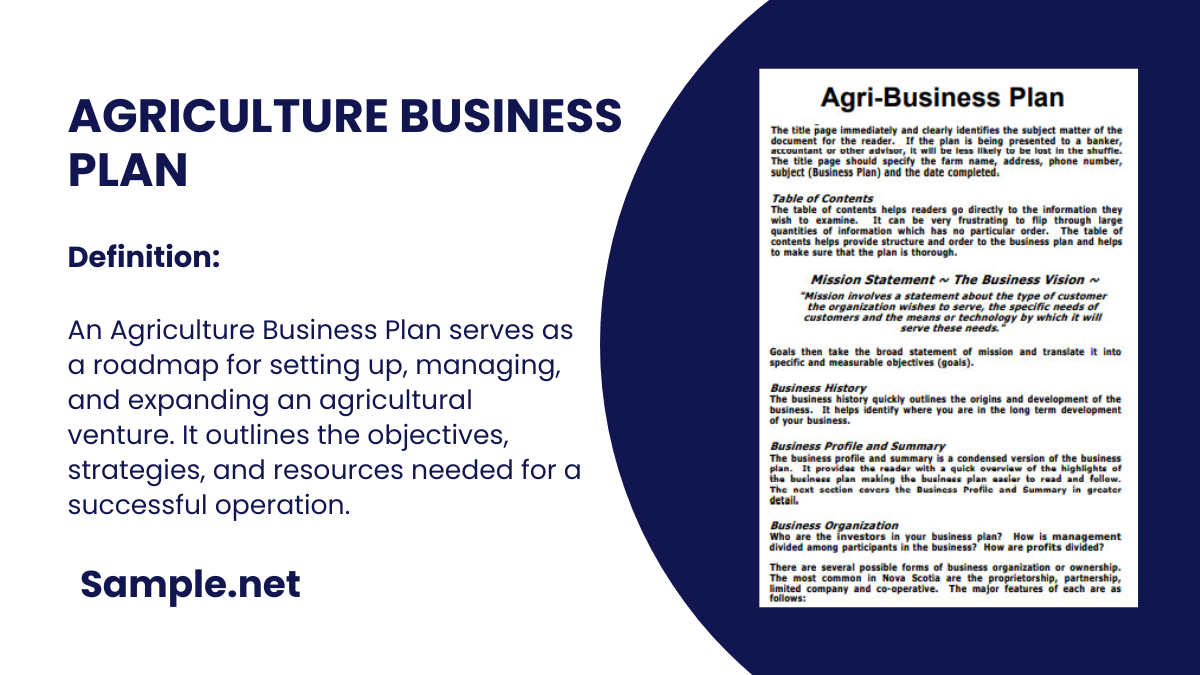
An Agriculture Business Plan serves as a roadmap for setting up, managing, and expanding an agricultural venture. It outlines the objectives, strategies, and resources needed for a successful operation.…
Workout Plan

A workout plan is a structured schedule designed to guide your exercise routines, helping you achieve specific fitness goals such as weight loss, muscle gain, or improved endurance. It…
browse by categories
- Questionnaire
- Description
- Reconciliation
- Certificate
- Spreadsheet
Information
- privacy policy
- Terms & Conditions
We earn commissions if you shop through the links below. Read more
Waste Management Business
Back to All Business Ideas
How to Start a Waste Management Business in 13 Steps
Written by: Natalie Fell
Natalie is a business writer with experience in operations, HR, and training & development within the software, healthcare, and financial services sectors.
Edited by: David Lepeska
David has been writing and learning about business, finance and globalization for a quarter-century, starting with a small New York consulting firm in the 1990s.
Published on June 20, 2022
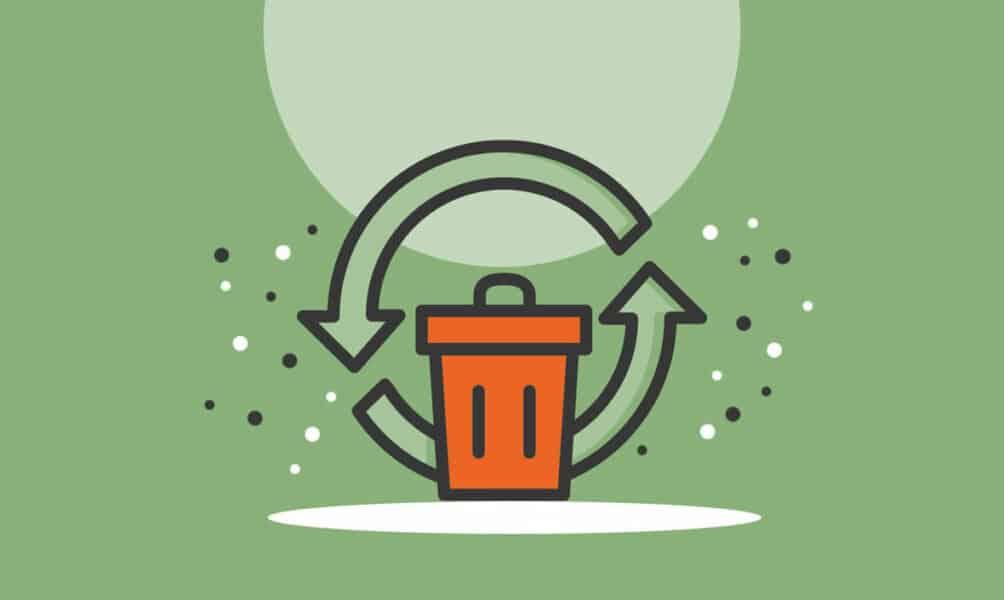
Investment range
$30,800 - $72,100
Revenue potential
$180,000 - $600,000 p.a.
Time to build
Profit potential
$81,000 - $150,000 p.a.
Industry trend
Vital aspects to consider when kicking off your waste management enterprise:
- Waste management permits — Secure the necessary permits and licenses for handling, transporting, and disposing of waste, including permits for hazardous waste if applicable.
- Environmental compliance — Ensure compliance with local, state, and federal environmental regulations related to waste management and disposal.
- Choose a location — Select a location with adequate space for storing waste collection vehicles, equipment, and waste processing. Ensure it has easy access to major transportation routes and complies with zoning laws.
- Waste collection vehicles — Invest in high-quality waste collection vehicles suitable for your services, such as garbage trucks, recycling trucks, and roll-off trucks.
- Waste processing equipment — Equip your facility with necessary waste processing equipment , such as compactors, balers, and shredders.
- Register your business — A limited liability company (LLC) is the best legal structure for new businesses because it is fast and simple. Form your business immediately using Zen B usiness LLC formation service or hire one of the best LLC services on the market.
- Legal business aspects — Register for taxes, open a business bank account, and get an EIN .
- Hire staff — Hire experienced and reliable staff for various roles, including drivers, waste handlers, recycling specialists, and administrative support.
- Safety — Implement comprehensive safety protocols for handling and transporting waste, including regular training for employees, proper use of personal protective equipment (PPE) , adherence to OSHA regulations , and routine safety inspections to prevent accidents and ensure a safe working environment.
- Learn from real entrepreneurs who run a waste management business:
- How The Junkluggers of Greater Seattle Is Transforming Junk Removal
- How DoodyCalls Became a Pet Waste Removal Leader
Interactive Checklist at your fingertips—begin your waste management business today!
You May Also Wonder:
Are waste management businesses profitable?
Yes, waste management companies can be very profitable. The key to success is in building a large base of loyal customers and charging competitive rates for your services.
How do I market my waste management company?
To market a waste management company, identify your target market and create a marketing strategy that focuses on their needs and preferences. Utilize various marketing channels such as social media, email marketing, print advertising, and local events to promote your services.
What are the different types of waste management?
The different types of waste management include collection, transportation, processing, and disposal of different types of waste, such as municipal solid waste, hazardous waste, biomedical waste, electronic waste, and construction and demolition waste.
What is the most expensive waste to dispose of?
The most expensive waste to dispose of is hazardous waste, such as chemicals, batteries, and medical waste. Hazardous waste requires special handling, transportation, and disposal methods to minimize the risk of environmental contamination and health hazards.
What is the most profitable item to recycle?
The most profitable item to recycle depends on the current market demand and pricing for specific materials. Generally, high-value materials such as copper, aluminum, and steel can be profitable to recycle. However, it is essential to consider the environmental impact and sustainability of recycling these materials and ensure that they are recycled in a responsible and ethical manner.
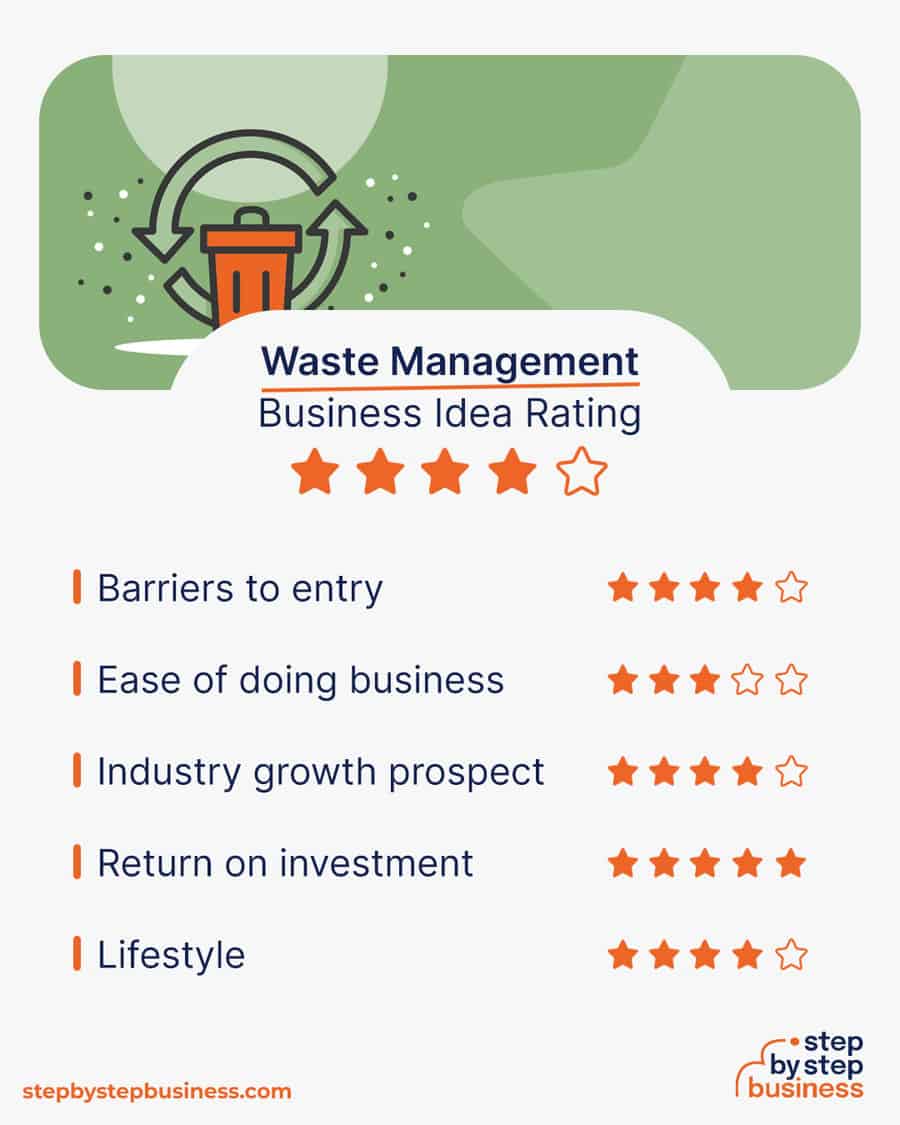
Step 1: Decide if the Business Is Right for You
Pros and cons.
Before starting a waste management business, it’s important to consider the pros and cons.
- Provide Value – Waste removal is a necessary service
- Good Money – Charge up to $300 per month
- Growing Industry – Waste management is growing fast
- High Startup Costs – Waste collection vehicles are expensive
- Dirty Job – Garbage collection isn’t glamorous
Waste management industry trends
Industry size and growth.
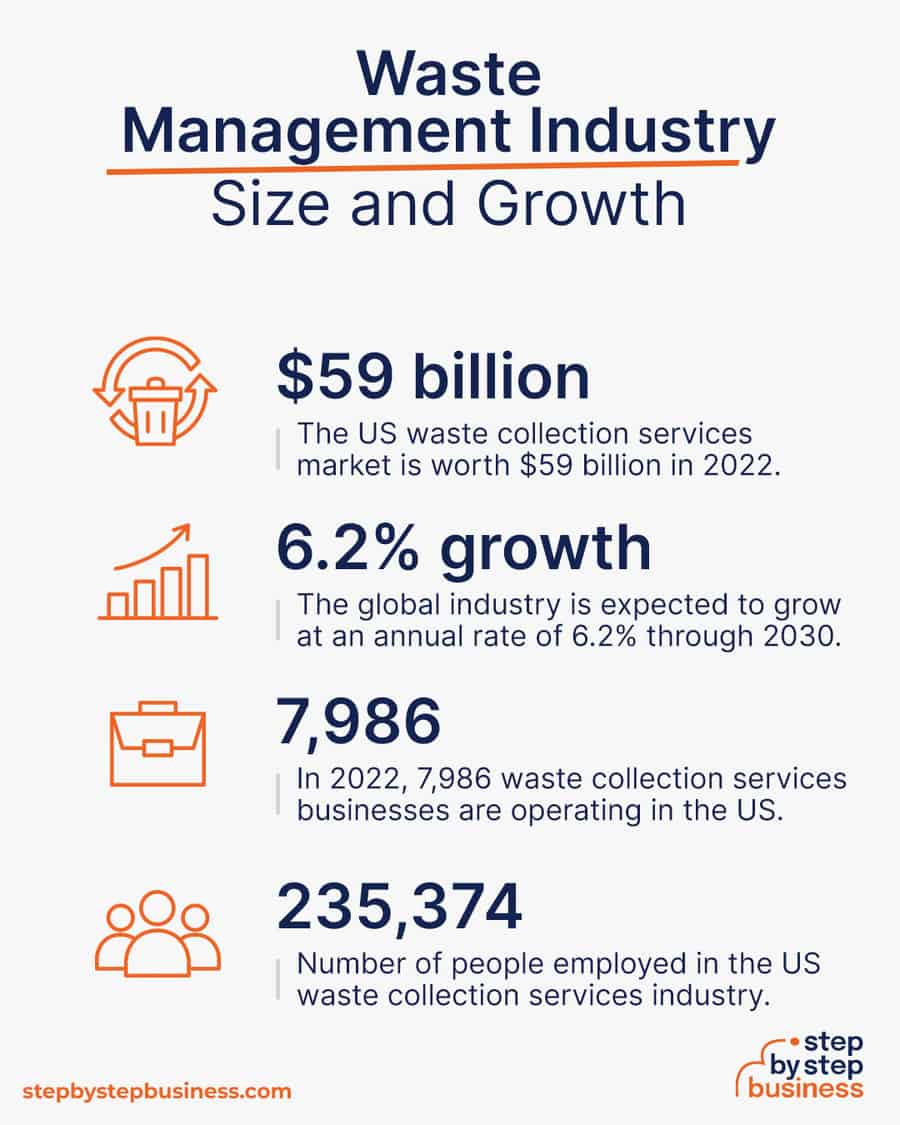
- Industry size and past growth – The US waste collection services market is worth $59 billion in 2022. It has grown around one percent annually since 2017.(( https://www.ibisworld.com/industry-statistics/market-size/waste-collection-services-united-states/ ))
- Growth forecast – The global waste management industry is expected to grow at an annual rate of 6.2% through 2030.(( https://www.grandviewresearch.com/industry-analysis/global-waste-management-market ))
- Number of businesses – In 2022, 7,986 waste collection services businesses are operating in the US.(( https://www.ibisworld.com/industry-statistics/number-of-businesses/waste-collection-services-united-states/ ))
- Number of people employed – In 2022, US waste collection services companies employ 235,374 people.(( https://www.ibisworld.com/industry-statistics/employment/waste-collection-services-united-states/ ))
Trends and challenges
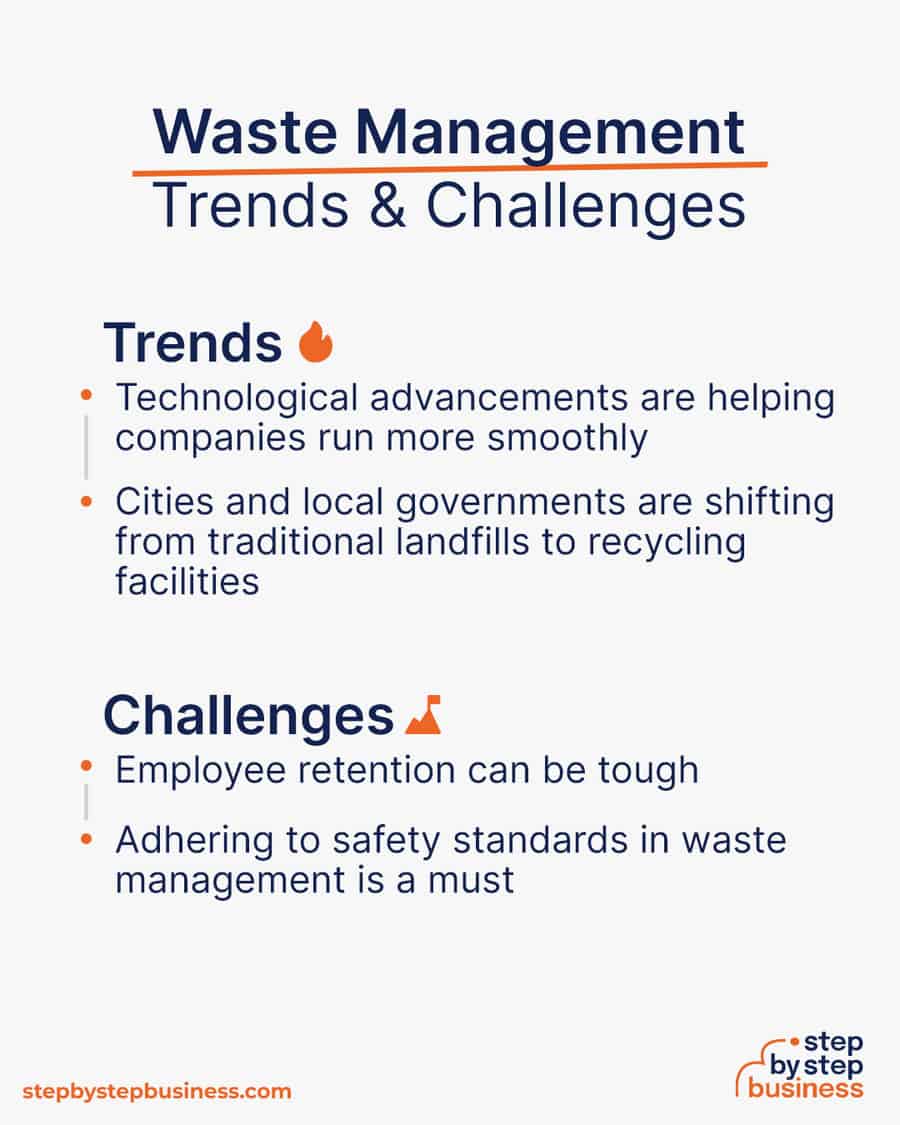
Trends within the waste management industry include:
- Technological advancements are helping waste management companies run more smoothly. Examples include the use of robots for garbage sorting and cutting-edge software to optimize collection routes.
- Cities and local governments are moving more towards “zero waste” policies and shifting waste management from traditional landfills to recycling facilities.
Challenges within the waste management industry include:
- Employee retention can be tough for waste management businesses, as waste collector jobs have high turnover.
- Adhering to safety standards in waste management is a must, but can be challenging. Successful companies need to spend a significant amount of time training employees to properly operate equipment and handle hazardous materials.
What kind of people work in waste management?
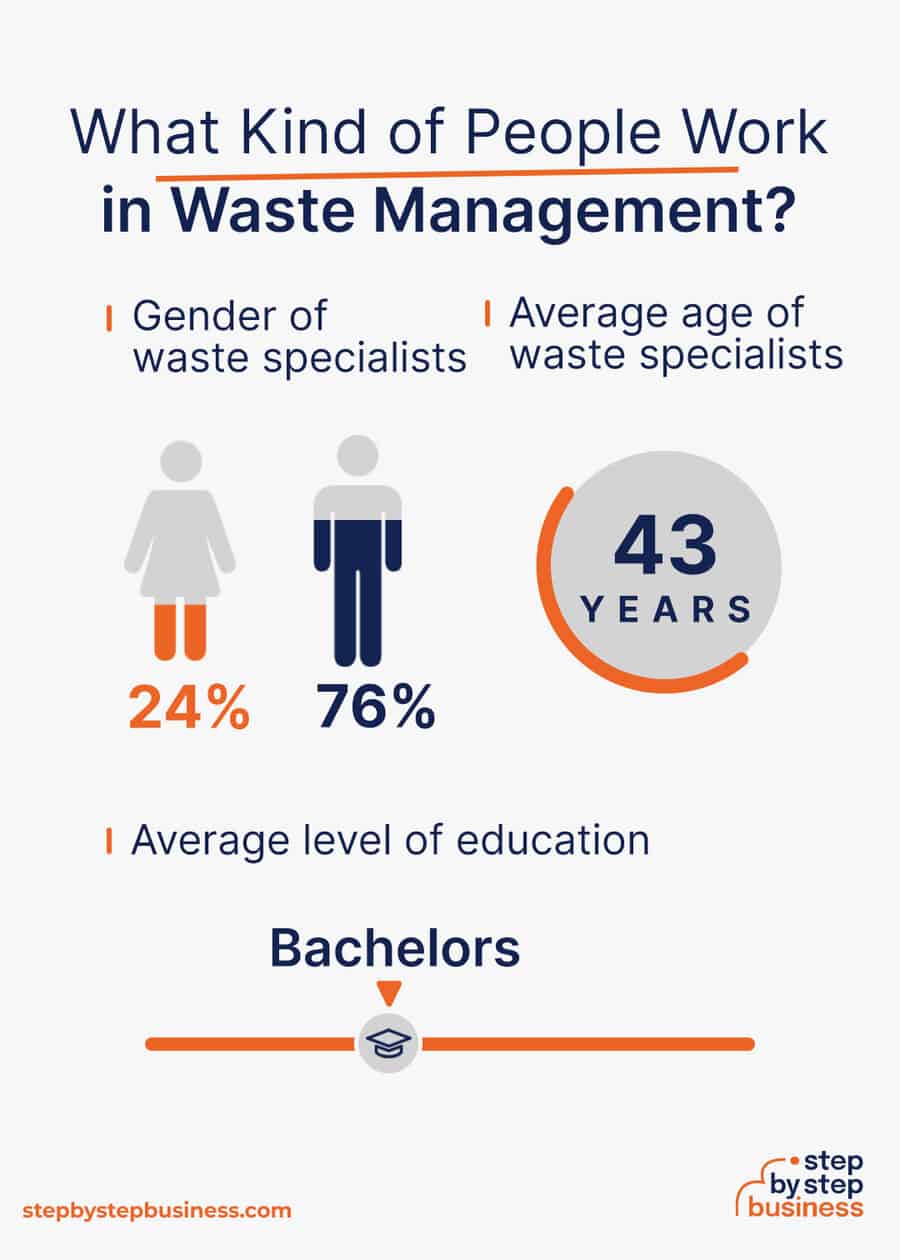
- Gender – 24% of waste management specialists are female, while 76% are male.(( https://www.zippia.com/waste-management-specialist-jobs/demographics/ ))
- Average level of education – The average waste management specialist has obtained a bachelor’s degree.
- Average age – The average waste management specialist in the US is 43 years old.
How much does it cost to start a waste management business?
Startup costs for a waste management business range from $35,800 to $72,600. Costs include down payments on collection vehicles, dumpsters and containers, website, and marketing expenses.
You’ll need a handful of items to successfully launch your waste management business, including:
- Collection vehicles
- Waste containers and dumpsters
- Logo and branding
How much can you earn from a waste management business?
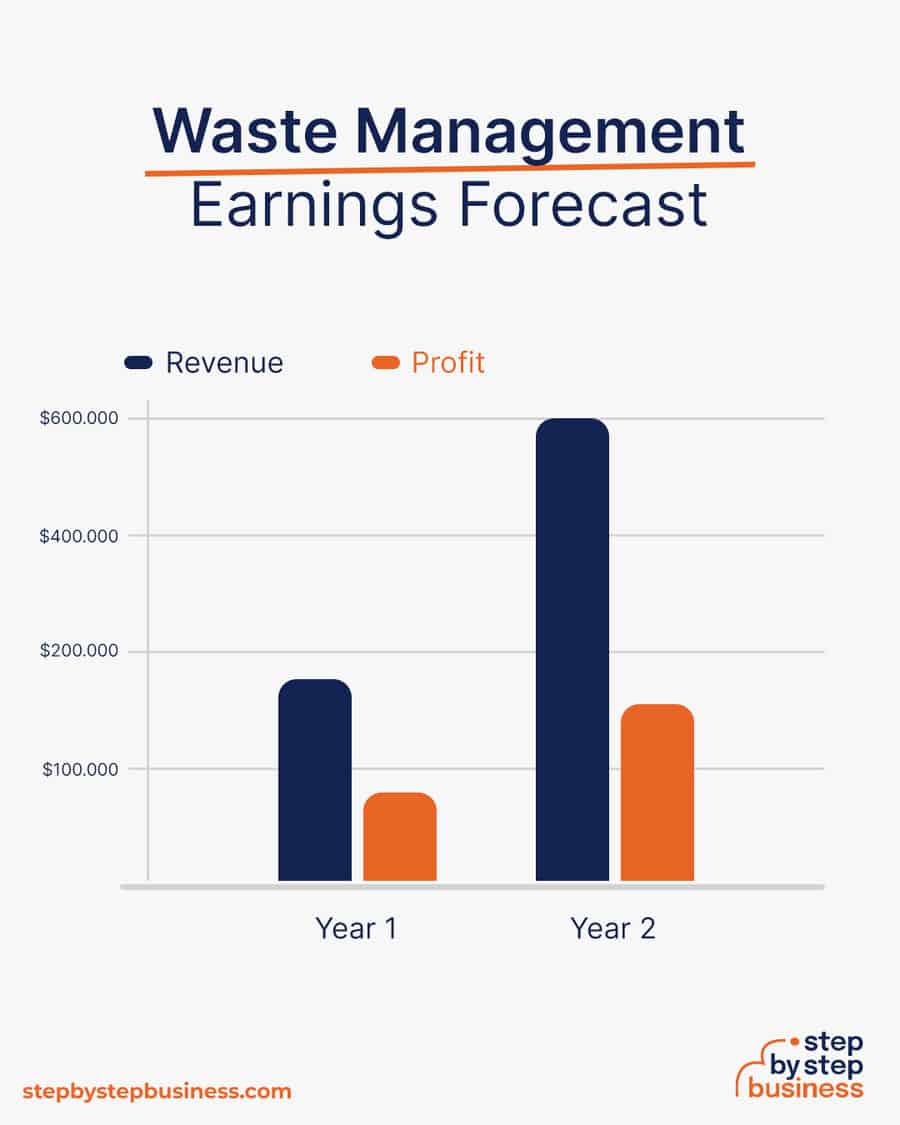
The average cost of residential waste management is $30 per month. Commercial customers typically pay an average of $200 per month. Assuming you’re using existing landfills to dispose of your waste, your profit margin should be around 45%.
In your first year or two, you could provide waste management services to 75 commercial customers at a monthly rate of $200, bringing in $180,000 in annual revenue. This would mean $81,000 in profit, assuming that 45% margin.
As your business grows, you could increase your customer base to 200 and raise your monthly rates to $250. At this stage, you’d purchase more equipment and hire additional staff, reducing your profit margin to around 25%. With annual revenue of $600,000, you’d make a handsome profit of $150,000.
What barriers to entry are there?
There are a few barriers to entry when it comes to starting a waste management business. Your biggest challenges will be:
- Competition with established waste management firms
- Building a steady customer base
Related Business Ideas
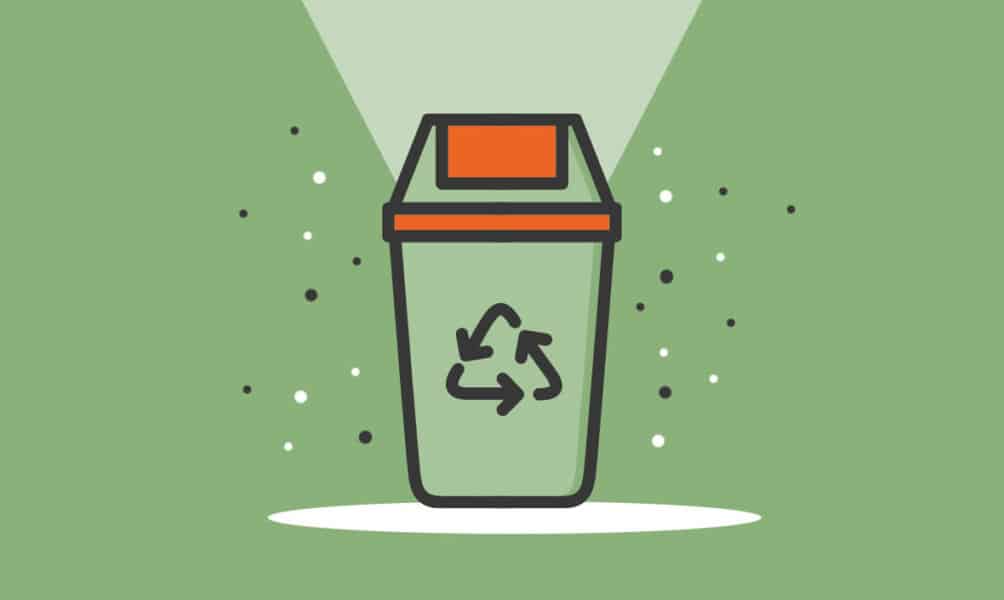
Eco-Friendly Enterprise: How to Start a Recycling Business
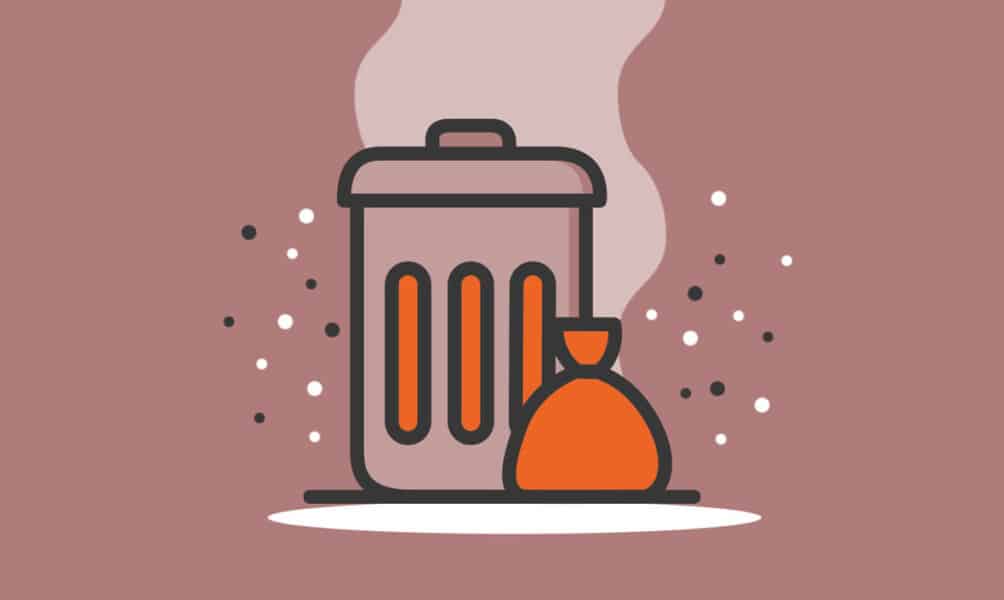
Discover the Secrets to a Successful Junk Removal Startup

How to Start a Commercial Cleaning Business from Scratch
Step 2: hone your idea.
Now that you know what’s involved in starting a waste management business, it’s a good idea to hone your concept in preparation to enter a competitive market.
Market research will give you the upper hand, even if you’re already positive that you have a perfect product or service. Conducting market research is important, because it can help you understand your customers better, who your competitors are, and your business landscape.
Why? Identify an opportunity
Research waste management businesses in your area to examine their services, price points, and customer reviews. You’re looking for a market gap to fill. For instance, maybe the local market is missing a waste management company for construction businesses.
You might consider targeting a niche market by specializing in a certain aspect of your industry, such as medical waste or food waste.
This could jumpstart your word-of-mouth marketing and attract clients right away.
What? Determine your services
As a waste management company, you’ll be responsible for picking up garbage and waste from homes or businesses and taking them to a local landfill for processing. Over time, you may choose to acquire your own waste treatment facility or landfill. Some waste management companies also have recycling capabilities.
How much should you charge for waste management services?
Most waste management companies charge customers a monthly rate for services. When determining your rates, factor in the cost of reusable waste containers or dumpsters and any fees associated with the use of local landfills.
Monthly costs for residential customers range from $25 to $40. For commercial customers, rates range from $150 to $300. If you handle specialized waste, like chemical or medical, your rates may be much higher. After factoring in operating costs, your profit margin should be around 45%
Once you know your costs, you can use this Step By Step profit margin calculator to determine your mark-up and final price points. Remember, the prices you use at launch should be subject to change if warranted by the market.
Who? Identify your target market
Your potential customers will be households or businesses looking for reliable waste disposal solutions. Attract residential customers by focusing marketing efforts on popular social media platforms like Instagram, Facebook, and TikTok. Network with commercial customers through professional platforms like LinkedIn.
Where? Choose your business premises
Many small waste management companies partner with local landfills and recycling facilities. They allow them to dispose of waste there for a fee. In the early stages, you may want to run the administrative portion of your business from home to keep costs low.
But as your business grows, you’ll likely need to hire additional workers for various roles and may need to acquire your own waste management facility or rent an office. You can find commercial space to rent in your area on sites such as Craigslist , Crexi , and Instant Offices .
When choosing a commercial space, you may want to follow these rules of thumb:
- Central location accessible via public transport
- Ventilated and spacious, with good natural light
- Flexible lease that can be extended as your business grows
- Ready-to-use space with no major renovations or repairs needed
Step 3: Brainstorm a Waste Management Business Name
Here are some ideas for brainstorming your business name:
- Short, unique, and catchy names tend to stand out
- Names that are easy to say and spell tend to do better
- Name should be relevant to your product or service offerings
- Ask around — family, friends, colleagues, social media — for suggestions
- Including keywords, such as “waste removal” or “waste collection”, boosts SEO
- Name should allow for expansion, for ex: “Innovative Waste Solutions” over “Liquid Waste Disposal”
- A location-based name can help establish a strong connection with your local community and help with the SEO but might hinder future expansion
Once you’ve got a list of potential names, visit the website of the US Patent and Trademark Office to make sure they are available for registration and check the availability of related domain names using our Domain Name Search tool. Using “.com” or “.org” sharply increases credibility, so it’s best to focus on these.
Find a Domain
Powered by GoDaddy.com
Finally, make your choice among the names that pass this screening and go ahead with domain registration and social media account creation. Your business name is one of the key differentiators that sets your business apart. Once you pick your company name, and start with the branding, it is hard to change the business name. Therefore, it’s important to carefully consider your choice before you start a business entity.
Step 4: Create a Waste Management Business Plan
Here are the key components of a business plan:

- Executive Summary: Outline your waste management business’s aim to offer efficient and environmentally responsible waste collection, recycling, and disposal services.
- Business Overview: Describe your business’s services in managing and processing waste, including residential and commercial garbage collection, recycling, and special waste handling.
- Product and Services: Detail the range of services provided, such as regular waste pickup, recycling programs, hazardous waste disposal, and consultancy on waste reduction.
- Market Analysis: Assess the demand for waste management services in your area, considering factors like population density, local regulations, and environmental policies.
- Competitive Analysis: Compare your services to other waste management companies, focusing on your strengths like advanced technology, customer service, or sustainability practices.
- Sales and Marketing: Outline your strategy for attracting clients, such as through municipal contracts, business partnerships, or community outreach programs.
- Management Team: Highlight the experience and qualifications of your team, especially in areas like environmental science, logistics, and business management.
- Operations Plan: Describe the operational process of waste collection and management, including route planning, recycling processing, and landfill operations.
- Financial Plan: Provide an overview of financial aspects, covering startup costs, operational expenses, pricing strategy, and revenue projections.
- Appendix: Include supplementary documents like equipment lists, regulatory compliance documents, or detailed market research to support your business plan.
If you’ve never created a business plan, it can be an intimidating task. You might consider hiring a business plan specialist to create a top-notch business plan for you.
Step 5: Register Your Business
Registering your business is an absolutely crucial step — it’s the prerequisite to paying taxes, raising capital, opening a bank account, and other guideposts on the road to getting a business up and running.
Plus, registration is exciting because it makes the entire process official. Once it’s complete, you’ll have your own business!
Choose where to register your company
Your business location is important because it can affect taxes, legal requirements, and revenue. Most people will register their business in the state where they live, but if you are planning to expand, you might consider looking elsewhere, as some states could offer real advantages when it comes to waste management.
If you’re willing to move, you could really maximize your business! Keep in mind, it’s relatively easy to transfer your business to another state.
Choose your business structure
Business entities come in several varieties, each with its pros and cons. The legal structure you choose for your waste management business will shape your taxes, personal liability, and business registration requirements, so choose wisely.
Here are the main options:

- Sole Proprietorship – The most common structure for small businesses makes no legal distinction between company and owner. All income goes to the owner, who’s also liable for any debts, losses, or liabilities incurred by the business. The owner pays taxes on business income on his or her personal tax return.
- General Partnership – Similar to a sole proprietorship, but for two or more people. Again, owners keep the profits and are liable for losses. The partners pay taxes on their share of business income on their personal tax returns.
- Limited Liability Company (LLC) – Combines the characteristics of corporations with those of sole proprietorships or partnerships. Again, the owners are not personally liable for debts.
- C Corp – Under this structure, the business is a distinct legal entity and the owner or owners are not personally liable for its debts. Owners take profits through shareholder dividends, rather than directly. The corporation pays taxes, and owners pay taxes on their dividends, which is sometimes referred to as double taxation.
- S Corp – An S-Corporation refers to the tax classification of the business but is not a business entity. An S-Corp can be either a corporation or an LLC , which just need to elect to be an S-Corp for tax status. In an S-Corp, income is passed through directly to shareholders, who pay taxes on their share of business income on their personal tax returns.
We recommend that new business owners choose LLC as it offers liability protection and pass-through taxation while being simpler to form than a corporation. You can form an LLC in as little as five minutes using an online LLC formation service. They will check that your business name is available before filing, submit your articles of organization , and answer any questions you might have.
Form Your LLC
Choose Your State
We recommend ZenBusiness as the Best LLC Service for 2024

Step 6: Register for Taxes
The final step before you’re able to pay taxes is getting an Employer Identification Number , or EIN. You can file for your EIN online or by mail or fax: visit the IRS website to learn more. Keep in mind, if you’ve chosen to be a sole proprietorship you can simply use your social security number as your EIN.
Once you have your EIN, you’ll need to choose your tax year. Financially speaking, your business will operate in a calendar year (January–December) or a fiscal year, a 12-month period that can start in any month. This will determine your tax cycle, while your business structure will determine which taxes you’ll pay.
The IRS website also offers a tax-payers checklist , and taxes can be filed online.
It is important to consult an accountant or other professional to help you with your taxes to ensure you are completing them correctly.
Step 7: Fund your Business
Securing financing is your next step and there are plenty of ways to raise capital:

- Bank loans: This is the most common method but getting approved requires a rock-solid business plan and strong credit history.
- SBA-guaranteed loans: The Small Business Administration can act as guarantor, helping gain that elusive bank approval via an SBA-guaranteed loan .
- Government grants: A handful of financial assistance programs help fund entrepreneurs. Visit Grants.gov to learn which might work for you.
- Friends and Family: Reach out to friends and family to provide a business loan or investment in your concept. It’s a good idea to have legal advice when doing so because SEC regulations apply.
- Crowdfunding: Websites like Kickstarter and Indiegogo offer an increasingly popular low-risk option, in which donors fund your vision. Entrepreneurial crowdfunding sites like Fundable and WeFunder enable multiple investors to fund your business.
- Personal: Self-fund your business via your savings or the sale of property or other assets.
Bank and SBA loans are probably the best option, other than friends and family, for funding a waste management business. You might also try crowdfunding if you have an innovative concept.
Step 8: Apply for Waste Management Business Licenses and Permits
Starting a waste management business requires obtaining a number of licenses and permits from local, state, and federal governments.
Federal regulations, licenses, and permits associated with starting your business include doing business as (DBA), health licenses and permits from the Occupational Safety and Health Administration ( OSHA ), trademarks, copyrights, patents, and other intellectual properties, as well as industry-specific licenses and permits.
You may also need state-level and local county or city-based licenses and permits. The license requirements and how to obtain them vary, so check the websites of your state, city, and county governments or contact the appropriate person to learn more.
You could also check this SBA guide for your state’s requirements, but we recommend using MyCorporation’s Business License Compliance Package . They will research the exact forms you need for your business and state and provide them to ensure you’re fully compliant.
This is not a step to be taken lightly, as failing to comply with legal requirements can result in hefty penalties.
If you feel overwhelmed by this step or don’t know how to begin, it might be a good idea to hire a professional to help you check all the legal boxes.
Step 9: Open a Business Bank Account
Before you start making money, you’ll need a place to keep it, and that requires opening a bank account .
Keeping your business finances separate from your personal account makes it easy to file taxes and track your company’s income, so it’s worth doing even if you’re running your waste management business as a sole proprietorship. Opening a business bank account is quite simple, and similar to opening a personal one. Most major banks offer accounts tailored for businesses — just inquire at your preferred bank to learn about their rates and features.
Banks vary in terms of offerings, so it’s a good idea to examine your options and select the best plan for you. Once you choose your bank, bring in your EIN (or Social Security Number if you decide on a sole proprietorship), articles of incorporation, and other legal documents and open your new account.
Step 10: Get Business Insurance
Business insurance is an area that often gets overlooked yet it can be vital to your success as an entrepreneur. Insurance protects you from unexpected events that can have a devastating impact on your business.
Here are some types of insurance to consider:

- General liability: The most comprehensive type of insurance, acting as a catch-all for many business elements that require coverage. If you get just one kind of insurance, this is it. It even protects against bodily injury and property damage.
- Business Property: Provides coverage for your equipment and supplies.
- Equipment Breakdown Insurance: Covers the cost of replacing or repairing equipment that has broken due to mechanical issues.
- Worker’s compensation: Provides compensation to employees injured on the job.
- Property: Covers your physical space, whether it is a cart, storefront, or office.
- Commercial auto: Protection for your company-owned vehicle.
- Professional liability: Protects against claims from a client who says they suffered a loss due to an error or omission in your work.
- Business owner’s policy (BOP): This is an insurance plan that acts as an all-in-one insurance policy, a combination of the above insurance types.
Step 11: Prepare to Launch
As opening day nears, prepare for launch by reviewing and improving some key elements of your business.
Essential software and tools
Being an entrepreneur often means wearing many hats, from marketing to sales to accounting, which can be overwhelming. Fortunately, many websites and digital tools are available to help simplify many business tasks.
You may want to use industry-specific software, such as TRUX , WasteWORKS , or CurbWaste to schedule collections, track vehicle maintenance, and bill customers.
- Popular web-based accounting programs for smaller businesses include Quickbooks , Freshbooks , and Xero .
- If you’re unfamiliar with basic accounting, you may want to hire a professional, especially as you begin. The consequences for filing incorrect tax documents can be harsh, so accuracy is crucial.

Develop your website
Website development is crucial because your site is your online presence and needs to convince prospective clients of your expertise and professionalism.
You can create your own website using services like WordPress, Wix, or Squarespace . This route is very affordable, but figuring out how to build a website can be time-consuming. If you lack tech-savvy, you can hire a web designer or developer to create a custom website for your business.
They are unlikely to find your website, however, unless you follow Search Engine Optimization ( SEO ) practices. These are steps that help pages rank higher in the results of top search engines like Google.
Here are some powerful marketing strategies for your future business:
- Local Partnerships and Sponsorships: Forge partnerships with local businesses and sponsor community events to increase visibility and show your commitment to local environmental initiatives.
- Educational Workshops and Seminars: Host workshops in schools, businesses, and community centers to educate people about the importance of responsible waste management and showcase your services.
- Green Certification and Awards: Pursue certifications like ISO 14001 and promote any eco-friendly awards received to build credibility and demonstrate your commitment to environmental responsibility.
- Mobile Collection Units: Implement mobile waste collection units in strategic locations to make it convenient for businesses and residents to dispose of their waste responsibly.
- Social Media Campaigns: Run targeted social media campaigns highlighting your environmental impact, success stories, and promotional offers to engage with a wider audience.
- Discounts for Eco-friendly Practices: Offer discounts or special packages for businesses that adopt eco-friendly practices and choose your waste management services.
- Community Clean-Up Initiatives: Organize and participate in community clean-up events to showcase your dedication to keeping the local environment clean and build goodwill.
- Referral Programs: Institute referral programs for existing clients and incentivize them to refer your waste management services to other businesses and individuals.
- Fleet Branding: Advertise your waste collection vehicles with eye-catching branding and eco-friendly messages to increase visibility as they navigate through the community.
- Targeted Direct Mail Campaigns: Design and distribute informative direct mail campaigns to businesses in your target area, emphasizing the cost-effectiveness and environmental benefits of your services.
Focus on USPs

Unique selling propositions, or USPs, are the characteristics of a product or service that sets it apart from the competition. Customers today are inundated with buying options, so you’ll have a real advantage if they are able to quickly grasp how your waste management business meets their needs or wishes. It’s wise to do all you can to ensure your USPs stand out on your website and in your marketing and promotional materials, stimulating buyer desire.
Global pizza chain Domino’s is renowned for its USP: “Hot pizza in 30 minutes or less, guaranteed.” Signature USPs for your waste management business could be:
- Sustainable waste management for the eco-conscious
- Professional commercial waste collection at affordable prices
- Reliable trash collection for busy construction sites
You may not like to network or use personal connections for business gain. But your personal and professional networks likely offer considerable untapped business potential. Maybe that Facebook friend you met in college is now running a waste removal business, or a LinkedIn contact of yours is connected to dozens of potential clients. Maybe your cousin or neighbor has been working in waste management for years and can offer invaluable insight and industry connections.
The possibilities are endless, so it’s a good idea to review your personal and professional networks and reach out to those with possible links to or interest in waste management. You’ll probably generate new customers or find companies with which you could establish a partnership.
Step 12: Build Your Team
If you’re starting out small from a home office, you may not need any employees. But as your business grows, you will likely need workers to fill various roles. Potential positions for a waste management business include:
- Waste Management Technicians – Drive collection trucks, pick up waste
- Office Manager – Send bills to customers, manage collection schedule
- Marketing Lead – Manage social media accounts, run advertising campaigns
At some point, you may need to hire all of these positions or simply a few, depending on the size and needs of your business. You might also hire multiple workers for a single role or a single worker for multiple roles, again depending on need.
Free-of-charge methods to recruit employees include posting ads on popular platforms such as LinkedIn, Facebook, or Jobs.com. You might also consider a premium recruitment option, such as advertising on Indeed , Glassdoor , or ZipRecruiter . Further, if you have the resources, you could consider hiring a recruitment agency to help you find talent.
Step 13: Run a Waste Management Business – Start Making Money!
Starting a waste management company requires a significant financial investment, along with hard work to attract and retain customers. But you’ll be providing a crucial service and your efforts are likely to be rewarded with strong profits.
Now that you’ve done your homework, it’s time to get out there and start picking up trash, along with big-time paychecks!
Leave a Reply Cancel reply
Your email address will not be published. Required fields are marked *
Save my name, email, and website in this browser for the next time I comment.
- Decide if the Business Is Right for You
- Hone Your Idea
- Brainstorm a Waste Management Business Name
- Create a Waste Management Business Plan
- Register Your Business
- Register for Taxes
- Fund your Business
- Apply for Waste Management Business Licenses and Permits
- Open a Business Bank Account
- Get Business Insurance
- Prepare to Launch
- Build Your Team
- Run a Waste Management Business - Start Making Money!
Subscribe to Our Newsletter
Featured resources.

17 Business Ideas that Help the Community
Esther Strauss
Published on July 29, 2022
Just about everybody wants to live in a warm, welcoming close-knit community, and you can help build one by starting a business that helps peopleliv ...
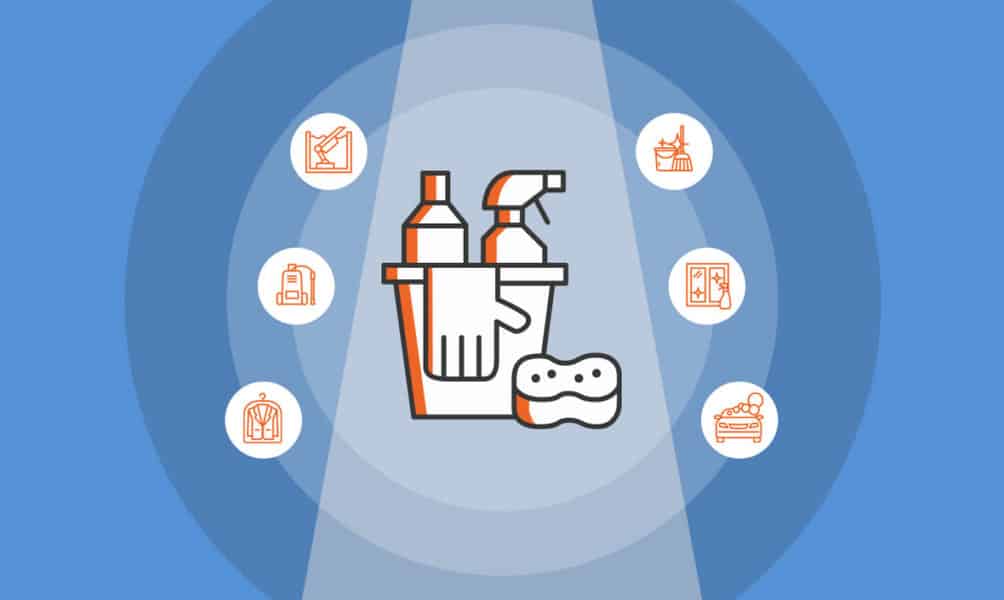
18 Smart Cleaning Business Ideas for Reliable Income
Carolyn Young
Published on July 14, 2022
Demand for cleaning services in both homes and offices surged in the last two years because of the COVID-19 pandemic. It is expected to remain higha ...
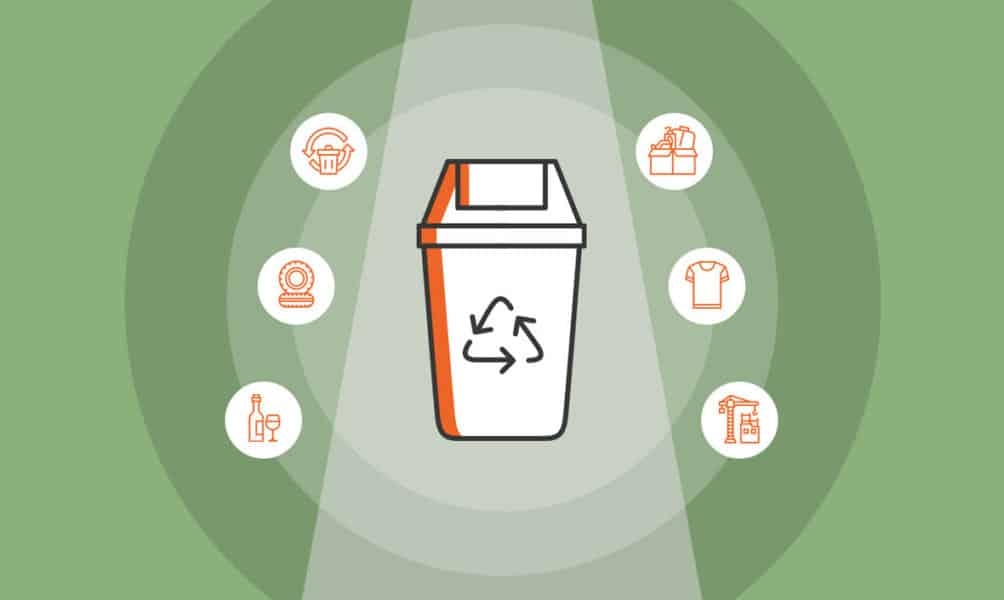
15 Recycling Business Ideas to Reduce Waste and Boost Profits
Natalie Fell
Published on June 8, 2022
Recycling isn’t just good for the environment, it’s also extremely profitable, if the business is run well. With broader eco-consciousness,house ...
No thanks, I don't want to stay up to date on industry trends and news.
How to Start a Waste Management Business: Step-by-Step Guide

- 5-Year Excel
- MAC & PC Compatible
- Immediate Download
Related Blogs
- Nine Ways Waste Management Companies Can Boost Profit Margins
- Initial Costs to Manage for a Waste Management Startup
- What Are the Core 7 KPIs for Waste Management?
- Key Operating Costs in Waste Management
- Essential Checklist for Writing a Waste Management Business Plan
Are you ready to dive into the rewarding world of waste management? Discover how to open your own waste management business in just 9 strategic steps ! Whether you're facing challenges like limited experience or tight finances , this comprehensive checklist will guide you through every essential phase. Don’t miss out on the opportunity to turn your vision into reality—check out our detailed business plan here: Waste Management Business Plan .
How Do I Open A Waste Management Company With No Experience?
Opening a waste management company like EcoCycle Innovations without prior experience may seem daunting, but with the right approach and resources, it can be successfully achieved. The waste management industry is valued at over $400 billion globally, and there are numerous opportunities for startups to innovate within this space.
Here are some essential steps to consider when starting a waste management business with no experience:
Understand the Industry
- Research the waste management industry regulations in your area to ensure compliance.
- Familiarize yourself with different waste disposal services and sustainable practices.
Networking is crucial in the waste management sector. Connect with local waste management professionals, attend industry conferences, and join relevant associations to gain insights and build relationships.
Create a Business Plan
- Develop a comprehensive waste management company business plan outlining your goals, target market, and operational strategies.
- Include a recycling business model that emphasizes sustainability and community impact.
Funding is another critical aspect. According to recent studies, approximately 70% of startups struggle with securing initial funding. Identifying investment opportunities in waste management can help you overcome this hurdle.
Engage the Community
- Launch educational programs for recycling to raise awareness and promote sustainability.
- Develop partnerships with local businesses and institutions to enhance service offerings and community involvement.
Lastly, leverage digital marketing to promote your services. A well-executed marketing campaign can significantly increase visibility and attract clients.
By following these steps and utilizing resources like the waste management startup guide , you can successfully launch a waste management company even without prior experience. Remember, persistence and adaptability are key in this ever-evolving industry.
How Do I Start A Waste Management Company With No Money?
Starting a waste management company with limited or no financial resources may seem daunting, but it is indeed possible with the right approach and strategies. The key is to leverage community support, innovative ideas, and partnerships that can help you establish your waste management business without significant upfront investment.
Here are some actionable steps and tips to get you started:
Bootstrap Your Business Model
- Focus on a recycling business model that utilizes existing community resources. Engage local volunteers for collection and sorting, which can significantly reduce labor costs.
- Consider starting with a community waste initiative aimed at promoting recycling programs. You can create a platform for neighbors to exchange ideas and resources, enhancing community involvement.
Additionally, it’s imperative to understand waste management industry regulations . Familiarizing yourself with local laws can help you to navigate the legal landscape effectively without incurring unnecessary fees:
- Research local waste management regulations to ensure compliance without requiring expensive legal advice.
- Stay updated on any grant opportunities for community recycling programs which can provide funding for initial operations.
Utilize Free Resources
- Tap into free online resources to educate yourself about forming a business plan specific to the waste management sector. Many platforms offer templates and guidelines that don’t cost a dime.
- Attend local workshops or webinars related to waste management solutions, as these often provide insights without any fees.
To create a strong network, establishing partnerships is essential. Collaborating with local businesses and institutions can open doors to resources and support:
- Approach local schools and businesses for potential educational programs for recycling . This not only raises awareness but also fosters goodwill and potential funding avenues.
- Seek partnerships with environmental organizations that may assist in funding or resources in exchange for community engagement.
Finally, for funding avenues, look at innovative funding strategies such as:
- Creating a crowdfunding campaign tailored to your community-focused waste management initiatives.
- Applying for environmental grants that specifically target sustainable waste practices.
By implementing these strategies, you can effectively move forward in opening a waste management business with no money, setting a robust foundation for future growth. For a more complete waste management business checklist , you can visit this resource: Waste Management Business Running Expenses .
Example Of Checklist For Opening A Waste Management Company
Opening a waste management company like EcoCycle Innovations requires a systematic approach to ensure success in an industry that is evolving rapidly. Below is a comprehensive checklist that can guide you through the process of starting your waste management business:
Research Local Waste Management Regulations And Requirements
Understanding the waste management industry regulations is crucial. This involves familiarizing yourself with local ordinances, environmental laws, and licensing requirements. Each state or region may have specific regulations regarding waste disposal services, and compliance is non-negotiable.
Conduct a thorough analysis of the community's waste management needs. This step may uncover high demand for sustainable waste practices and recycling services, especially in urban areas. Gather data on population demographics and waste generation rates to tailor your services effectively.
Develop A Sustainable Business Model With Innovative Recycling Solutions
Your business model should integrate innovative recycling solutions to maximize efficiency and sustainability. Consider adopting a recycling business model that not only minimizes waste but also generates revenue through recycled materials.
Implement educational programs aimed at increasing community awareness about waste management. These initiatives can help foster responsible waste disposal habits and promote your brand's commitment to sustainability.
Establish Partnerships With Local Businesses And Institutions
Forming alliances with local businesses and educational institutions can provide access to shared resources and community networks. Partnerships in waste management can enhance service delivery and create a broader impact on community waste initiatives.
Explore various funding sources, including investment opportunities in waste management such as grants, private investors, or small business loans. Having a solid waste management company business plan ready will increase your chances of attracting investors.
Implement Sustainable Practices In Operations And Management
Utilize eco-friendly methods and materials in your operations. Implementing sustainable waste practices not only fulfills regulatory demands but also enhances your company’s reputation and market viability.
Launch Marketing Campaign To Promote Services And Initiatives
Design a marketing strategy that focuses on your unique selling propositions, such as innovative recycling solutions and community engagement. Use digital channels, community events, and partnerships to increase visibility.
Monitor And Evaluate Impact On Community And Environment
Regularly assess the effectiveness of your services and initiatives. Collect data on the environmental and community impact of your operations. This feedback is essential for refining your business model and ensuring long-term sustainability.
Tips for a Successful Launch
- Network with industry professionals to gain insights into best practices.
- Stay updated on technological innovations in waste management.
- Consider pilot programs to test new services before full-scale launch.
Utilizing this checklist will place you on the right path for opening a waste management company successfully, establishing a solid foundation for your business and its impact on the community.
How Long Does It Take To Start A Waste Management Company?
The timeframe for starting a waste management company can vary widely based on several factors, including regulatory requirements, funding acquisition, and operational setup. Generally, the process can take anywhere from six months to over a year to fully establish.
Here is a breakdown of the typical phases involved in launching a waste management company:
- Research and Planning (1-3 months): This includes understanding waste management industry regulations , identifying local market needs, and drafting a comprehensive waste management company business plan .
- Funding Acquisition (2-6 months): Securing necessary funds through investment opportunities in waste management can take time. This may involve applying for grants, seeking investors, or exploring loans.
- Acquiring Permits and Licenses (1-3 months): Depending on your location, obtaining the required permits for waste disposal services can involve lengthy approval processes.
- Setting Up Operations (2-5 months): This phase includes purchasing equipment, hiring staff, and implementing sustainable practices in operations and management.
- Marketing Launch (1 month): Upon establishment, it’s crucial to roll out an effective marketing campaign to promote your services and community initiatives.
For example, EcoCycle Innovations anticipates that a significant portion of the timeline will be dedicated to ensuring compliance with local waste management laws, which can vary significantly depending on the jurisdiction.
Tips to Expedite the Process:
- Engage early with local authorities to understand regulatory requirements and expedite the permit process.
- Network within the community to identify possible partnerships that can provide resources or assistance.
- Leverage online platforms for funding sources to discover grants or investments aligned with sustainable waste practices.
In summary, the duration for opening a waste management company is influenced by thorough research, funding options, and regulatory hurdles. Setting realistic timelines will help in navigating these complexities effectively.
How Can I Find Investors For Starting A Waste Management Company?
Finding investors for your waste management startup, such as EcoCycle Innovations , requires a strategic approach, especially given the industry's rapid growth and rising demand for sustainable solutions. In 2021, the global waste management market was valued at approximately $2.08 trillion and is expected to grow at a CAGR of 5.5% from 2022 to 2030. This uptick presents a prime opportunity for potential investors.
To effectively attract investors for your waste management business, consider the following strategies:
- Build a Comprehensive Business Plan: Your business plan should outline clear goals, market analysis, operational strategies, and financial projections. A well-crafted waste management company business plan can increase your credibility.
- Showcase Your Community Impact: Highlight how your company, focusing on innovative recycling solutions and community engagement, directly addresses local and global environmental challenges. Investors are increasingly looking to fund businesses that align with sustainable practices.
- Utilize Networking Opportunities: Attend industry conferences, sustainability fairs, or local business events to connect with potential investors and showcase your vision for a waste management startup .
- Leverage Online Platforms: Use crowdfunding platforms or investment networks, which are becoming crucial for startups. Platforms focused on green businesses can help you access eco-conscious investors.
- Research Investment Opportunities: Investigate investment firms that specialize in waste management or sustainable businesses. Many firms are now dedicating a portion of their portfolios to investment opportunities in waste management .
Tips for Attracting Investors
- Prepare a compelling pitch deck that summarizes your mission, market potential, and unique business model.
- Highlight community partnerships and local government support, as this can enhance your credibility in the eyes of investors.
- Stay updated on waste management industry regulations to demonstrate compliance and understanding of the market landscape.
Furthermore, consider exploring various funding sources, including grants for environmental initiatives, angel investors, and venture capital firms. According to a 2020 report, 60% of successful startups secured funding through a mix of personal investment and external sources, emphasizing the importance of diversifying your funding strategy.
By leveraging these strategies, you can effectively find investors who align with your vision for sustainable waste management, ensuring that your startup, EcoCycle Innovations, is well-positioned for success in the rapidly evolving market.
How Do I Create A Successful Business Plan For A Waste Management Company?
Creating a successful business plan for your waste management company, such as EcoCycle Innovations , is essential for outlining your strategy and attracting potential investors. A well-structured waste management company business plan should cover several critical components to ensure that you address both the environmental challenges and the community’s needs effectively.
- Executive Summary: This section provides a concise overview of your business, including your mission, vision, and the services you'll offer, such as innovative recycling solutions and community waste initiatives.
- Market Analysis: Conduct thorough research on the waste management industry regulations, market needs, and potential customers. For instance, the waste management market is expected to grow at a CAGR of 5.5% from 2021 to 2028, indicating robust demand.
- Marketing Strategy: Outline how you plan to engage your target audience through educational programs for recycling and partnerships with local businesses and institutions.
- Operational Plan: Detail the day-to-day operations, such as waste disposal services, logistics, and sustainable practices in management.
- Financial Projections: Include startup costs, projected revenues, and a break-even analysis, which can help you gauge when you’ll start seeing a return on investment. A comprehensive financial plan can help secure funding sources for waste management businesses.
- Funding Strategies: Identify potential funding sources including grants, investors, and crowdfunding platforms. Clearly articulate investment opportunities in waste management to attract investors.
Your business plan should also highlight your commitment to sustainable waste practices and community engagement strategies, which are vital components of EcoCycle Innovations' vision.
Tips for Crafting Your Business Plan:
- Utilize tools like business plan templates specifically tailored for waste management to streamline the process.
- Incorporate data-driven insights, such as the fact that over 60% of waste can be recycled , to strengthen your market analysis.
- Consider conducting surveys or focus groups to assess community needs and demands regarding waste management solutions.
In addition, ensure that your business plan is adaptable to changing regulations within the waste management industry, as this will enable you to maintain compliance and stay competitive.
Checklist For Opening A Waste Management Company
Starting a waste management business can seem daunting, but having a comprehensive waste management business checklist can streamline the process. Below are essential steps to take when opening a waste management company like EcoCycle Innovations , which aims to integrate cutting-edge recycling technology with community-focused educational initiatives.
Understand the waste management industry regulations specific to your location. This includes acquiring necessary permits and ensuring compliance with local laws.
Identify Target Market And Community Needs
Analyze your potential customers, such as businesses, residential areas, and educational institutions, to identify their specific waste management solutions .
Craft a waste management company business plan that incorporates an effective recycling business model, focusing on innovative practices that exceed standard requirements.
Create Educational Initiatives For Community Engagement
Introduce educational programs for recycling to engage the community and enhance their understanding of sustainable waste practices.
Form strategic partnerships with local organizations to enhance service offerings and improve community outreach.
Secure Funding Through Grants Or Investors
Explore funding sources for waste management businesses , including grants and investment opportunities, to cover initial costs.
Ensure that sustainability is at the forefront of daily operations, from routing waste disposal services to implementing efficient recycling methods.
Utilize digital marketing, local events, and community outreach to promote your services and create awareness around sustainable waste practices.
Regularly assess the impact of your waste management initiatives on both the community and the environment to make data-driven improvements.
Tip for Securing Funding
- Look into local and state grants focused on environmental sustainability, which often provide substantial financial aid for waste management startups.
By following this checklist for launching a waste management business , entrepreneurs can effectively position their companies for success while positively impacting their communities.
Starting a Business Steps
Launching a waste management business requires careful planning and execution. Each step plays a critical role in ensuring the sustainability and success of your venture. Below is a checklist of essential steps to follow when starting your business.
When opening a waste management company , one of the first steps is to thoroughly research local waste management regulations and requirements. Compliance with these regulations is not just a legal necessity but also pivotal for the success of your startup, such as EcoCycle Innovations . Understanding local laws helps in forming a solid foundation for your business model.
In the waste management industry, regulations can vary significantly from one jurisdiction to another. Navigating these complexities requires an awareness of both state and federal laws regarding waste disposal, recycling, and environmental protection. Here are some key areas to focus on:
- Licensing Requirements: Many states require specific permits and licenses to operate waste disposal services. Make sure to check local agencies for details on how to obtain these.
- Environmental Regulations: Familiarize yourself with local environmental laws that dictate how waste must be handled, including protocols for hazardous materials.
- Recycling Mandates: Some areas have strict recycling laws that require businesses to meet certain recycling targets or provide access to recycling services.
- Health and Safety Standards: Understand regulations pertaining to worker safety to ensure that your operations comply with Occupational Safety and Health Administration (OSHA) standards.
Tips for Navigating Regulations
- Engage with a local legal advisor specializing in environmental law to ensure compliance.
- Join local waste management associations to access resources and network with other professionals.
- Attend workshops or seminars on waste management industry regulations to stay updated on changes in the law.
According to the Environmental Protection Agency (EPA) , approximately 35% of waste generated in the U.S. is currently recycled. This statistic emphasizes the importance of adhering to recycling mandates, as many municipalities are tightening regulations to improve recycling rates. Not only does compliance help avoid penalties, but it also enhances your company’s credibility and attractiveness to potential investors, particularly those interested in sustainable practices.
Moreover, understanding these regulations can help in developing a waste management company business plan that incorporates community needs while adhering to local laws. Factors such as community engagement initiatives could enhance your overall business strategy.
Establishing a comprehensive understanding of local waste management laws is essential for starting a waste management business . You can access practical resources, including templates for your waste management startup guide , available at Business Plan Templates . These resources can assist in drafting a robust business plan that meets regulatory requirements.
For entrepreneurs interested in starting a waste management business with no experience , studying local regulations not only builds a foundation of knowledge but also prepares you for the types of partnerships and community initiatives that can enhance your service offerings. Properly navigating the regulatory landscape can be the key to a successful launch and sustainable operation.
Understanding the target market and community needs is crucial when starting a waste management business . By aligning EcoCycle Innovations' services with the specific requirements of potential customers, your venture can address pressing environmental issues while fostering sustainable practices in the community. Here are essential steps and considerations for identifying these needs:
- Research Demographics: Analyze the population density, income levels, and housing structures to target urban areas effectively. Look for communities with growing populations that may require robust waste disposal services .
- Assess Waste Generation: Estimate the volume and type of waste produced in your target area. This data can be gleaned from local government reports or public health departments. For example, regions with higher commercial activity tend to generate more waste, presenting opportunities for your services.
- Evaluate Existing Services: Identify current waste management providers in the area and assess their strengths and weaknesses. Understanding gaps in their services can help you position EcoCycle Innovations advantageously.
- Community Surveys: Conduct surveys or focus groups to gather direct feedback from residents and businesses about their waste management experiences and needs. These insights are invaluable in crafting your service offerings.
- Engage Local Institutions: Collaborate with schools and community organizations to understand their waste management challenges. This can lead to tailored educational programs for recycling and innovative recycling solutions.
By implementing these strategies, you will better understand how to create a sustainable waste management business model that resonates with your target audience. To illustrate the importance of community needs, consider the following data:
This breakdown highlights that a substantial portion of the market is derived from residential waste management , with significant potential in commercial services and recycling initiatives. Therefore, a business plan should focus on these sectors for enhanced success.
Tips for Identifying Community Needs
- Use social media platforms to gauge local opinions and trends regarding waste management.
- Attend community meetings to discuss environmental concerns and introduce your innovative solutions.
- Analyze state and local regulations to tailor your offerings to meet waste management industry regulations .
By engaging with your community and understanding their needs, you can create a dynamic and responsive waste management company. This alignment not only positions EcoCycle Innovations as a community leader but also enhances your potential for attracting funding sources for waste management businesses through demonstrated value and impact.
For a comprehensive roadmap on how to open a waste management company, including insights on targeting your market, visit this link .
In the realm of waste management , establishing a sustainable business model is vital for both operational success and environmental stewardship. As the demand for effective waste disposal services rises, integrating innovative recycling solutions becomes essential. This not only enhances operational efficiency but also promotes a culture of sustainability within the community.
To create a robust and sustainable business model for your waste management company, consider the following steps:
- Utilize Advanced Recycling Technologies: Invest in cutting-edge technologies such as automated sorting systems, which can significantly improve the efficiency of recycling operations. For instance, adopting AI-powered sorting can increase accuracy in material recovery by up to 95% .
- Implement a Circular Economy Approach: Focus on designing systems that facilitate the reuse and recycling of materials, thereby reducing waste generation. This can lead to 30% less waste going to landfills, benefiting both the environment and business profitability.
- Develop Tailored Recycling Programs: Customize recycling initiatives to meet the specific needs of different communities or industries. For instance, offering dedicated services for e-waste can tap into a growing market, as e-waste recycling has been projected to grow to $49.4 billion by 2028 .
Moreover, fostering community engagement through educational initiatives is crucial. Programs aimed at raising awareness about recycling and sustainable practices can not only enhance participation but also position your company as a leader in community waste initiatives.
Tips for Developing Your Business Model
- Conduct market research to identify the recycling needs specific to your region.
- Explore investment opportunities in waste management to secure necessary funding.
- Collaborate with local authorities to ensure compliance with waste management industry regulations .
By integrating these strategies into your waste management business, you not only optimize operations but also contribute significantly to environmental conservation. Access a comprehensive waste management business plan to further refine your approach and attract potential investors.
Ultimately, focusing on sustainability and innovation in recycling will set your company apart in a competitive industry while fostering positive relationships with the communities you serve.
Establishing a successful waste management business, such as EcoCycle Innovations, requires more than just operational capabilities; it necessitates robust community engagement through educational initiatives. By focusing on educational programs, you not only foster community awareness but also create a culture of sustainability that enhances your brand's reputation.
Statistically, communities that engage in educational initiatives about waste management experience a 25% increase in recycling rates, according to the Recycling Partnership. This underscores the importance of proactive engagement in influencing public behavior. Below are some essential steps to design effective community education programs:
Tips for Creating Effective Educational Initiatives
- Tailor programs to specific community demographics, ensuring relevance and accessibility.
- Incorporate interactive learning experiences, such as workshops and demonstrations.
- Leverage social media and local events to promote educational content.
Examples of community educational initiatives include:
- Workshops on recycling best practices and proper waste disposal methods.
- School programs that educate students on sustainability and the importance of waste segregation.
- Partnerships with local businesses to promote waste reduction and recycling.
Furthermore, by aligning such initiatives with your business model, you can enhance your company's visibility and credibility in the waste management sector. A well-executed program can provide data for your waste management company business plan , showcasing community engagement and support as crucial elements of your operational strategy.
As you develop these initiatives, consider the various funding sources for waste management businesses available to support your educational programs. Local government grants, private donations, and sponsorships can substantially offset costs, making it easier to implement these vital community outreach efforts.
Incorporating educational components not only empowers the community but also creates a loyal customer base, crucial for starting a waste management business with no experience . By positioning yourself as a leader in community engagement, EcoCycle Innovations will not only address the pressing challenges of waste management but also contribute to a sustainable future.
For further guidance on how to create a detailed and effective waste management business checklist , consider utilizing resources like this comprehensive business plan template .
One of the most effective strategies for starting a waste management business is to establish strong partnerships with local businesses and institutions. Collaborations can enhance your service offerings, increase visibility, and create a community-focused approach that fosters sustainability. By working together, you can achieve shared goals, particularly around waste reduction and recycling programs.
Local businesses can benefit from waste disposal services, while educational institutions can host workshops on recycling and sustainability initiatives. Consider targeting the following types of partners:
- Municipal governments looking for innovative waste management solutions
- Schools and universities interested in implementing educational recycling programs
- Local businesses that generate significant waste streams and could improve their waste practices
- Community organizations focused on environmental initiatives
Partnerships not only facilitate resource sharing but can also open up avenues for additional funding and investment opportunities in waste management. According to a recent industry report, companies involved in partnerships are 30% more likely to secure funding than those that operate independently. Here’s how to build these relationships:
Tips for Building Partnerships
- Attend local business networking events and introduce your waste management services.
- Offer free workshops or seminars to educate local businesses on sustainable waste practices.
- Utilize social media and local advertising to promote your partnership successes.
Furthermore, consider the financial implications of these partnerships. A potential partnership with a local university could yield a 10% reduction in operational costs by sharing resources and facilities. As you establish these connections, make a point to highlight the mutual benefits and shared values surrounding sustainability and community engagement.
In summary, establishing partnerships is a crucial step in opening a waste management company . It not only amplifies your market presence but also contributes to a collective effort towards sustainable waste practices. Utilize this approach to leverage existing networks and create a lasting impact within the community. For a comprehensive insight into drafting a waste management company business plan , visit here .
Securing funding is a critical step when starting a waste management business like EcoCycle Innovations. The right financial backing not only ensures initial operational capabilities but also allows your company to invest in sustainable waste practices and community initiatives. Here’s a comprehensive approach to obtaining the necessary funds:
- Grants: Numerous governmental and non-governmental organizations offer grants for eco-friendly businesses. Research options like the Environmental Protection Agency (EPA) grants or state-level sustainability programs.
- Investors: Attracting solvent investors can provide significant capital. Prepare a solid pitch that highlights your innovative recycling business model and community engagement efforts.
- Crowdfunding: Platforms like Kickstarter or Indiegogo can be effective for raising capital while generating community interest in your services.
- Develop a robust waste management company business plan that presents your vision, mission, and financial projections.
- Network within the waste management industry to find angel investors or venture capitalists interested in sustainability.
- Organize community events to demonstrate the positive impact of your initiatives, showcasing real-life statistics that illustrate the need for improved waste management solutions.
According to a report by the Global Waste Management Market , the industry is expected to reach $600 billion by 2025, driven by a growing demand for effective waste disposal services and recycling programs. This strong market growth indicates ample investment opportunities in waste management , making it an attractive sector for potential backers.
Consider investigating funding sources like local foundations that support community waste initiatives . In some cases, these foundations may prioritize investments in projects that focus on educational programs for recycling, which can further bolster your reputation and outreach within the community.
Additionally, seek partnerships with local businesses and institutions to share resources and reduce operational costs. This collaborative approach can also enhance your credibility and attract potential investors who value community-focused projects.
Establishing a strong funding strategy is crucial for launching a waste management company successfully. By diversifying funding sources and leveraging community relationships, EcoCycle Innovations can secure the necessary capital to not only start operations but also thrive in an evolving market.
In the evolving landscape of waste management, implementing sustainable practices is not just a choice but a necessity. For EcoCycle Innovations, these practices are central to our operational philosophy, ensuring that we not only manage waste effectively but also contribute positively to the environment and the communities we serve. Here’s how to incorporate these sustainable practices into your operations and management:
- Adopt a Recycling Business Model: Integrate advanced recycling technologies to maximize resource recovery. By ensuring that at least 30% of waste is recycled, you can significantly reduce landfill dependency.
- Utilize Sustainable Materials: When designing your waste management solutions, opt for eco-friendly materials for your operations, such as biodegradable bags and recyclable containers.
- Implement Energy Efficiency: Use energy-efficient vehicles for waste collection that not only reduce carbon emissions but also lower fuel costs by up to 15% .
- Conduct Regular Training: Train employees on sustainable waste practices, which can increase operational efficiency and reduce waste-related costs by approximately 20% .
- Create a Waste Reduction Strategy: Develop initiatives to minimize waste production at the source, targeting a reduction of waste generation by 25% in local businesses through educational outreach.
To manage and assess these practices effectively, consider the following tools and metrics:
Tips for Sustainable Operations
- Regularly assess waste streams to identify opportunities for recycling and reduction.
- Engage with local environmental groups to promote collaboration on sustainability projects.
By embedding these sustainable practices into the core operations of your waste management business, you can create a robust model that not only meets regulatory requirements but also positions EcoCycle Innovations as a frontrunner in the industry. Adhering to local waste management industry regulations and incorporating community feedback will enhance your company's credibility and foster sustainable growth.
To assist in structuring your venture, consider utilizing a comprehensive waste management business plan that outlines methods, funding sources, and community waste initiatives.
Ultimately, implementing sustainable practices will not only optimize your operational efficiency but also promote a culture of sustainability that resonates with both clients and investors in the waste management sector.
Launching a successful marketing campaign is crucial for promoting your waste management company, EcoCycle Innovations. To effectively reach your target audience and establish a strong presence in the community, consider the following strategies that align with your mission of sustainability and community engagement.
- Utilize Social Media Platforms: Platforms such as Facebook, Instagram, and Twitter can help you connect with the community. Share educational content about waste disposal services, recycling processes, and the benefits of sustainable waste practices.
- Host Community Workshops: Organize workshops focused on recycling education and sustainable waste management practices. Engaging in person can create a personal connection with potential customers and investors alike.
- Collaborate with Local Businesses: Form partnerships with local businesses to cross-promote services. This can include co-hosting events or offering special discounts to their customers.
- Targeted Digital Advertising: Use targeted ads on Google and social media to reach specific demographics. Highlight the unique features of your business model and the environmental benefits of using EcoCycle Innovations’ services.
- Content Marketing: Create a blog on your website discussing topics related to the waste management industry, such as local waste management laws, innovative recycling business models, and educational programs for recycling.
A well-structured waste management business checklist can also enhance your marketing efforts by ensuring that all aspects of your marketing campaign are covered. Consider including these components:
Tip: Utilize Local Influencers
- Engage with local influencers who are passionate about sustainability. They can help amplify your message and reach a wider audience.
As you craft your marketing campaign, measure the impact of your initiatives. Research indicates that businesses that actively engage with their communities can see a customer loyalty increase of up to 50% . Additionally, communities that are educated about waste management practices often experience a 30% increase in recycling rates.
To efficiently manage your marketing efforts, utilize analytics tools to track engagement and conversion rates. This data will help you refine your marketing strategy and maximize your outreach potential.
Investing in a comprehensive waste management company business plan can guide your marketing and operational strategies effectively. For a detailed plan tailored to your vision, consider consulting resources at this site .
In conclusion, a well-planned marketing campaign will serve as a foundation for establishing EcoCycle Innovations as a leader in sustainable waste management and community engagement. Prioritize community-driven initiatives and enhance your brand presence through strategic marketing efforts that resonate with your audience's values.
Monitoring and evaluating the impact of your waste management business, such as EcoCycle Innovations, on the community and environment is crucial for achieving sustainable outcomes. A structured approach ensures that your operations align with the goals of promoting recycling and sustainability. Here are key areas to focus on:
- Community Engagement: Regular surveys and feedback mechanisms can help assess community perspectives on waste management services and initiatives.
- Environmental Impact Assessments: Conduct systematic evaluations to measure the effectiveness of your recycling solutions and their contribution to reducing landfill waste.
- Data-Driven Decisions: Leverage analytics to track waste diversion rates, recycling rates, and overall community participation in waste initiatives.
To facilitate a comprehensive evaluation, it is beneficial to establish measurable benchmarks for your waste management solutions. Here is a table illustrating some key performance indicators (KPIs) you might consider:
These KPIs will not only guide your operational adjustments but also help attract potential investors interested in environmentally responsible business practices.
Tips for Effective Monitoring
- Implement a comprehensive tracking system for waste collected, recycled, and disposed of, using digital platforms or software.
- Host community workshops to raise awareness and gather input on improvement areas for waste management services.
- Collaborate with local authorities to align your business objectives with community waste management goals.
Utilizing these strategies will create a strong foundation for evaluating your company's impact and ensuring that your business model aligns with sustainable waste practices. For a detailed roadmap on how to open a waste management company, consider using a structured business plan, like one from Business Plan Templates .
Furthermore, it is essential to keep abreast of waste management industry regulations and adapt your strategies accordingly. By routinely evaluating these factors, EcoCycle Innovations can remain at the forefront of community waste initiatives, fostering a culture of responsibility and environmental awareness.
- Choosing a selection results in a full page refresh.

Item added to your cart
Download all the resources to start a waste management company.
Let's make sure your recycling and waste disposal services will be profitable!
How to write a business plan for your waste management company

Starting a waste management company is a great idea as it provides a valuable service that helps to reduce environmental pollution and improve public health.
Furthermore, it is a growing industry with many opportunities for growth and innovation.
But, before launching anything, make sure you have a business plan in place.
A business plan is an essential document that provides a roadmap for a new project. It outlines the goals, objectives, strategies, and financials of the project, helping ensure its success.
In short, a good business plan will help make sure your waste management company is profitable .
What should be outlined in the business plan for a waste management company? What's the ideal arrangement for the structure? What are the essential financial figures to include? How can I write a business plan quickly and effectively without sacrificing quality?
Prepare for a thorough exploration of these questions with detailed answers right here!
Also, please note that starting your business plan from scratch is not mandatory.
You can download our editable business plan for a waste management company and adapt it to your project.

Constructing a business plan for a waste management company
Should you draft a business plan for your waste management company.
Yes, you should draft a business plan for your waste management company.
Establishing a strong business plan will afford you the chance to:
- learn about the waste management market
- grasp the pulse of the industry's new trends
- identify what makes a waste management company thriving
- understand the waste disposal and recycling needs of residential, commercial, and industrial clients
- come up with a unique value proposition for your recycling and waste disposal services
- compare and contrast competitor offerings
- find competitive advantages for your waste management company
- find a business model that will make you profitable
- formulate a rock-solid strategy to accelerate business expansion
- identify and manage risks specific to a waste management company, including environmental regulations, worker safety, and waste disposal methods
Our team has created a business plan for a waste management company that is designed to make it easier for you to achieve all the elements listed.
How to structure a business plan for a waste management company?
A business plan encompasses various metrics and relevant data. It is important to have an orderly format for smooth reading and comprehension.
When we made our business plan for a waste management company , we made sure to outline it properly.
The document consists of 5 sections (Opportunity, Project, Market Research, Strategy and Finances).
1. Market Opportunity
The introductory section has been named "Market Opportunity".
Explore this section to understand the waste management industry, as we present essential data and insights to support your business strategies.
The data here is always fresh; we update it biannually.
2. Project Presentation
In the "Project" section, you can describe your waste management company, including the waste collection and disposal services you provide, recycling initiatives, sustainability practices, client industries served, service area coverage, and the unique value proposition that sets your company apart in the industry.
Remember to introduce yourself at the end of this section.
Explain your background in waste management, your commitment to environmental sustainability, and how you plan to provide efficient and eco-friendly waste management solutions. Highlight your range of waste collection and disposal services, your adherence to regulatory requirements, and your dedication to promoting a clean and healthy environment through responsible waste management practices.
We've written text for you. Customize it to fit your idea perfectly.
3. Market Research
Next up is the "Market Research" section.
This section provides a description of the market segments for your waste management company.
It includes an analysis of competing waste management firms and highlights your company's unique waste disposal solutions and competitive advantages. A customized SWOT analysis is also included.
4. Strategy
The "Strategy" section encompasses a complete growth plan, delineating the necessary steps and initiatives to make your waste management company exceptionally profitable.
Furthermore, this section includes a marketing strategy for a waste management company, a risk management approach, and a completed Business Model Canvas.
5. Finances
In the end, the section titled "Finances" is where you can present the financial plan and breakdown for your project.

How to draft the Executive Summary for a waste management company?
The Executive Summary serves as a compact introduction to the business plan of your waste management company.
Don't surpass 2 pages; present only the necessary information.
This is the first section of your business plan that the bank will look at. It needs to interest them and make them want to read the rest of the plan.
In the Executive Summary of your waste management company, answer these questions: what waste management services does your company provide? who is your target market? who are your competitors in the industry? how do you differentiate from them? what is your budget?
How to do the market analysis for a waste management company?
The market study of your waste management company helps you understand external factors such as customer demands for sustainable waste solutions, competition within the waste management industry, and emerging trends in recycling practices.
By conducting a thorough market analysis, a waste management company can understand customer waste disposal needs, provide efficient and environmentally friendly waste management services, optimize pricing strategies, and execute targeted marketing campaigns, ultimately leading to a loyal customer base, increased service contracts, and a prominent position in the waste management industry.
Here is what what we've put in the "Market Research" section of our business plan for a waste management company :
- recent data and statistics about waste management companies, including recycling rates, waste disposal methods, and environmental impact
- a compilation of potential customer segments for a waste management company
- the competitive analysis
- the competitive advantages for a waste management company

The key points of the business plan for a waste management company
What's the business model of a waste management company, business model of a waste management company.
A waste management company's business model revolves around managing and disposing of various types of waste.
The company provides waste collection, recycling, and disposal services to residential, commercial, and industrial customers. Revenue is generated through service contracts, fees for waste collection, recycling programs, and landfill operations.
The business model emphasizes efficient waste management practices, environmental sustainability, regulatory compliance, and offering tailored waste solutions to meet the needs of different customer segments.
Business model ≠ Business plan
It's important not to mistake "business plan" for "business model."
A business model is a blueprint for how a company operates and makes money.
In a business plan, you use a helpful tool called the Business Model Canvas to clearly show how your business operates.
Rest assured, there is a Business Model Canvas (already completed) in our business plan for a waste management company .
How do you identify the market segments of a waste management company?
Market segmentation for your waste management company involves dividing your potential customers into different groups based on their waste disposal needs, sustainability goals, and demographics.
These categories may include factors such as residential waste management, commercial waste management, recycling services, or customers seeking specific waste management solutions or environmental initiatives.
By segmenting your market, you can offer specialized waste management services and programs that cater to each segment's specific requirements. For example, you might focus on residential waste management and provide curbside waste collection, recycling, and composting services for homeowners and residential communities, offer tailored waste management solutions for businesses and commercial establishments, specialize in recycling services and promote sustainable waste practices to reduce landfill waste and promote environmental conservation, or focus on specific waste management solutions or environmental initiatives such as electronic waste recycling, organic waste management, or sustainable packaging solutions to accommodate customers with specific waste disposal needs or sustainability goals.
Market segmentation allows you to effectively target your marketing efforts, communicate your commitment to environmental stewardship, and provide efficient and eco-friendly waste management solutions that meet the unique needs and preferences of each customer segment.
In the business plan for a waste management company , you will get a detailed market segmentation, helping you understand your target audiences and their needs.
How to conduct a competitor analysis for a waste management company?
Without surprise, you won't be the only waste management company in your area. There will be other organizations offering sustainable waste disposal and recycling services.
It is essential to conduct a thorough competitor analysis. This entails identifying and examining the key attributes of your competitors, as well as assessing their strengths and weaknesses.
Take stock of their weaknesses (such as inadequate recycling practices, inefficient waste disposal methods, or poor customer service).
Why is it important to address these concerns? Because these weaknesses can impact the effectiveness and sustainability of waste management services.
By focusing on these areas, you can offer comprehensive waste management solutions, provide efficient and eco-friendly waste collection and disposal processes, and deliver excellent customer communication and support, positioning your waste management company as a trusted and preferred partner for responsible waste management and environmental sustainability.
It's what we call competitive advantages—focus on nurturing them to gain a competitive edge.
Here are some examples of competitive advantages for a recycling company: environmentally responsible recycling services, efficient waste management solutions, community engagement.
How to draft a SWOT analysis for a recycling company?
A SWOT analysis is useful for identifying potential strengths, weaknesses, opportunities, and threats in order to develop an effective waste management strategy.
As you can guess, there is indeed a completed and editable SWOT matrix in our business plan for a waste management company
The strengths for a waste management company
When we use the "S" in SWOT, we're referring to Strengths, which are the project's positive elements.
For a waste management company, strengths could include advanced recycling technology, efficient waste collection and transportation, robust customer service, and sustainability initiatives.
The weaknesses for a waste management company
W stands for Weaknesses, which are the areas or aspects of the project where improvements are necessary.
In the case of a waste management company, potential weaknesses could include inadequate recycling infrastructure, limited disposal options for certain types of waste, and potential environmental compliance issues.
The opportunities for a waste management company
When we use the "O" in SWOT, we're referring to Opportunities, which are the external prospects or favorable conditions that can enhance the project.
In the case of a waste management company, potential opportunities include providing waste collection services, sorting and recycling materials, composting services, and providing education and awareness programs.
The threats for a waste management company
The letter "T" in SWOT signifies Threats, highlighting the potential obstacles or negative factors that the project needs to navigate.
How to craft a marketing strategy for a recycling company?
Including a marketing strategy in your business plan is necessary to capture customers and generate profits.
A recycling company can promote environmental responsibility by implementing an effective marketing strategy that highlights the company's commitment to recycling, eco-friendly practices, and the positive impact of recycling on the environment.
Companies won't utilize your waste management services without proper promotion; highlighting your eco-friendly solutions, efficient waste disposal, and commitment to sustainability is necessary.
Are you utilizing marketing tactics to promote your recycling company? Consider offering educational content about the importance of recycling and sustainability on your website or social media, collaborating with local schools or community organizations for recycling initiatives, and attending environmental fairs or expos to raise awareness.
No worries if you don't know anything about marketing and communication.
How to build financial projections for a recycling company?
A solid business plan must include financial data to provide an accurate assessment of the business's potential success.
As part of your business plan, it will be necessary to forecast the revenue for your waste management company.
By presenting a revenue forecast that is relevant and credible in your business plan, you establish a strong foundation for bank or investor confidence.
Our financial plan for a waste management company is designed to be user-friendly, incorporating automatic verifications that assist in identifying and correcting any assumptions. This ensures you can build credible projections with confidence.
Without a doubt, you'll need to come up with a basic budget for starting your waste management company. Don't forget any expense (we have listed them all in our financial plan !).
Including the break-even analysis in your financial plan is important as it shows whether your waste management company will be profitable or not.
- Choosing a selection results in a full page refresh.
- Opens in a new window.

Writing a Business Plan for Solid Waste Management: Key Considerations

Solid Waste Management Bundle 2025
Crafting a comprehensive business plan is the cornerstone of any successful Solid Waste Management venture. Before embarking on this crucial step, it's essential to lay the groundwork with a thorough checklist. From market research to financial assessments , this nine-step guide will ensure your business plan is a roadmap to success. Dive in and uncover the key elements that will transform your waste management idea into a thriving enterprise.
Steps Prior To Business Plan Writing
Before embarking on the journey of crafting a comprehensive business plan for a Solid Waste Management (SWM) venture, it is crucial to lay the groundwork and address several key considerations. This checklist outlines the essential steps to be taken prior to the actual business plan writing process, ensuring a well-informed and strategically sound foundation for your endeavor.
Conduct Thorough Market Research and Analysis
Developing a successful Solid Waste Management business plan begins with conducting comprehensive market research and analysis . This critical step lays the foundation for understanding the industry, identifying target customers, and assessing the competitive landscape. By thoroughly exploring the Solid Waste Management market, entrepreneurs can make informed decisions and develop a strategic plan that addresses the unique needs and challenges of this sector.
The first step in the market research process is to analyze the overall Solid Waste Management industry . This includes examining industry trends, regulations, and emerging technologies that may impact the business. According to the latest industry reports, the global Solid Waste Management market is expected to grow at a CAGR of 4.8% from 2021 to 2028, reaching a market size of $530 billion . This growth is driven by factors such as increasing urbanization, environmental concerns, and the need for sustainable waste management solutions.
- Explore industry publications, government data, and trade associations to gather in-depth insights into the Solid Waste Management market.
- Analyze key industry trends, such as the rise of waste-to-energy technologies and the increasing focus on circular economy principles.
- Stay up-to-date on regulatory changes and environmental policies that may impact the Solid Waste Management industry.
Next, it is crucial to identify the target market and customer needs for the Solid Waste Management business. This involves segmenting the market based on factors such as geographic location, population density, and waste generation patterns. For example, the urban and suburban areas are typically the most promising target markets for Solid Waste Management services, as they tend to have higher waste generation rates and a greater need for efficient waste management solutions.
By understanding the specific needs and pain points of the target customers, entrepreneurs can develop tailored services and solutions that address their unique requirements. This may include offering mobile recycling units, on-demand waste collection, or specialized waste processing services to meet the evolving needs of communities and businesses.
- Conduct customer surveys, focus groups, and interviews to gather insights into the needs and preferences of the target market.
- Analyze demographic and socioeconomic data to identify the most promising geographic areas for the Solid Waste Management business.
- Stay attuned to changing consumer behaviors and emerging trends in the Solid Waste Management industry.
Finally, it is essential to assess the competitive landscape within the Solid Waste Management industry. This includes identifying the key players, their market share, and their unique value propositions. By understanding the strengths, weaknesses, and strategies of the competition, entrepreneurs can develop a differentiated offering that sets their Solid Waste Management business apart.
The competitive analysis should also consider emerging trends and disruptive technologies that may impact the industry. For instance, the rise of smart waste management systems and the integration of Internet of Things (IoT) technologies are transforming the Solid Waste Management industry, presenting both opportunities and challenges for new entrants.
- Conduct a SWOT (Strengths, Weaknesses, Opportunities, Threats) analysis to assess the competitive positioning of the Solid Waste Management business.
- Identify the key competitors, their market share, and their unique value propositions to develop a strategic advantage.
- Stay informed about industry disruptions and technological advancements that may impact the competitive landscape.
By thoroughly conducting market research and analysis, entrepreneurs can gain a deep understanding of the Solid Waste Management industry, the target market, and the competitive environment. This knowledge will be invaluable in developing a comprehensive business plan that addresses the unique challenges and opportunities within the Solid Waste Management sector.
Identify Target Market and Customer Needs
Identifying the target market and understanding customer needs are crucial steps in developing a comprehensive Solid Waste Management business plan. By conducting thorough market research, entrepreneurs can gain valuable insights into the specific challenges, preferences, and pain points of their target audience, allowing them to tailor their services and offerings to meet their customers' unique requirements.
In the case of EcoCyc Innovations , the target market for their Solid Waste Management solution encompasses residential communities, municipalities, and local authorities. According to industry data, the global solid waste management market is expected to grow at a CAGR of 5.8% from 2021 to 2028, reaching a value of $530.3 billion by 2028, driven by factors such as increasing urbanization, environmental concerns, and the need for sustainable waste disposal practices.
To identify the specific needs of their target market, EcoCyc Innovations should consider conducting surveys, focus groups, and in-depth interviews with potential customers. This research can help the company understand the current challenges faced by communities in managing solid waste, their preferences for convenient and environmentally-friendly recycling solutions, and their willingness to adopt innovative approaches to waste management.
- Analyze demographic data, such as population size, income levels, and waste generation patterns, to better understand the target market's characteristics.
- Gather feedback from local authorities and community leaders to identify the specific pain points and requirements for effective solid waste management solutions.
- Conduct market segmentation to identify the most promising customer segments and tailor the Solid Waste Management offering accordingly.
By thoroughly understanding the target market and customer needs, EcoCyc Innovations can develop a Solid Waste Management business plan that addresses the unique challenges faced by communities, offers a compelling value proposition, and ultimately, drives the adoption of their innovative recycling solution.
Assess Competitive Landscape and Industry Trends
Conducting a thorough analysis of the competitive landscape and industry trends is a critical step in developing a robust Solid Waste Management business plan. By understanding the current market dynamics, potential competitors, and emerging industry developments, you can effectively position your EcoCyc Innovations venture for success.
One of the key aspects of this analysis is to identify the major players in the Solid Waste Management industry. This includes examining the market share, service offerings, and competitive strategies of established waste management companies, as well as any innovative startups disrupting the traditional waste management model. By understanding the strengths and weaknesses of your competitors, you can identify opportunities to differentiate your EcoCyc Innovations and provide a unique value proposition to your target customers.
In addition to analyzing the competitive landscape, it is essential to stay abreast of the latest industry trends and developments. This may include tracking changes in government regulations, advancements in recycling and waste processing technologies, shifts in consumer attitudes and preferences, and emerging sustainability initiatives. By staying informed about these industry trends, you can proactively adapt your Solid Waste Management business model and strategic plans to capitalize on emerging opportunities.
- Benchmark your EcoCyc Innovations against the leading Solid Waste Management companies, analyzing their market share, service offerings, and pricing strategies.
- Monitor industry publications, government reports, and relevant trade associations to stay informed about the latest trends and innovations in the Solid Waste Management sector.
- Identify any potential regulatory changes or policy shifts that could impact the Solid Waste Management industry and proactively adapt your business plan accordingly.
By thoroughly assessing the competitive landscape and staying attuned to industry trends, you can develop a Solid Waste Management business plan that effectively addresses the needs of your target market, outpaces the competition, and positions EcoCyc Innovations as a leader in the sustainable waste management industry.
Determine Unique Value Proposition and Competitive Advantages
Establishing a strong and differentiated value proposition is crucial for the success of any Solid Waste Management business plan. In the case of EcoCyc Innovations, the unique value proposition lies in the company's innovative approach to bringing mobile recycling units directly to neighborhoods, thereby significantly improving recycling rates and reducing landfill waste.
According to a recent industry report, the global solid waste management market is expected to grow at a CAGR of 5.2% from 2021 to 2028 , reaching a value of $530.7 billion by 2028 . However, the current recycling rates in many regions remain alarmingly low, with only 34.6% of municipal solid waste being recycled in the United States as of 2018. EcoCyc Innovations aims to capitalize on this gap by providing a convenient and immediate solution for communities to participate in sustainable waste management practices.
One of the key competitive advantages of EcoCyc Innovations is its mobile recycling units, which eliminate the need for residents to travel to centralized recycling centers. This approach addresses a significant barrier to widespread recycling, as a 2019 study found that 60% of Americans cited inconvenience as the primary reason for not recycling . By bringing the recycling service directly to neighborhoods, EcoCyc Innovations empowers communities to actively contribute to a more sustainable future.
- Conduct in-depth market research to identify the unique needs and pain points of your target customers in the solid waste management industry.
- Analyze the strengths and weaknesses of your competitors to determine how your business can offer a differentiated and compelling value proposition.
- Continuously monitor industry trends and technological advancements to ensure that your value proposition remains relevant and adaptable to changing market conditions.
In addition to the convenience factor, EcoCyc Innovations also leverages advanced sorting and processing technologies to maximize the efficiency and effectiveness of its recycling operations. By utilizing state-of-the-art sensor-based sorting systems and AI-powered waste analytics , the company can ensure high-quality recycling outcomes, minimizing contamination and improving the overall sustainability of the waste management process.
Furthermore, EcoCyc Innovations' commitment to community engagement and education sets it apart from traditional waste management service providers. The company plans to collaborate with local organizations and schools to raise awareness about the importance of recycling and sustainable practices, empowering citizens to become active participants in the circular economy.
Develop a clear business model and revenue streams
Developing a clear business model and identifying viable revenue streams are critical steps in creating a comprehensive Solid Waste Management business plan . By clearly articulating your business model and revenue sources, you can demonstrate the viability and sustainability of your Solid Waste Management venture to potential investors, partners, and stakeholders.
When developing your Solid Waste Management business model, consider the following key elements:
- Value Proposition: Clearly define the unique value your Solid Waste Management solution offers to your target customers. This could include improved recycling rates, reduced landfill waste, or enhanced environmental sustainability.
- Revenue Streams: Identify the primary and secondary revenue sources for your Solid Waste Management business. This may include fees for collection and transportation services, revenue from the sale of recyclable materials, or partnerships with municipalities or waste management authorities.
- Cost Structure: Analyze the key costs associated with operating your Solid Waste Management business, such as equipment, labor, fuel, and maintenance. Ensure that your revenue streams can adequately cover these costs and provide a sustainable profit margin.
- Customer Segments: Clearly define the specific customer groups you will target, such as residential neighborhoods, commercial businesses, or municipal authorities. Tailor your Solid Waste Management services and pricing to meet the unique needs of each segment.
- Key Activities and Resources: Identify the critical activities and resources required to deliver your Solid Waste Management services, such as collecting, transporting, and processing recyclable materials, as well as the necessary infrastructure, technology, and personnel.
By developing a well-crafted Solid Waste Management business model, you can demonstrate the viability and scalability of your venture, as well as the potential for long-term profitability and growth.
- Consider exploring alternative revenue streams, such as providing waste auditing services, offering educational programs on recycling and sustainability, or partnering with local authorities to implement innovative waste management initiatives.
- Continuously monitor and adapt your Solid Waste Management business model as the industry evolves, customer needs change, and new technologies or regulations emerge.
Assess Financial Requirements and Funding Options
Securing the necessary financial resources is a critical step in launching a successful Solid Waste Management business. EcoCyc Innovations must carefully assess its financial requirements and explore various funding options to ensure the sustainability and growth of its operations.
To begin, the business plan should include a comprehensive financial analysis that outlines the startup costs, operational expenses, and projected revenue streams. This analysis should consider factors such as the cost of acquiring and maintaining mobile recycling units, the logistics of waste collection and processing, as well as the marketing and administrative expenses required to reach the target market.
Based on the financial projections, EcoCyc Innovations must determine the amount of capital needed to launch and sustain the business. According to industry data, the average startup cost for a Solid Waste Management business can range from $ 50,000 to $ 500,000 , depending on the scale and complexity of the operations.
With a clear understanding of the financial requirements, EcoCyc Innovations can then explore a range of funding options to secure the necessary capital. These may include:
- Equity Financing: Seeking investments from venture capitalists, angel investors, or crowdfunding platforms that are interested in sustainable waste management solutions.
- Debt Financing: Obtaining loans or lines of credit from banks, government agencies, or alternative lenders that support green initiatives and environmental startups.
- Grants and Subsidies: Researching and applying for grants or subsidies offered by local, state, or federal government programs, as well as private foundations and organizations focused on environmental sustainability.
- Explore opportunities for partnerships or joint ventures with established waste management companies or municipal authorities, which could provide access to additional funding sources and resources.
- Investigate the availability of tax credits, incentives, or other financial benefits that may be applicable to Solid Waste Management businesses in the local or regional market.
- Develop a robust financial plan that includes detailed cash flow projections, sensitivity analysis, and contingency plans to demonstrate the viability and sustainability of the business model to potential investors or lenders.
By carefully assessing the financial requirements and exploring a diverse range of funding options, EcoCyc Innovations can secure the necessary capital to launch and grow its Solid Waste Management business, ultimately contributing to a more sustainable future for the communities it serves.
Assemble a Skilled and Experienced Team
Building a solid waste management business requires assembling a skilled and experienced team that can navigate the complexities of the industry. This team should possess a diverse set of expertise, ranging from technical know-how to business acumen, to ensure the success of your Solid Waste Management startup.
When forming your team, it's crucial to identify individuals with relevant experience in the solid waste management industry. This could include experts in waste collection, processing, and recycling, as well as individuals with a deep understanding of the regulatory landscape and environmental compliance requirements. Additionally, consider including individuals with expertise in areas such as logistics, technology, and customer service to ensure a well-rounded approach to your business.
Beyond technical expertise, it's essential to build a team that can effectively manage the financial, operational, and strategic aspects of your Solid Waste Management business. This may include hiring individuals with backgrounds in finance, accounting, marketing, and business development to help you develop a robust business plan, secure funding, and effectively reach and serve your target market.
As you assemble your team, pay close attention to the cultural fit and collaborative nature of the individuals you bring on board. A cohesive and well-aligned team can be a significant competitive advantage, fostering effective communication, problem-solving, and decision-making processes that are crucial for the success of your Solid Waste Management startup.
- Aim to build a team that can collectively contribute to the various aspects of your Solid Waste Management business, including operations, finance, marketing, and customer service.
- Consider hiring individuals with a proven track record in the solid waste management industry or related fields, as their expertise can provide valuable insights and guidance.
- Prioritize team members who not only possess the necessary skills but also share your vision and values, ensuring a collaborative and aligned approach to building your Solid Waste Management business.
Assembling a skilled and experienced team is a critical step in developing a successful Solid Waste Management business plan. By bringing together a diverse group of professionals with the right expertise and cultural fit, you can position your startup for long-term growth and sustainability in the solid waste management industry.
Identify and Mitigate Potential Risks and Challenges
Launching a successful Solid Waste Management business requires a thorough understanding and proactive management of potential risks and challenges. As you develop your Solid Waste Management Business Plan , it's essential to identify and address these obstacles to ensure the long-term viability and sustainability of your venture.
One of the key risks in the Solid Waste Management industry is the potential for fluctuations in commodity prices. The value of recyclable materials can be volatile, which can impact your revenue streams. To mitigate this risk, it's crucial to closely monitor market trends and diversify your revenue sources, such as exploring additional services or products that can provide a more stable income stream.
Another challenge in the Solid Waste Management industry is the need for continuous innovation and adaptation to changing regulations and consumer preferences. As environmental awareness grows, the demand for more sustainable and efficient waste management solutions is on the rise. To stay ahead of the curve, you must closely follow industry trends, invest in research and development, and be prepared to pivot your business model as needed.
- Regularly review your Solid Waste Management Business Plan and update it to reflect changes in the industry and your target market.
- Establish a strong relationship with local authorities and regulatory bodies to stay informed about upcoming changes in legislation and compliance requirements.
- Diversify your service offerings and explore new revenue streams to reduce your reliance on the fluctuating value of recyclable materials.
Operational challenges, such as logistics, transportation, and equipment maintenance, can also pose significant risks to your Solid Waste Management business. Developing robust processes and contingency plans to address these issues can help you maintain efficiency and minimize disruptions to your operations.
Finally, securing sufficient funding and managing financial risks are crucial for the success of your Solid Waste Management venture. Carefully analyze your financial projections, explore various funding options, and develop strategies to manage cash flow and debt levels. This will help you navigate economic uncertainties and ensure the long-term financial stability of your business.
- Implement a comprehensive maintenance and repair program for your fleet of vehicles and equipment to ensure optimal performance and minimize downtime.
- Explore alternative funding sources, such as government grants, venture capital, or crowdfunding, to supplement traditional financing options.
- Establish strong relationships with financial institutions and seek their guidance on managing financial risks and optimizing your capital structure.
By proactively identifying and mitigating potential risks and challenges, you can strengthen the foundation of your Solid Waste Management Business Plan and increase the likelihood of long-term success. Continuous monitoring, adaptation, and strategic decision-making will be key to navigating the complexities of the Solid Waste Management industry and achieving your business goals.
Establish Partnerships and Strategic Alliances
In the competitive landscape of the solid waste management industry, establishing strategic partnerships and alliances can be a game-changer for the success of your business. By collaborating with key players in the ecosystem, you can leverage their expertise, resources, and networks to enhance your offerings, reach a wider customer base, and streamline your operations.
One of the essential partnerships to consider is with local municipalities and waste management authorities. These entities often hold the responsibility for managing solid waste within their jurisdictions and can provide valuable insights into the specific needs and regulations of the market. By aligning with these stakeholders, you can ensure that your business model and services are tailored to the unique requirements of the local community, ultimately improving your chances of securing contracts and partnerships.
Additionally, forging partnerships with recycling facilities, waste haulers, and logistics providers can help you optimize your supply chain and logistics operations. These collaborations can enable you to efficiently collect, transport, and process the solid waste, ensuring a seamless and cost-effective service for your customers.
Another strategic alliance to explore is with environmental organizations, non-profit groups, and community leaders. These partnerships can not only help you enhance your sustainability credentials and social impact but also provide valuable insights into consumer preferences and emerging trends in the solid waste management industry.
- Identify potential partners that align with your business objectives and can complement your capabilities.
- Engage in open and transparent communication to establish mutually beneficial relationships.
- Continuously monitor and evaluate the effectiveness of your partnerships to ensure they are contributing to the growth and success of your solid waste management business.
By strategically establishing partnerships and alliances, you can leverage the collective expertise, resources, and networks of your collaborators to strengthen your competitive position, enhance your service offerings, and drive sustainable growth for your solid waste management business.
According to a recent industry report, companies that have successfully integrated strategic partnerships into their business models have experienced an average increase of 25% in their customer base and a 20% improvement in operational efficiency .
Related Blogs
- 7 Mistakes to Avoid When Starting a Solid Waste Management in the US?
- What Are The Top 9 Business Benefits Of Starting A Solid Waste Management Business?
- What Are The Nine Best Ways To Boost A Solid Waste Management Business?
- What Are Nine Methods To Effectively Brand A Solid Waste Management Business?
- Solid Waste Management Business Idea Description in 5 W’s and 1 H Format
- Acquire Solid Waste Management Business: Your Ultimate Checklist
- What Are The Reasons For The Failure Of Solid Waste Management Businesses?
- How To Fund Or Get Money To Start A Solid Waste Management Business?
- How To Name A Solid Waste Management Business?
- Earnings of Solid Waste Management Business Owners
- Opening a Solid Waste Management Company? Follow This Checklist
- 7 Key KPIs for Efficient Solid Waste Management
- Understanding the Costs of Waste Management
- What Are The Top Nine Pain Points Of Running A Solid Waste Management Business?
- Unlock Business Potential: Master Solid Waste Pitch Deck!
- Improving Waste Management Profits: Key Strategies and Tips
- What Are Nine Strategies To Effectively Promote And Advertise A Solid Waste Management Business?
- The Complete Guide To Solid Waste Management Business Financing And Raising Capital
- Strategies To Increase Your Solid Waste Management Sales & Profitability
- What Are The Best Nine Strategies For Scaling And Growing A Solid Waste Management Business?
- How To Sell Solid Waste Management Business in 9 Steps: Checklist
- Essential Startup Costs For A Waste Management Company
- What Are The Key Factors For Success In A Solid Waste Management Business?
- How to Assess a Waste Management Business?
- No Money? No Problem! A Solid Waste Management Guide
Leave a comment
Your email address will not be published. Required fields are marked *
Please note, comments must be approved before they are published
How to Start a Waste Management Business
The world’s population produces around 2.01 billion metric tons of municipal solid waste annually. According to Statista , experts forecast that this amount will increase to around 3.40 billion metric tons by 2050. As such, there is a huge, never-ending demand for waste management services, leaving plenty of opportunities open in the industry.
If you’re looking to get into waste management, keep reading to learn about the benefits and the steps to follow in order to start a waste management business.
The Benefits of Starting a Waste Management Business
Here are the main benefits to starting a waste management business:
High Demand and Profit Potential
There is always going to be a need for waste management, removal, and disposal services in both the commercial and residential sectors. Because of this demand, waste management businesses can be quite profitable.
By offering professional and convenient waste management services, clients are likely to continue using your services, which means recurring revenue for your business.
Positive Environmental Impact
A waste removal business can have a substantial impact on conservation and pollution reduction.
Firstly, there is potential for recycling and reusing waste products. With recycling, new opportunities, such as reclaiming plastic, metal, paper, and glass, can bring in more money as recycled materials often have a higher resale value. This means less waste is sent to landfills and more waste is recycled.
Secondly, waste management companies dispose of waste responsibly, which is important for minimizing the contamination of landfills.
So, by starting a waste management business, you can contribute to a greener economy .
Job Creation
Another important benefit of starting a waste management business is that you will create jobs. You will need to hire drivers, administrative staff, and other workers to run your business and all its services. This creates job opportunities for people in your local community.
A Step-By-Step Guide on How to Start a Waste Management Business
1. choose your specialization/field.
There are numerous fields within waste management and you need to decide which field your business will serve. Your specialization or niche within the waste industry will then guide your business plan and service offering.
Waste management fields to consider are:
- Municipal waste management
- Industrial/commercial waste management
- Construction waste management
- Organics waste management
- Hazardous and medical waste management
- Animal waste management
- Green waste management
- Electronic waste management
Choosing a field can be difficult so the best thing is to look at your budget, the equipment you’ll need, business complexity, growth potential, and the pros and cons of each field. You also need to focus on the area you want to service, such as the residential or commercial sectors.
2. Conduct Market Research
The next step is to conduct market research and find out who the competitors in your field are and what they offer. This enables you to identify gaps in the market and differentiate your business from those competitors.
Market research will help you analyze the services already being offered in your area and allow you to pinpoint potential customer segments. From here, research your customers, including their requirements and preferences with regard to waste management services. This allows you to understand what you can provide in order to meet their needs.
3. Create a Business Plan
A business plan or business outline is essential for the success of your waste management business. It will enable you to stay focused and achieve your goals for the business.
In the business plan, focus on the following:
- Business mission statement
- Corporate structure (partnership, sole proprietorship, LLC, or incorporation)
- Management structure
- Tangible goals to track progress
- Customer base and pain points
- Competitors and how you differentiate
- Startup costs, budget, and financial projections
- Marketing strategies
- Plans for growth
- Special considerations (licenses and tenders)
Defining all of these elements provides clarity on how your waste management business will operate.
4. Register Your Business and Apply for the Relevant Permits and Licenses
You need to register your business with the local or federal government in order to get the documentation required to operate a waste management business, such as licenses, bank accounts, and certifications.
When registering, you will need to decide on your business structure. Some of the most common structures include:
- Sole proprietorship
- Partnership
- Limited liability corporation (LLC)
- Corporation
You will then need to apply for access to disposal sites and follow the relevant environmental compliance documents. These will differ depending on what state or country you’re operating in.
Obtaining a tax number will also be required for official contracts and to set up your business finances.
In addition, your fleet will need to be equipped with the correct equipment – and vehicles can only be purchased in the company name once it’s a registered company.
Note that medical waste transportation companies need special licenses. These licenses can also only be issued to registered businesses.
5. Get Business Insurance
Insuring your business is essential to avoid personal liability. Obtain insurance for public liabilities, such as if your truck overturns and spills waste on a local street.
Other types of liabilities that business insurance will protect you from include:
- General liabilities: General liability insurance will cover you and your business against lawsuits, civil suits, and more.
- Business property insurance: Your business premises are where waste gets processed or stored. It’s also where you keep your trucks. Assets, when not in operation, will need to be insured. This helps protect you against financial loss if a fire breaks out or in the case of theft.
- Commercial auto insurance : When your trucks are on the road, you need commercial auto insurance. This type of insurance may be required by law for certain business vehicles. Having auto insurance protects you if your truck is in an accident or stolen.
- Worker’s compensation insurance: Your business needs staff to help run the business. These team members must be insured against injury or loss.
- Equipment breakdown insurance: The waste management industry requires heavy equipment, which needs to be insured. Equipment insurance protects your company against loss caused by breakdowns, fire, or vandalism.
- Professional liability insurance: With most professions, it’s important to insure yourself and your business against claims of incompetence and negligence.
- Business owner’s policy (BOP) : Some insurers have comprehensive all-in-one insurance that covers diverse business needs. However, know exactly what you are signing up for when you choose a policy.
6. Funding and Investment
Most startup companies require capital investment. Some methods to fund your waste management business include:
- Third party investors
- Government contracts
- Crowdfunding
- Self-funding the business by selling property or personal investments
The waste management industry is very capital-intensive – you will need to purchase trucks, containers, and other equipment.
You’ll also need to hire specialized drivers, pay licensing fees, and secure a waste disposal site for waste processing.
7. Open A Business Bank Account
Any business will require a business account with a reputable bank. You’ll need a valid and up-to-date tax record to open a business account.
It’s a good idea to engage the services of a professional accountant. They will assist you with filing taxes and applying for tax clearance or auditing certificates as needed.
Ensure you bring your company license and social security number to open the account at your preferred bank.
8. Purchase Equipment
Determining what waste your company will dispose of will tell you what tools you need. For example, when disposing of liquid waste, you will use different tools and equipment than when disposing of solid or hazardous waste.
Consider the equipment needed to pick up, haul, offload, and process waste, and list all the equipment your business needs for daily operations.
Important equipment you may need include:
- Dumpsters: Ensure the waste you collect is stored in a non-environmentally hazardous way. Supplying dumpsters of an appropriate size is an important aspect of your business.
- Garbage trucks : You’ll need to decide the type of garbage trucks that will be suitable for your waste management business and how many you’ll need.
- Carts or Totes: If your business removes residential, commercial or industrial waste, your clients may need carts or totes to store different kinds of waste for removal. These carts will also need to be repaired and serviced as needed.
- Hauling containers: Heavy containers need to be lifted onto flatbed trucks so you’ll have to buy the right containers for your trucks.
- Equipment for collection and transportation: Hydraulic lifts help haul heavy containers onto your trucks for removal.
- Open-top containers and compactors: Open-top containers and compactors help move and process a significant volume of waste. If you also process the waste, you’ll require a conveyor belt system to sort through waste before correctly disposing of it.
Before you purchase your equipment, research vendors that supply the equipment you need and get comparative quotes. Also look at discounts or special offers to help you stay on budget.
Lastly, you’ll want to invest in a good waste management software solution, like Basestation , to streamline and simplify your operations.
9. Hire Staff
Hire appropriate and qualified staff. They will be the backbone of your business so you want to be careful during the hiring process to ensure you’re getting the right people for the job.
Your employees should be able to communicate well and provide professional customer service to ensure clients have a positive experience with your company. Remember, customer service can make or break a business.
Drivers should have the required driving licenses for the vehicles they drive or operate. This helps ensure full compliance with local or state laws.
10. Build an Online Presence
Your business is only as good as its brand. To be successful, create a brand that clients can identify with and support. Once you have defined your brand identity, it’s important to take the business online.
Ensure you have a well-designed, local SEO-optimized website that outlines your services and how to get in touch with your business. Your website can also be used to educate the communities you work in, and it’s where you will highlight your unique value proposition. Advertise deals, freebies, and offers like free disposal units, garbage bags, or school initiatives to areas your company services.
It’s also important to create a business listing on Google My Business so that potential clients can easily find your services when Googling. Another way to build your online presence is by featuring your company in online directories, such as Yelp.
11. Market Your New Waste Management Business
In business, marketing is vital to your company’s return on investment (ROI). Market your services, ensuring you are the first waste management service provider to come to mind when people want to hire a company.
Investigate your ideal customers to find out what they want, but also study your competitors to get an advantage. Then you can develop advertising campaigns and monitor their performance to see which work well and which don’t. This helps you to refine your advertising strategies and improve future campaigns.
Also put some effort into social media channels where clients and prospects can follow you and keep up to date with your business. Through platforms like Facebook and Instagram, you can reach more people by creating engaging content that interests your target audience. It’s also very easy to run paid campaigns on social media to enhance your visibility and reach.
12. Maintain Compliance and Keep Clients Happy
Once your business is set up and in operation, it’s essential to keep everything running smoothly. This includes ensuring you are always maintaining compliance with relevant regulations and policies. Your licenses will need renewal and employees need refresher courses in different equipment and tasks.
Lastly, focus on providing outstanding customer service to all your clients to ensure they keep coming back. This means providing timely customer support as needed and using the right tools and systems to ensure clients can easily access information on their service.
With the necessary preparation and groundwork, along with a clear focus on your particular target market, it’s possible to bring all of the above-listed elements together to achieve success for your business.
To elevate your operations, ensure you use the latest and most efficient waste management software, such as Basestation. Basestation will save you time, keep you organized, and reduce administrative headaches with our user-friendly and all-in-one software solution for the waste management industry. To learn more about Basestation, book a demo today, and let us show you how we can help streamline your hauling operations.
Basestation

How to Create an Efficient Waste Management Plan for Your Business? in 2024
It’s no surprise that many people are interested in joining the waste management industry. It seems like a great opportunity.
But before you start your business in this field, you’ll need a proper business plan.
When you first look at a business plan for a waste management company, it might seem really complicated, especially if you’re just an average person.
However, creating a waste management business plan is essential if you want to start a business in this industry.
Don’t worry, we’re here to show you how to make a business plan for your own waste management business in an easy way.
Although these business plans might seem puzzling at the beginning, figuring out How to create an efficient waste management plan for your business or how to make them is as easy as understanding the different parts.
Industry Overview for Waste Management business plan
The waste management sector is essential for protecting our environment and promoting sustainable practices in business operations.
As awareness of environmental conservation grows alongside regulations and the need for cost-effectiveness, waste management has emerged as a key component of contemporary business strategy.
Here’s an overview of this industry:
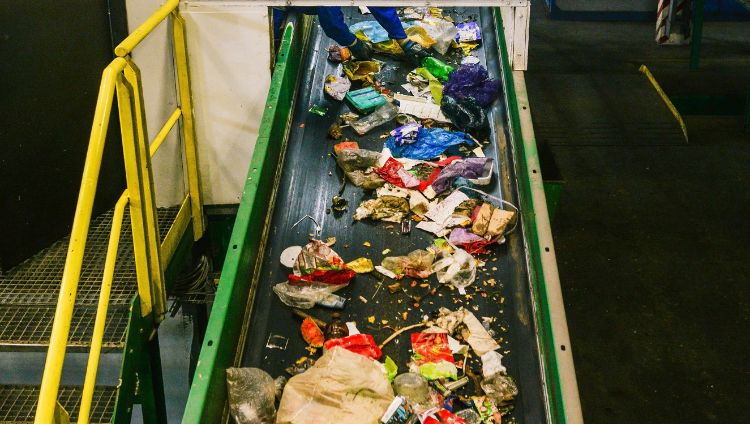
Industry Size and Importance
The global waste management sector boasts a staggering valuation of $890 billion, underscoring its profound importance within our economy.
Nevertheless, the concept of waste management has evolved beyond mere disposal. It now encompasses resource optimization, heightened recycling efforts, item reuse, and innovative approaches such as waste-to-energy or composting.
Environmental Impact
Inadequate waste management practices pose grave environmental risks, including pollution, land degradation due to excessive landfill use, and air quality deterioration.
Conversely, proficient waste management strategies mitigate these hazards, fostering cleaner and healthier air, soil, and water resources.
Related Post: How Waste Management affects the Environment?
Rules and Laws
Governments all around the world make rules about how we handle waste to keep the environment safe and people healthy.
Companies have to follow these rules, so it’s super important for them to have a good plan for managing waste. If they don’t, they might have to pay fines or deal with legal problems.
Related Post: Waste Management Dumpster Rules

Saving Money
When we manage waste better, we can actually save a lot of money. Reducing waste and recycling not only helps the environment, but it also cuts down on costs, like disposal fees and buying new materials. It’s a win-win!
The Three R’s: Reduce, Reuse, Recycle
Waste management plans often focus on the “Three R’s”:
Reduce: Minimizing waste generation through efficient processes.
Reuse: Finding ways to use materials multiple times.
Recycle: Sending waste materials to recycling facilities to create new products.
Technological Advancements
Technology plays a significant role in waste management, with innovations in waste-to-energy, digital tracking systems , and waste sorting technologies improving efficiency.
Describe Your goal
Creating a mission statement is crucial because it serves as a dependable guide for your business, similar to how a detailed map helps you navigate a new city. It establishes the direction for your business vision and answers fundamental questions like:
- What key milestones are you aiming to reach?
- What broad objectives are you pursuing?
For instance, your mission might concentrate on goals such as reducing landfill waste or improving recycling processes.
No matter your focus, ensure your mission statement is both succinct and clear. It should also embody your core values, which represent the principles you adhere to as you work towards your goals.
These values could emphasize outstanding customer service, environmental responsibility, or the attainment of significant business achievements.

Research your Market
In the part of your plan where you talk about the market, you need to focus on your target customers and what you know about them. This includes who they are and what your competition is doing in the market. It’s also important to talk about what’s happening in the market right now.
Here’s why this matters:
Knowing your customers better helps you sell your services.
It shows how your business can fit into the market.
It gives the reader more information about your business.
It helps you figure out how much it might cost to get a share of the market.
You should also mention the big companies in the market and how they’re doing. This helps the reader see how your plan compares to the competition.
Doing research about the market is really important for your waste management company. It gets you ready for the challenges in the waste management industry. Plus, when you know what’s happening in the market, you might find new ways to make money.
Establish a Waste Management Team
Next, prioritize building a strong waste management team. Start by selecting reliable members from your existing staff who can take charge of this initiative.
If waste management feels overwhelming, consider designating a specific leader to oversee the entire process.
Including team members with diverse expertise in various waste types can also be highly beneficial. A range of skills can enhance your efforts!
Establishing a waste management team fosters a sense of accountability. Without a specific waste handler, you may encounter disorganization. However, with a dedicated team in place, you can set clear deadlines and guidelines to ensure waste management is both efficient and timely.

Frequently Asked Questions
How can we make waste management more efficient.
Efficiency in waste management can be achieved through a combination of strategies.
One key approach is to reduce waste generation at its source by optimizing processes and adopting eco-friendly practices.
Implementing recycling programs is another crucial step, encouraging the separation and proper disposal of recyclable materials, such as paper, plastic, glass, and metal.
Reuse of materials and items within an organization can also significantly reduce waste.
What is a waste management plan?
A waste management plan is a structured document that outlines how a business or organization intends to handle its waste efficiently and responsibly.
Typically, such a plan encompasses a range of strategies, including waste reduction, recycling, reuse, proper disposal, and compliance with waste management regulations.
It may specify waste streams within the organization, detail procedures for waste collection and sorting, establish waste reduction goals, and promote sustainability practices.
What are 5 waste management strategies?
Five fundamental waste management strategies include waste reduction, recycling, reuse, composting, and waste-to-energy.
Waste reduction focuses on minimizing waste generation, often by simplifying processes and reducing excess materials.
Recycling involves separating and recycling materials like paper, plastic, glass, and metal to divert them from landfills.
Reuse encourages the repeated use of items before disposal, reducing the need for new materials.
Composting converts organic waste, such as food scraps and yard debris, into nutrient-rich compost.
Waste-to-energy strategies utilize waste as an energy source, like extracting biogas from organic waste or incinerating waste materials to produce energy.
If you’re interested in picking up some great tips on how to manage waste efficiently, visit our Blog .

- Request Pickup
- Service Area
- Dumpster Type

Waste Management Plan
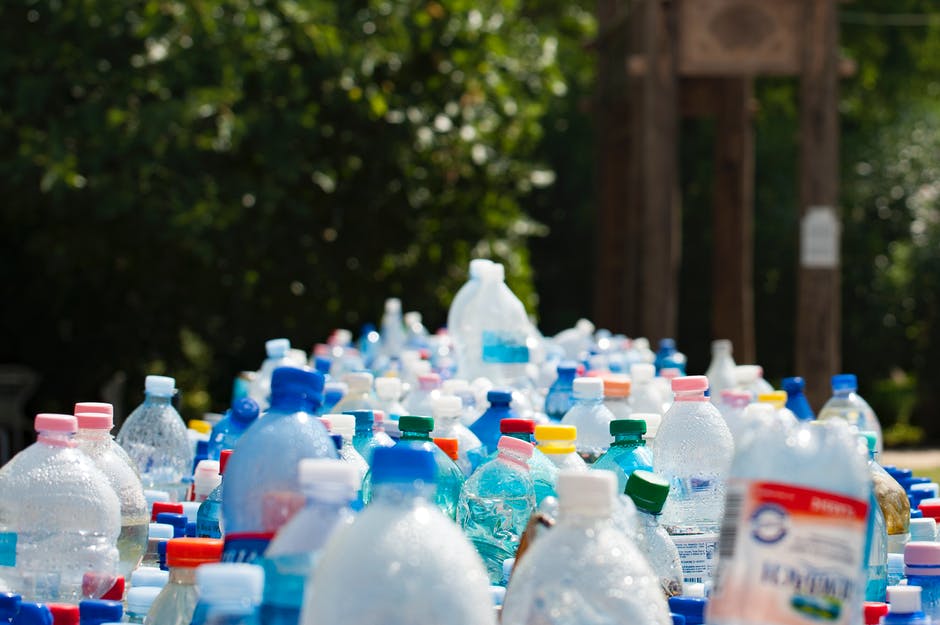
Aside from the responsibility of the business or the project team to protect the environment of the location where the project will be implemented, one of the main reasons why a waste management plan must be made is to protect the image or brand of the organization.
Through a well-formulated waste management plan, all the entities who will benefit from the project can secure their safety especially in terms of their health conditions. Proper quality management , waste handling and garbage disposal can reflect the commitment of the project team to deliver a well-rounded and sustainable project output. Develop a comprehensive and well-formatted waste management plan. Refer to the downloadable examples that you can browse through in this post along side tips and other guidelines.
Scope Of Waste Management Plan Template
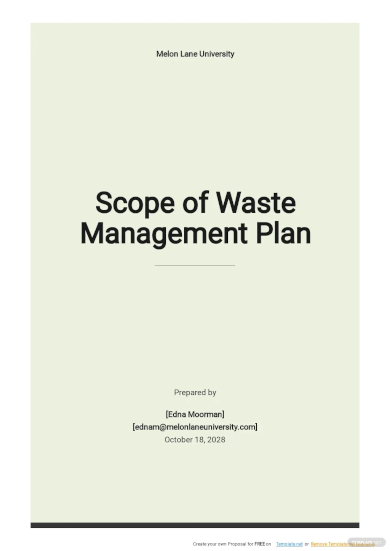
- Google Docs
- Apple Pages
Size: 37 KB
Free Simple Project Waste Management Plan Template
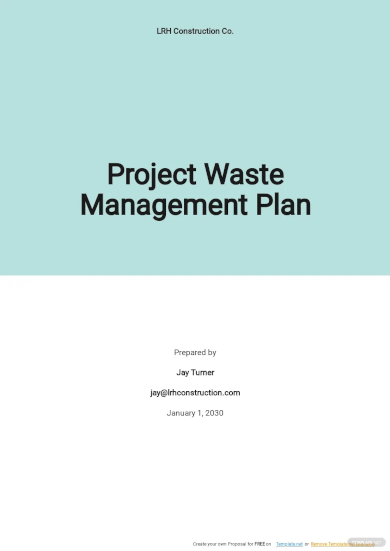
Size: 34 KB
Waste Management Business Plan Template
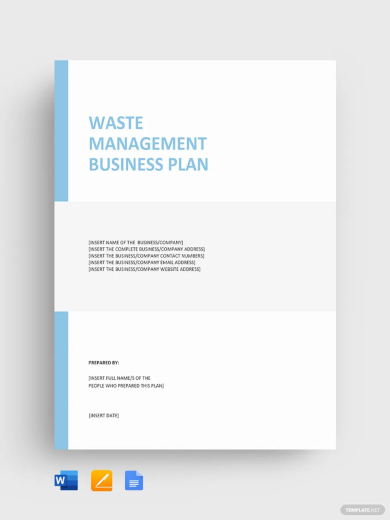
Size: 41 KB
Waste Management White Paper Template
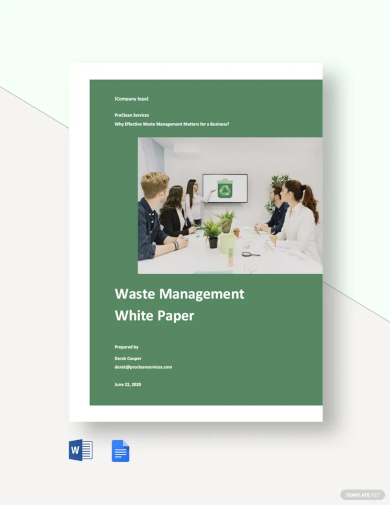
Size: 75 KB
Comprehensive Waste Management Plan Example
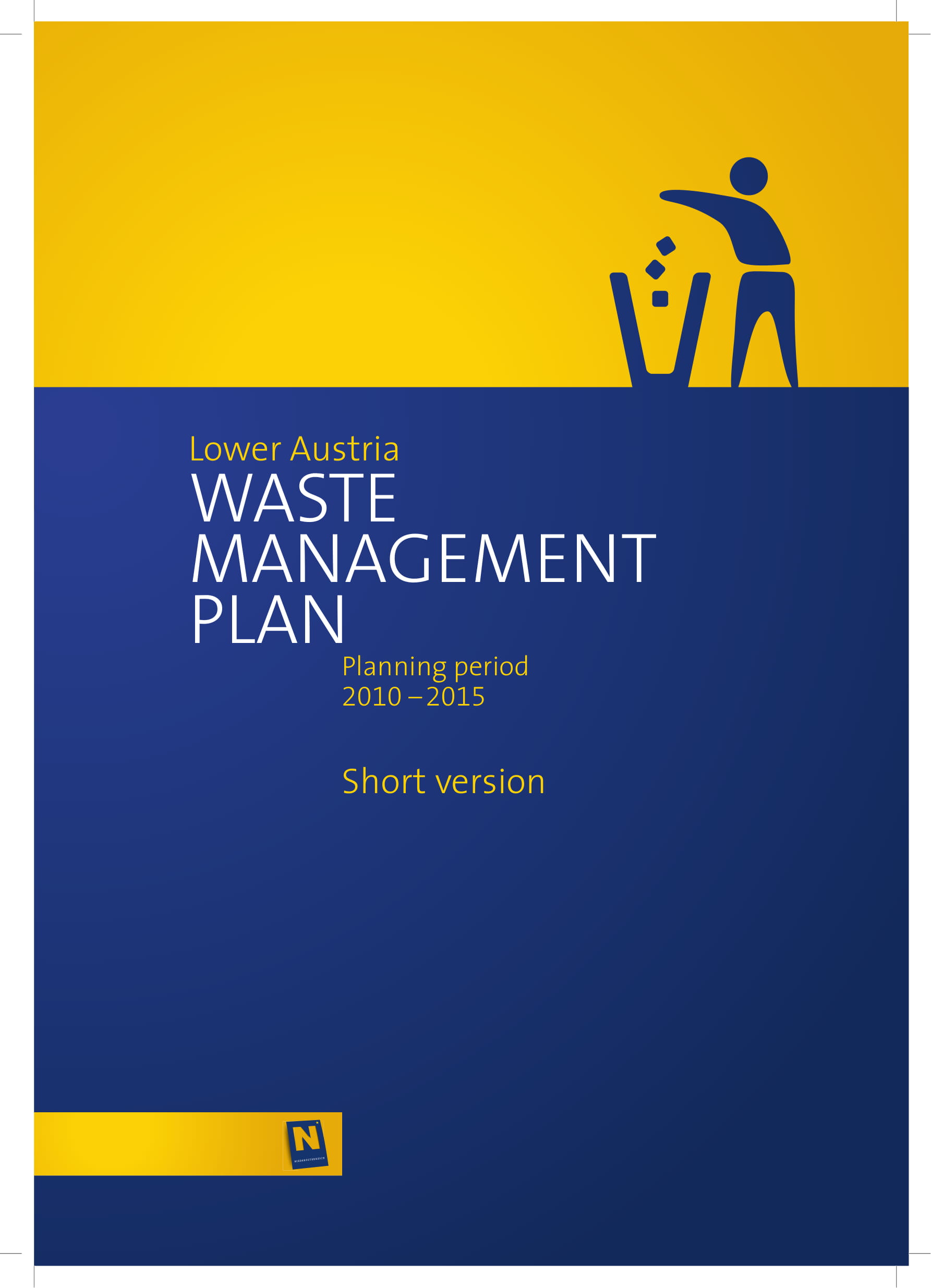
Solid Waste Management Plan Example
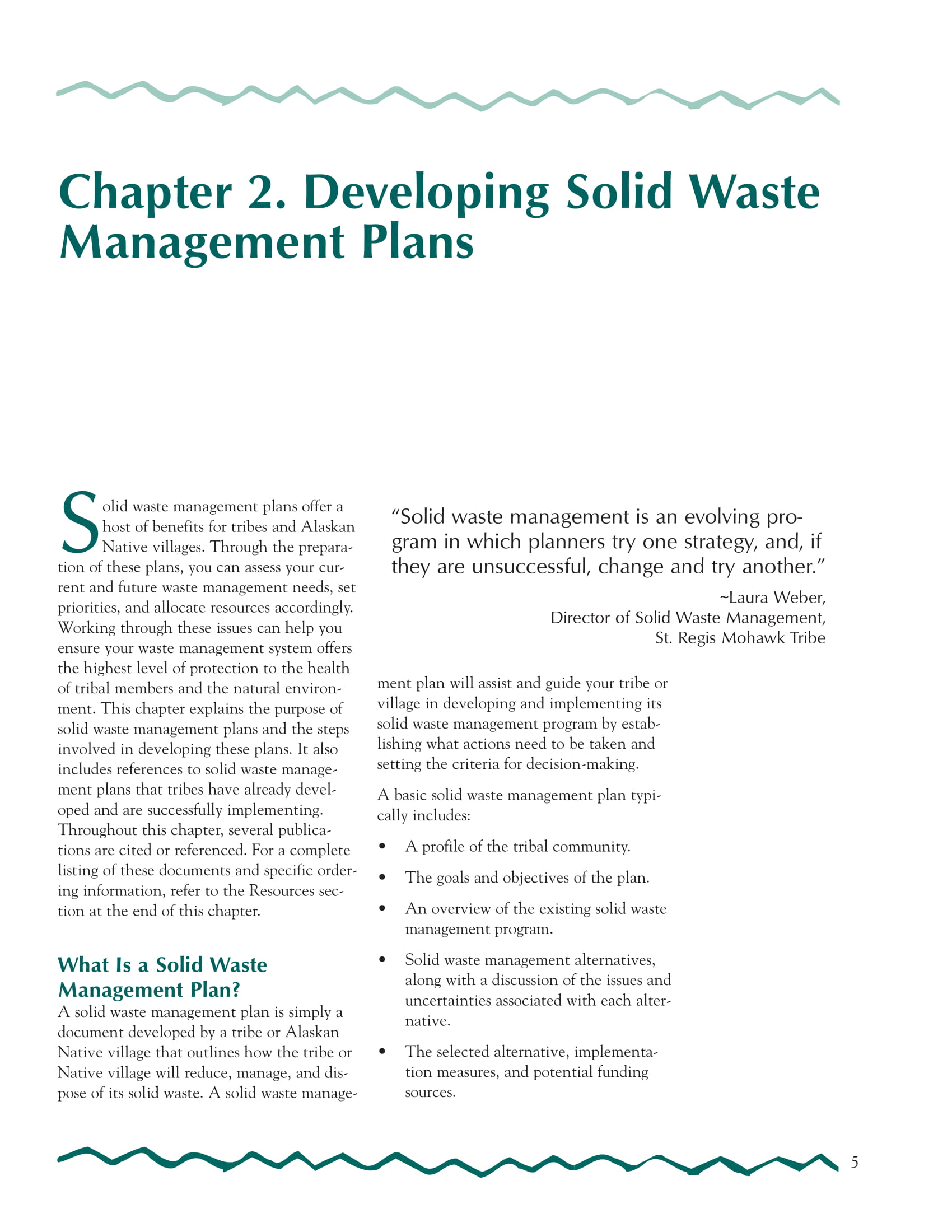
Size: 295 KB
Preliminary Site Waste Management Plan Example
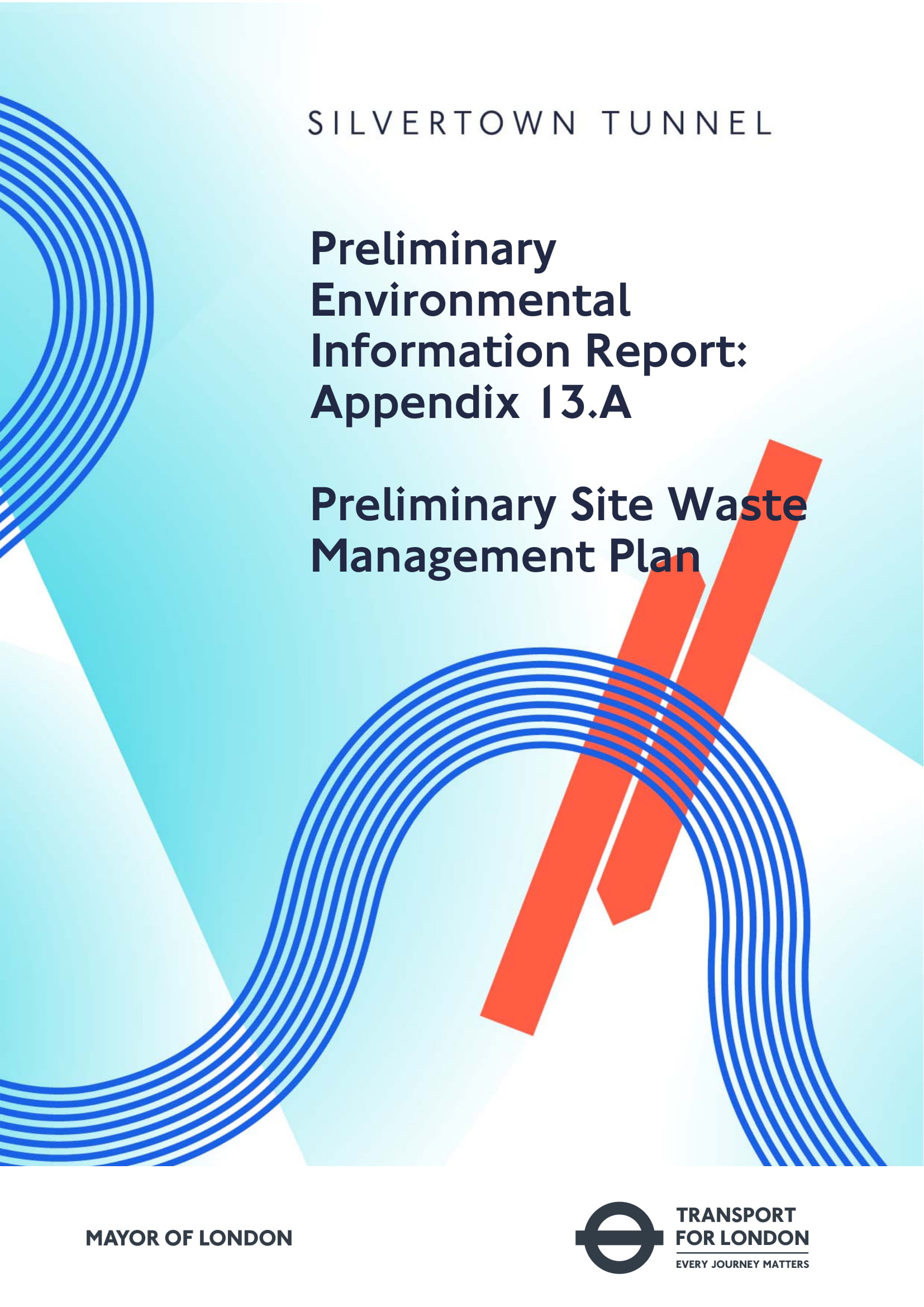
Why Is a Waste Management Plan Necessary?
There is a wide scope of management plans that are used by businesses and other organizations for particular activities. One of these management plans is that which concern wastes. Especially for construction projects, a waste management plan is very important to be at hand. Having this document can ensure that entities follow quality measures and standards when it comes to the proper disposal of the wastes that they have made or produced within the entirety of project development. Here are some of the reasons why it is essential to create a waste management plan:
1. A waste management plan serves as a comprehensive guide on how wastes can be reduced in every project, program or any undertaking. Doing this can reduce the risk of health issues and other concerns that arise whenever improper waste handling and disposal occurs.
2. A waste management plan allows stakeholders to be aware of their responsibilities. It is essential for all the stakeholders of the project to know how they will function from the handling of wastes up to the proper disposal of such. Waste management and organization can be easier if there is already a business plan that can serve as a reference to all entities involved in the project.
3. A waste management plan provides an idea about different kinds of wastes and how they can be managed to ensure minimal to no negative effect to stakeholders. Different types of wastes require different kinds of management strategies. Through a waste management plan, it will be faster for the project team to segregate the actual wastes that they have produced and accumulated depending on the kind of project that they are immersed in. You may also see project plan examples .
4. A waste management plan can help ensure businesses that they will be protected from improper waste disposal accusations. If you have this document and if you are implementing its content accordingly, then you can present a proof or an evidence when court trials and other legal concerns arise. However, it is still important for you to get clearances and other permits relating to the matter. You may also like annual plan examples and samples .
District Solid Waste Management Plan Example

Size: 799 KB
Industry Waste Management Plan Guideline and Example
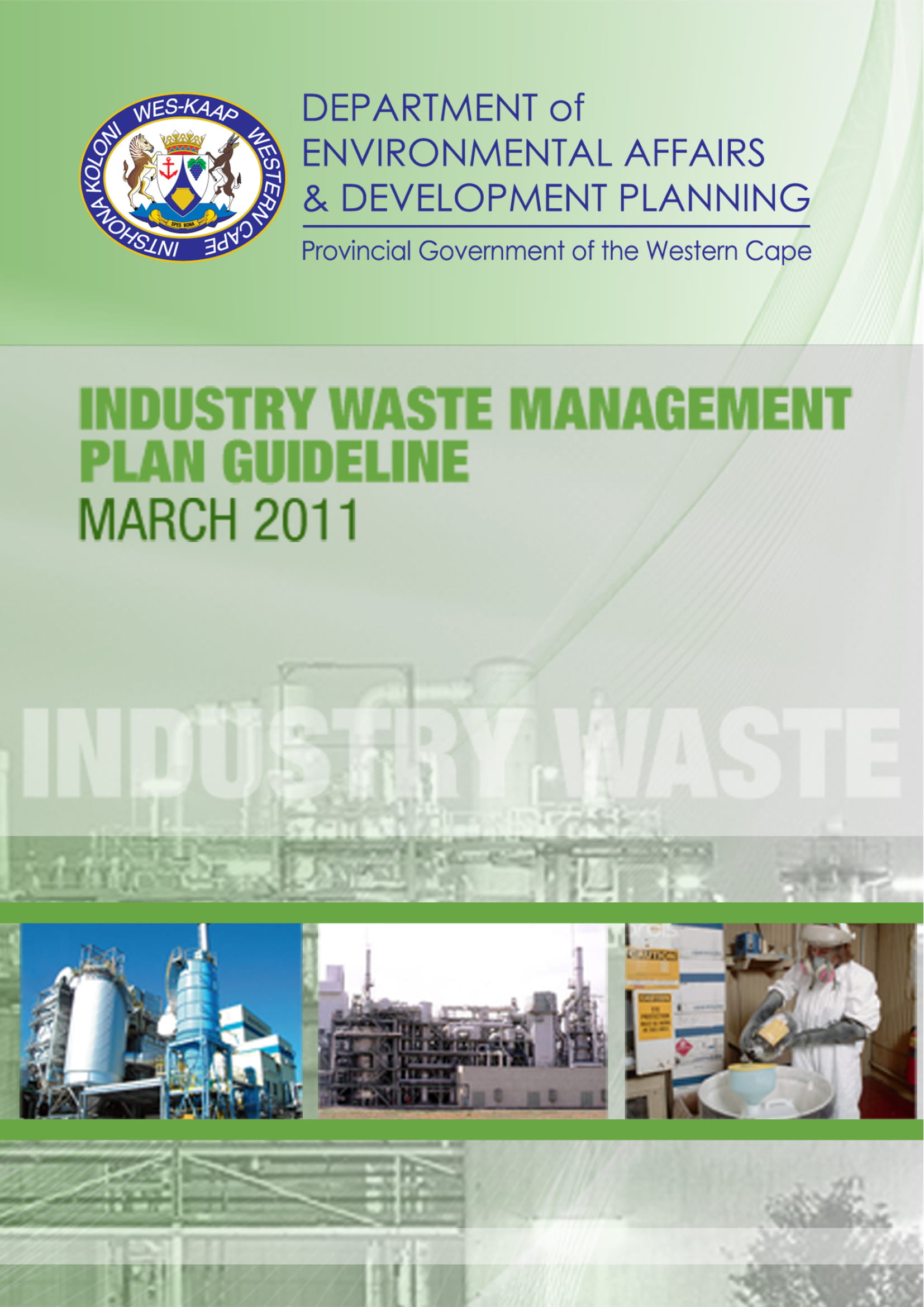
Waste Management Plan Example
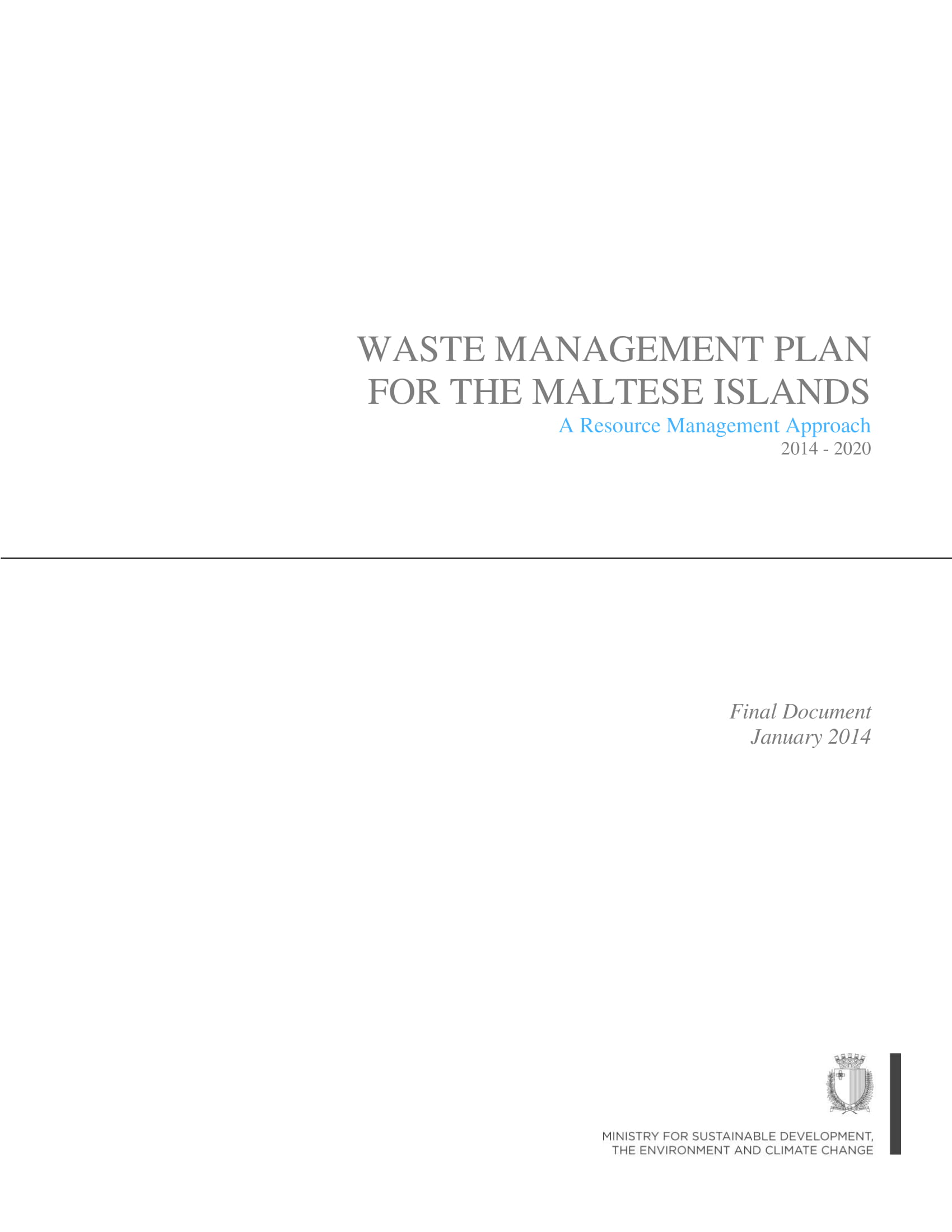
Construction Waste Management Plan Example
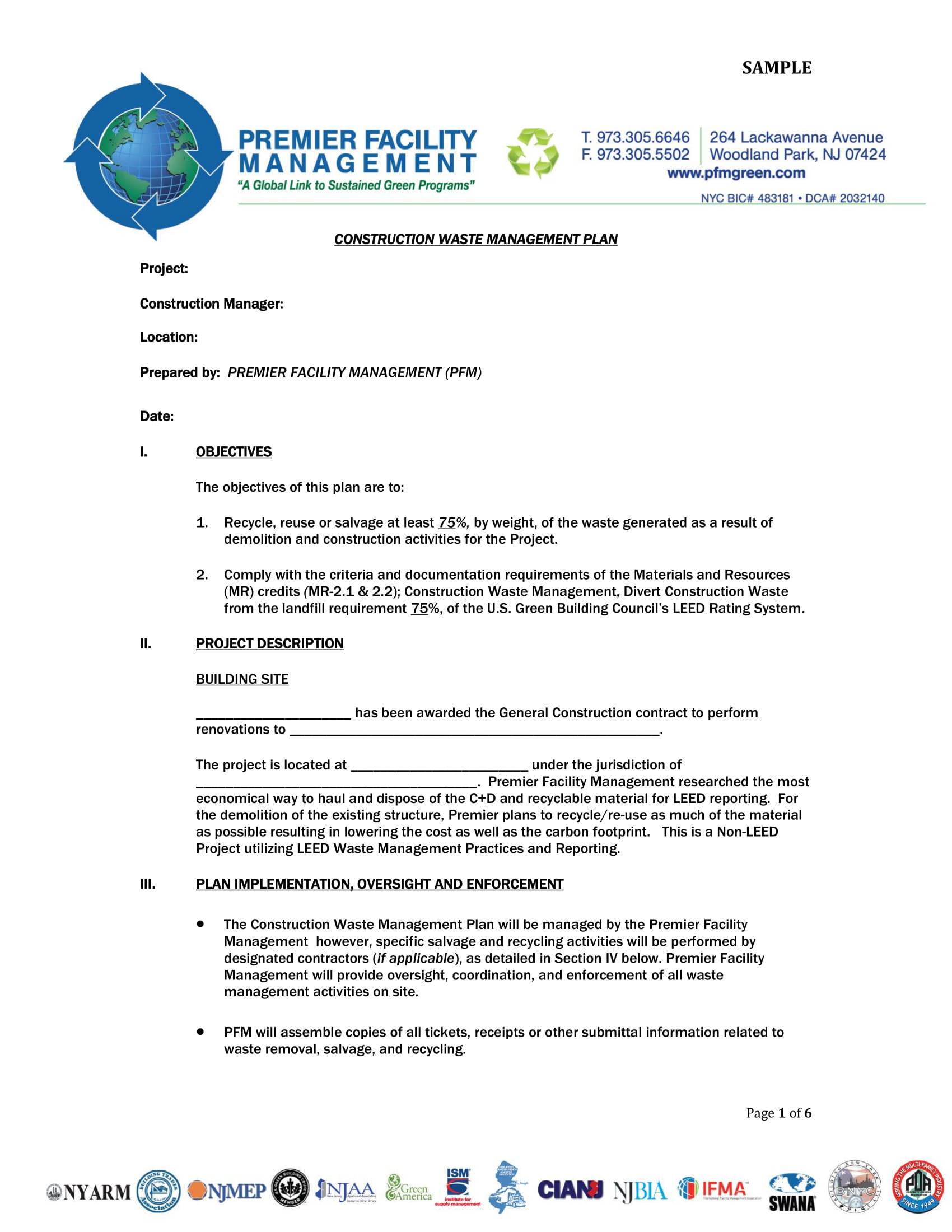
Size: 346 KB
Things to Remember When Making a Waste Management Plan
Every waste management plan must be supported by a solid implementation plan . It is not enough for you to create a great waste management plan – what is important is for you to put these plans into actions. There are several things that you need to remember if you plan to improve the waste management of your project. Knowing the basics of waste management planning can help you a lot when it comes to achieving your end goal in relation to the development of the specified document.
A waste management plan is not only beneficial to the external stakeholders of a project. The management and the entire project team can also benefit from it as they can ensure that the project that they have developed can provide a safe and healthy environment. Listed below are the things that are important to be considered and looked into if you have already decided to create a waste management plan.
1. Make sure that you will have proper understanding with the kinds of wastes that you will handle. Again, wastes differ depending on the particular kind of project where these wastes came from. Proper action plans can be created if you know the root of the activity.
2. Just like any project processes, there are certain elements that you need to consider when creating a waste management plan. Know the workforce that you need for deliverable to be provided, list the cost of the waste management execution and develop a timeline that can showcase the duration of waste management activities. You also have to specifically take note of the equipment, items and other materials that are essential to be present during the implementation of your waste management strategies .
3. Know what you will be doing with the wastes that you have listed. There are wastes that you can recycle while there are also some that you can reuse. In a lot of instances, wastes can also be thrown away or refused due to its hazardous content or physicality. If you want to come up with a successful waste management plan, you first have to be aware of how you can efficiently and effectively manage your project’s waste. You may also check out advertising plan examples & samples .
Waste Management Plan – Methodologies and Example
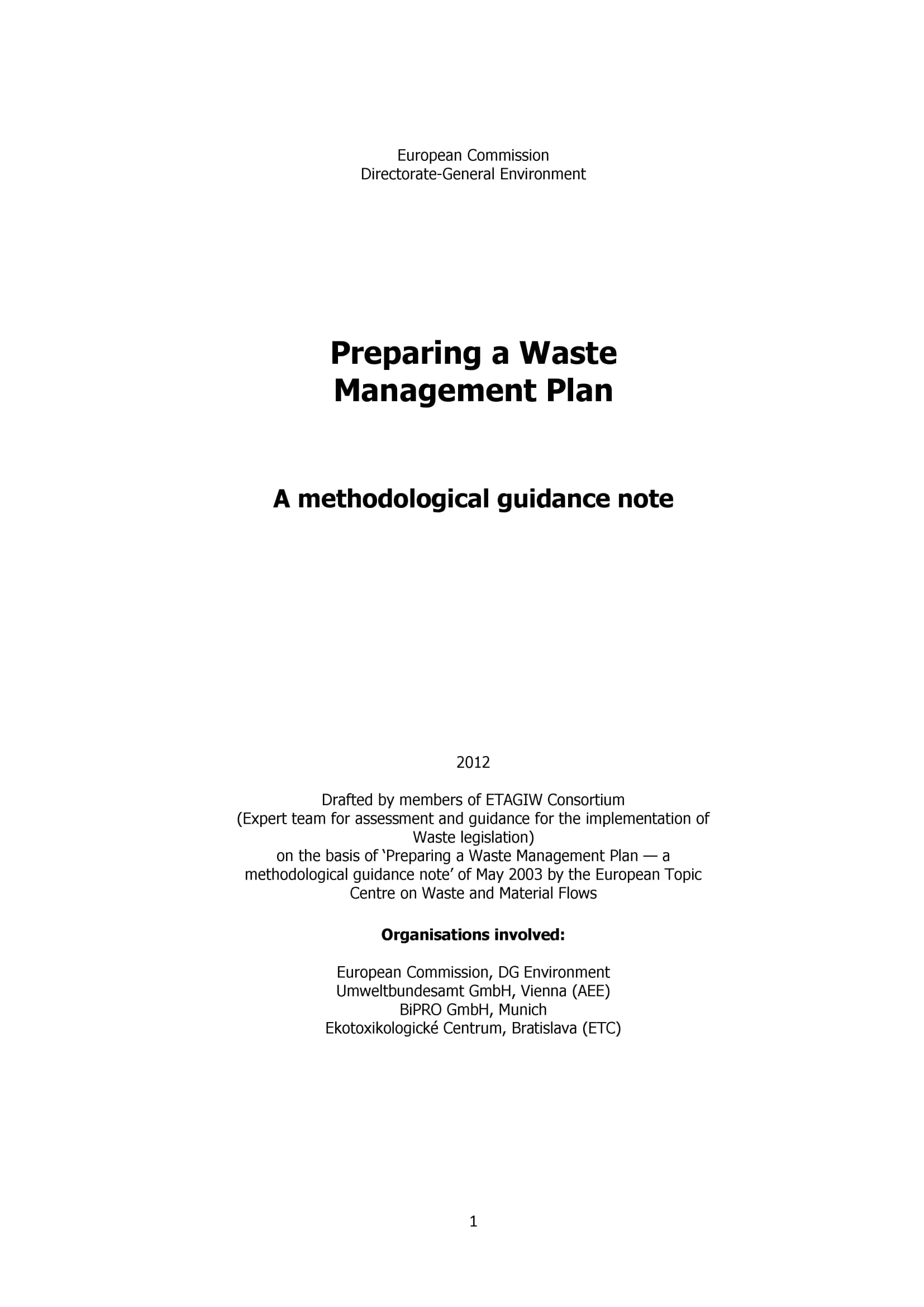
Size: 617 KB
Site Waste Management Plan (SWMP) Example
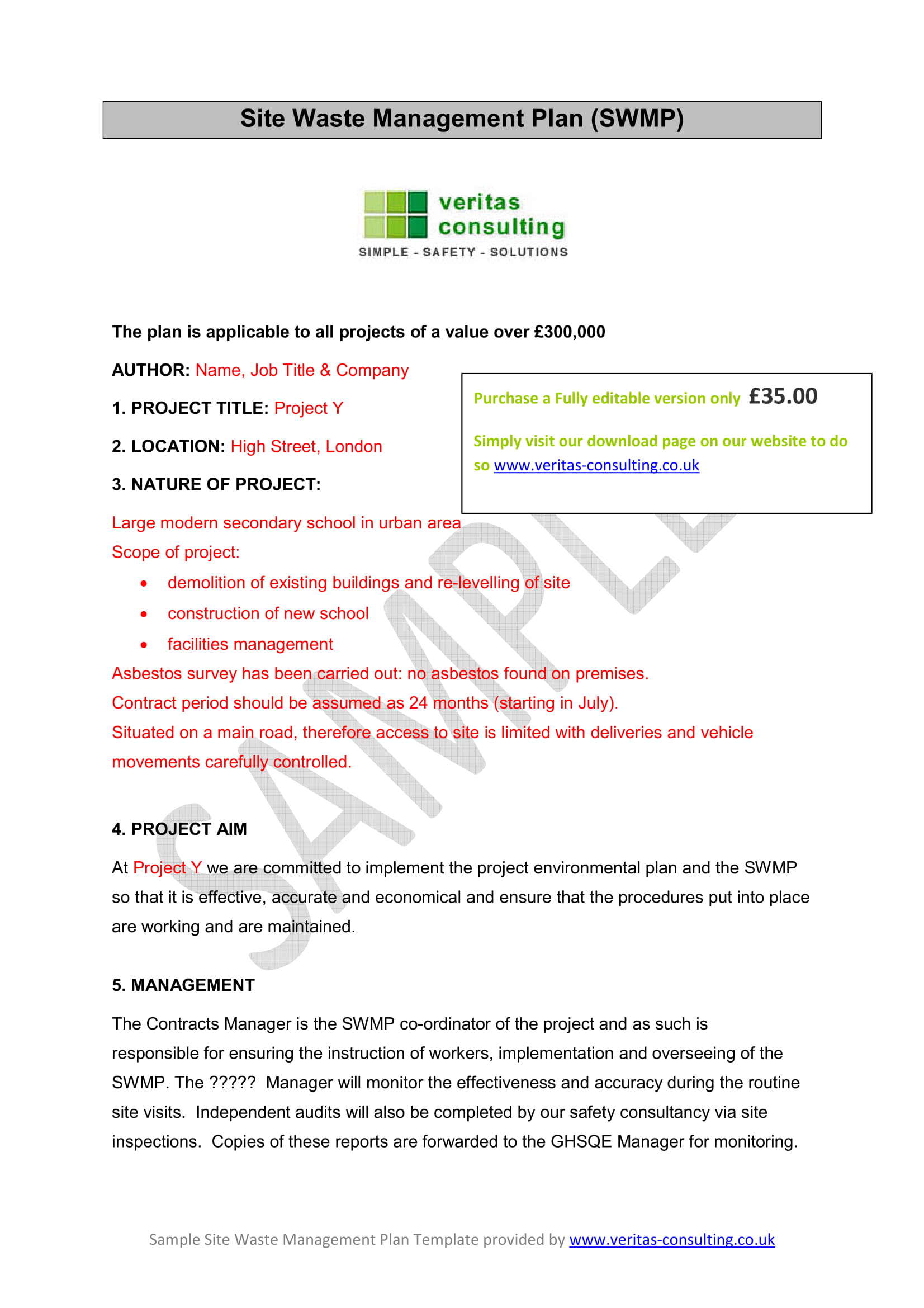
Size: 460 KB
Simple Site Waste Management Plan Example
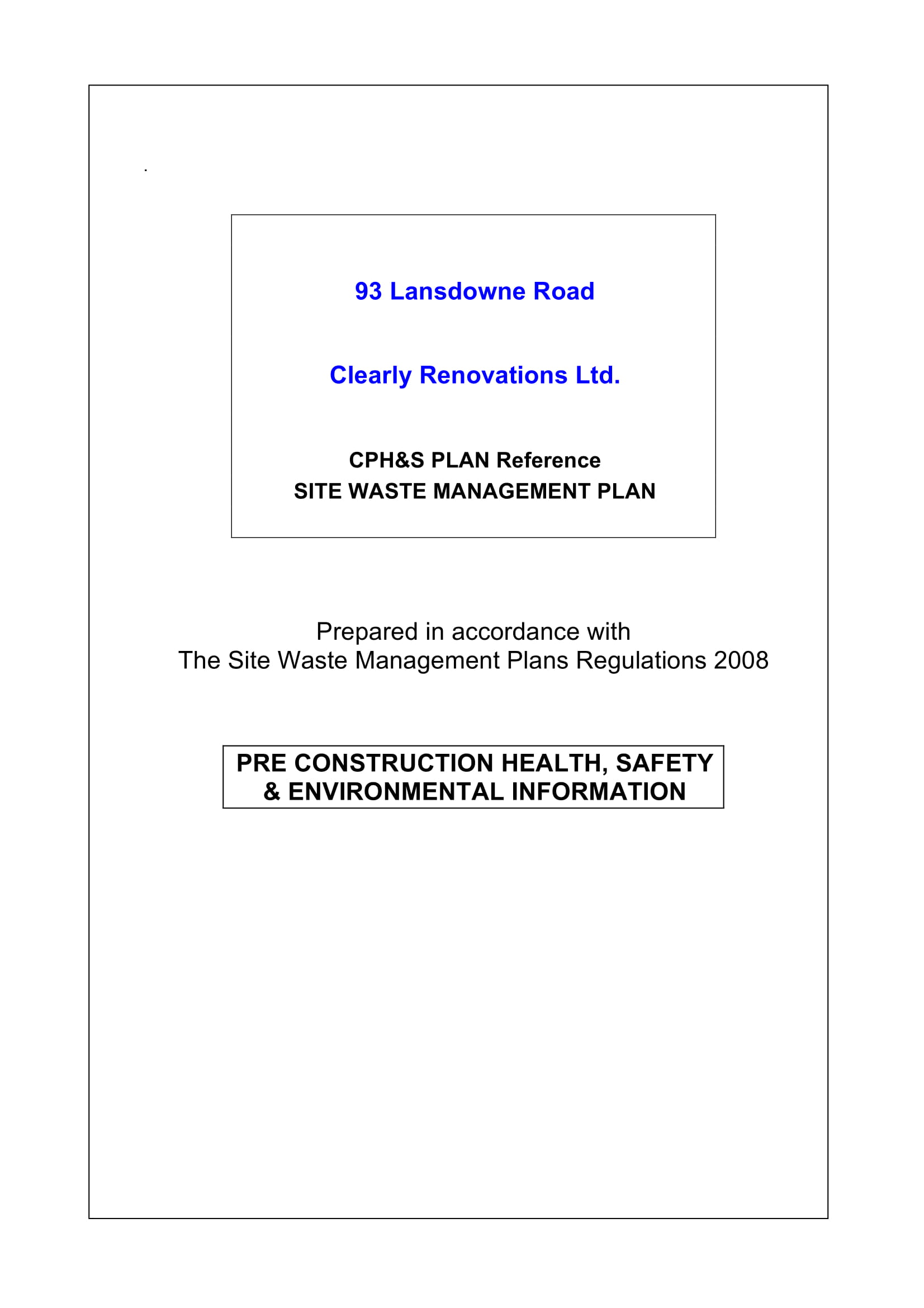
Size: 465 KB
Basic Construction Waste Management Plan Example
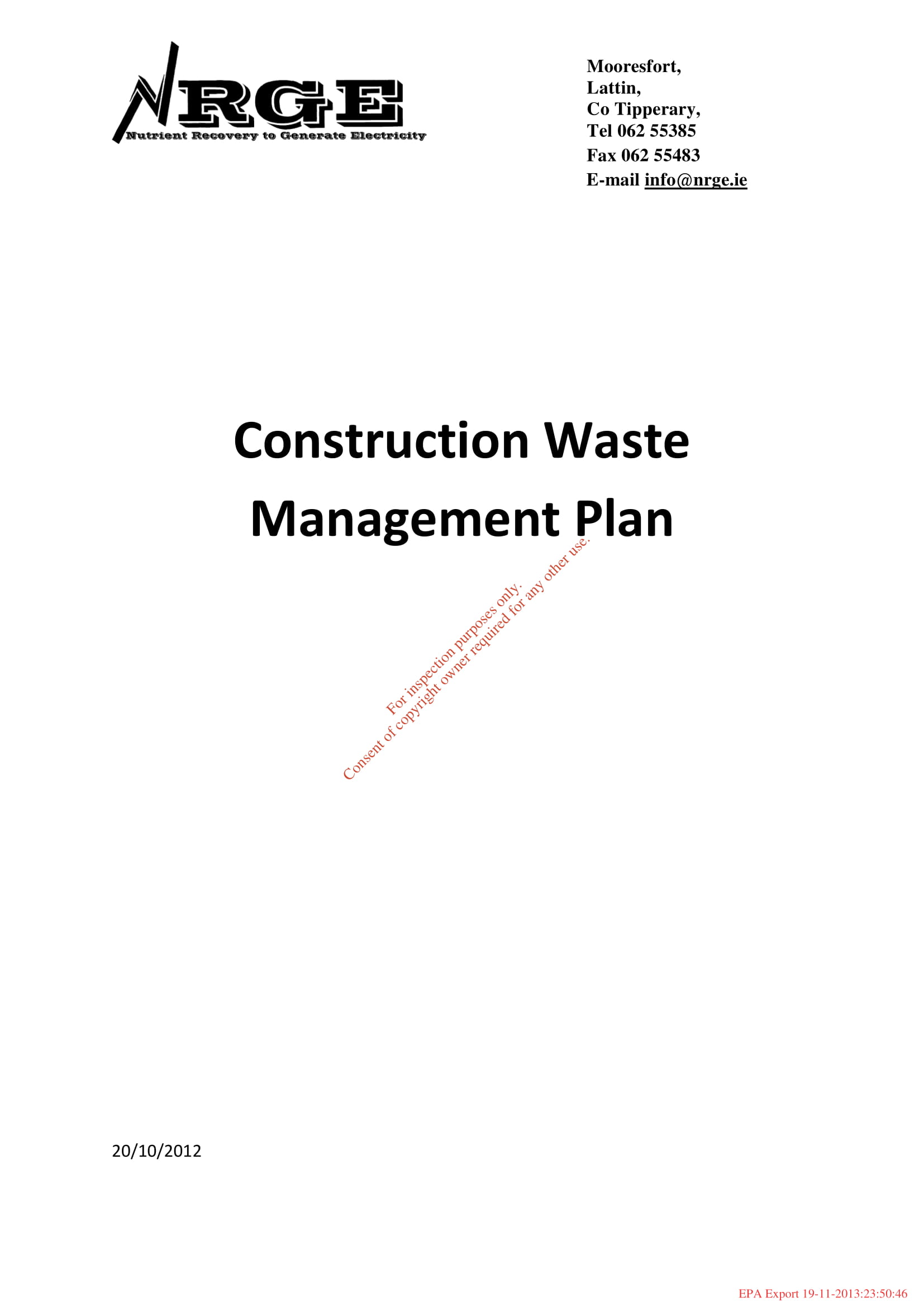
Size: 421 KB
Tips for Waste Management Plan Development
Just like a business plan , a waste management plan must be created precisely. It must have a direct discussion of its terms, limitations, and scope. If you do not know how to create a waste management plan from scratch, there are some things that can help you along the way. We got you covered with guidelines and a few reminders about this matter. Here are some useful tips that can help you come up with an outstanding waste management plan:
1. Provide clear and defined instructions to all the people who are responsible to deliver particular responsibilities and call to actions. You have to think of the safety and capability of the workforce when handing them with particular waste management duties.
2. Be particular with your simple plan . Have a list of the entities who will take care of reusable wastes. Your waste management plan must also contain the details of the dump sites and centers where other kinds of wastes will be handed to.
3. Always have a goal in mind. Know the purpose on why waste management plan is essential for your project. If you are aware of the objective of the activity, then you can help people understand the importance of the subject matter.
4. Review the waste management plan first before submitting it to the decision makers of the project. It will also be helpful if you will seek professional advice from experts who have dedicated their careers in the development of a usable waste management plan. You may also see risk plan examples & samples .
Waste Management Plan Format Example
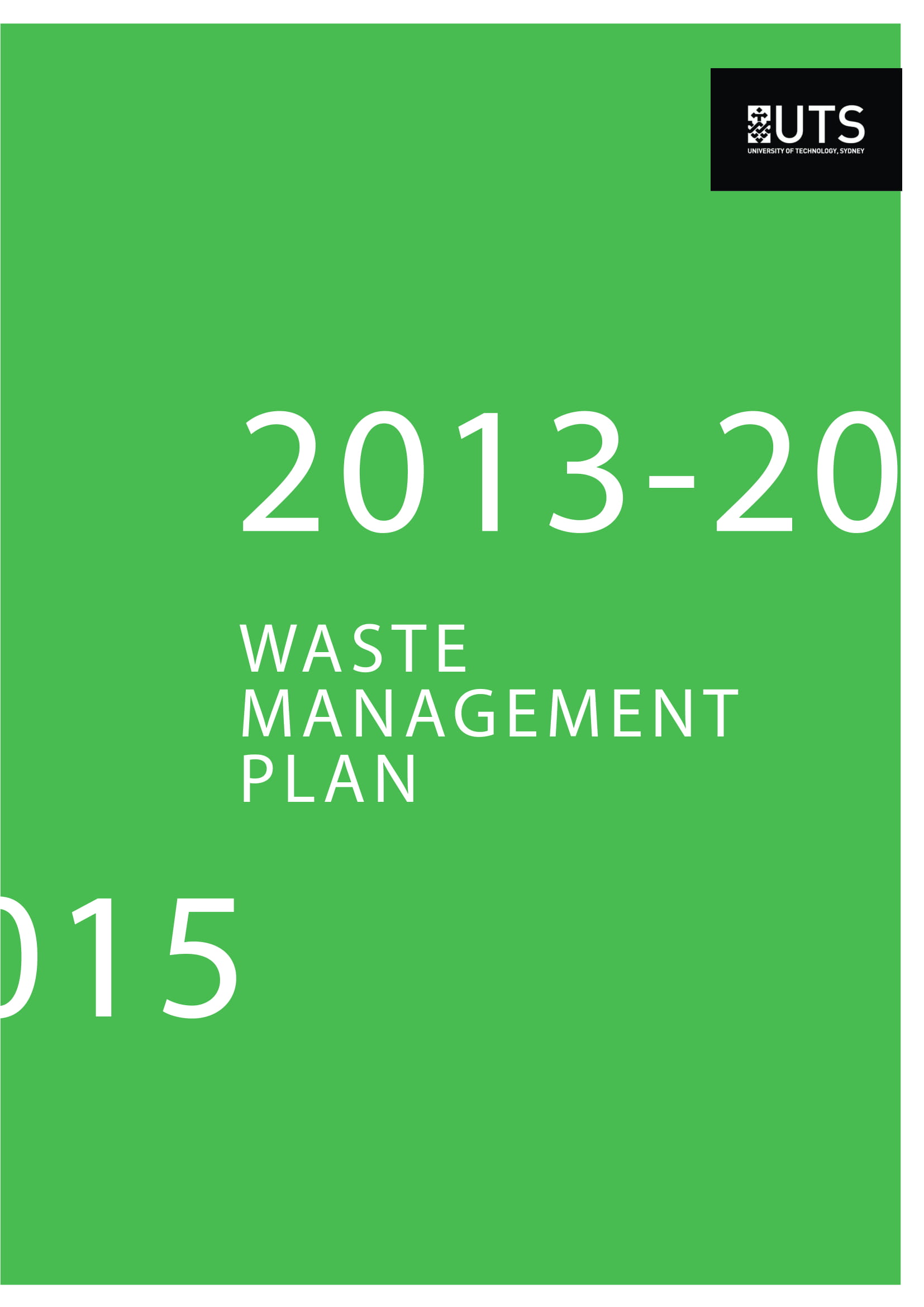
Construction Waste Management (CWM) Plan Example
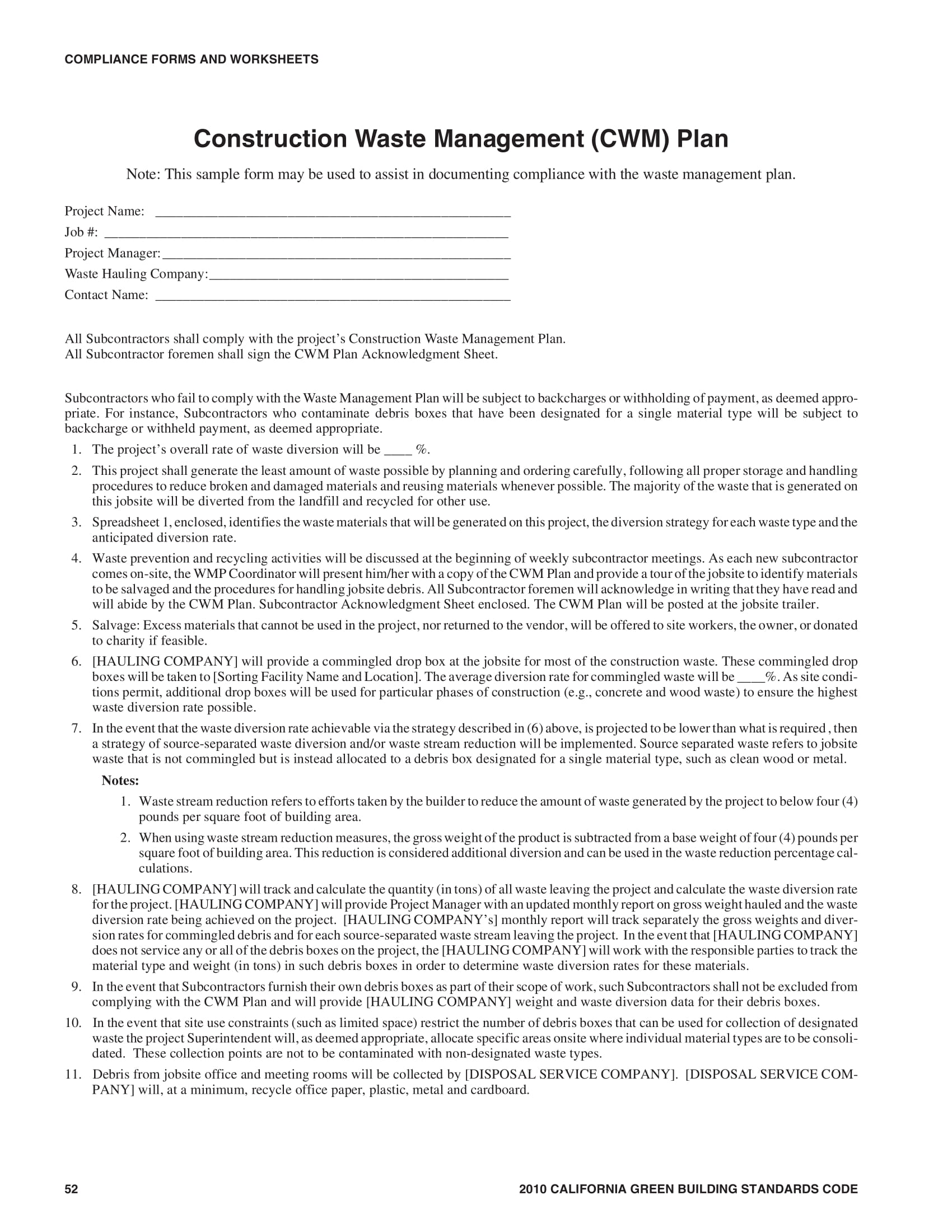
Waste Management Plan Template Example
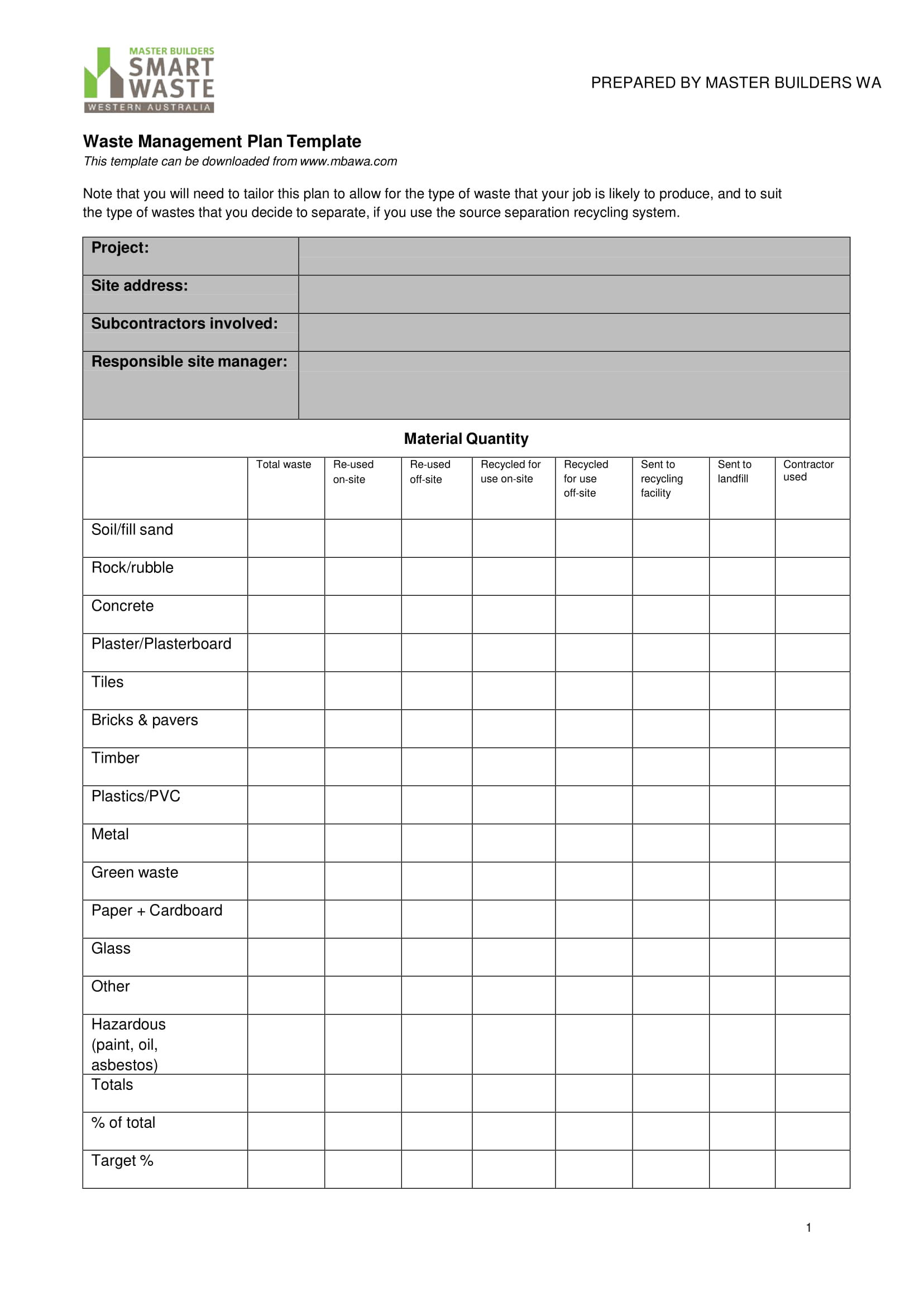
Size: 47 KB
Company Waste Management Plan Example
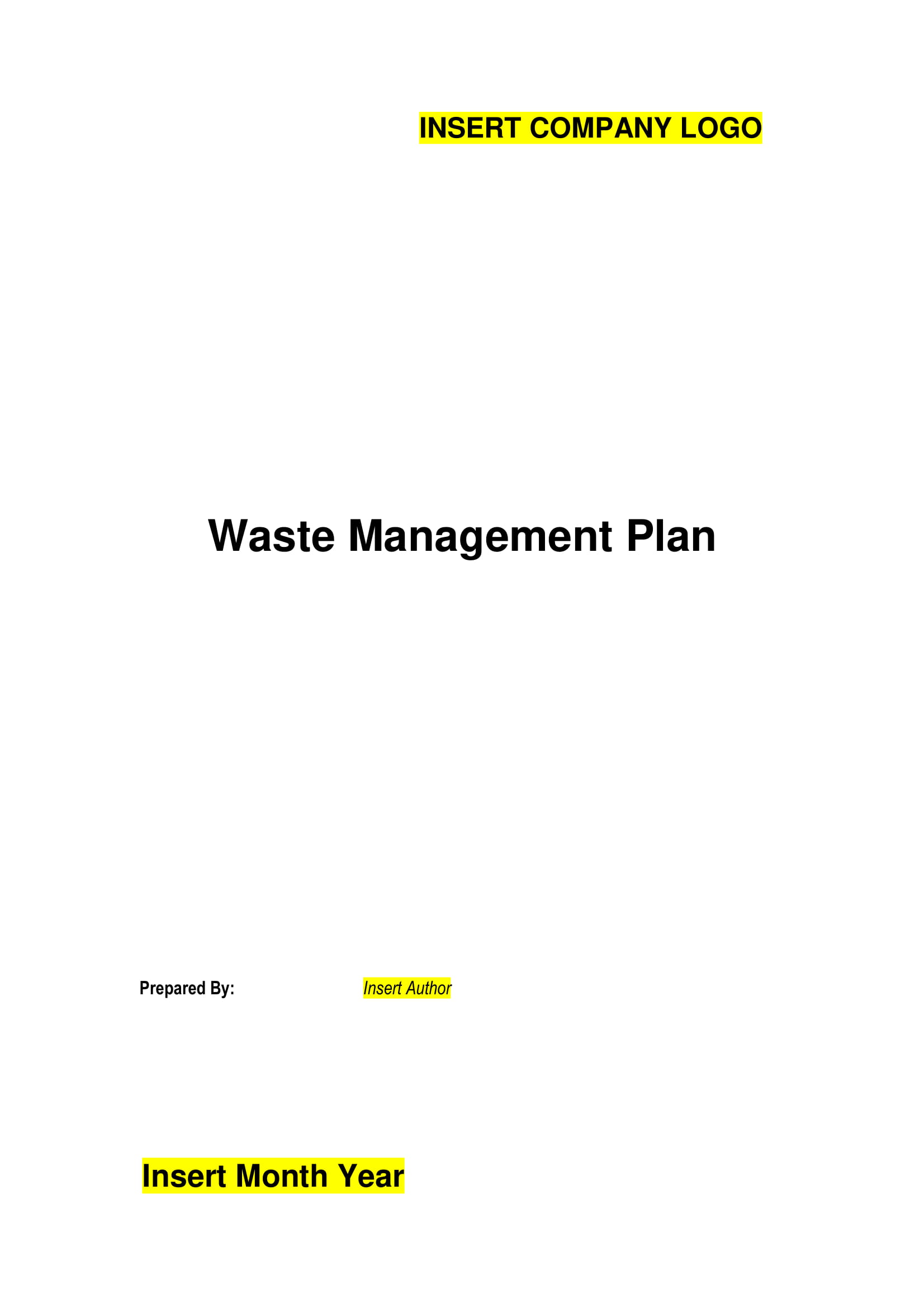
Size: 167 KB
Make a Waste Management Plan Now
As you make your project become realized, you also have to be aware of the environmental issues that we are currently facing right now. Be conscious with how you handle and dispose your wastes. If you truly want to have an impressive waste management plan, here are a few things that can help you jump start in the process of formulating the waste management plan content:
- Estimate the amount of waste that your business may produce. You may also see event plan examples .
- Allocate a budget that is sufficient enough for the activities listed in your waste management plan.
- Be consistent when it comes to the objective that you would like to achieve.
Having a hard time in putting together all the information that you want to place in the waste management plan for your project? Use relevant examples and other kinds of references. Having templates and existing waste management plans as your guides can help you improve the phase of your waste management plan creation especially in terms of formatting and content development. Out of all the plan examples that you will be doing from the beginning until the end of the project, make sure that you will give undivided attention in the successful development of your waste management plan.
Text prompt
- Instructive
- Professional
Create a study plan for final exams in high school
Develop a project timeline for a middle school science fair.

Waste Management Services Business Resilience Plan Template

What is a Waste Management Services Business Resilience Plan?
A Waste Management Services Business Resilience Plan is a strategic plan that outlines the steps a business should take to ensure the continuity of their waste management services and operations. It typically covers topics such as operational efficiency, safety, customer service, and waste management. By creating a plan that addresses both short and long-term objectives, a business can be better prepared to handle sudden changes in the market and unexpected disruptions to their operations.
What's included in this Waste Management Services Business Resilience Plan template?
- 3 focus areas
- 6 objectives
Each focus area has its own objectives, projects, and KPIs to ensure that the strategy is comprehensive and effective.
Who is the Waste Management Services Business Resilience Plan template for?
This plan template is designed for waste management companies and organizations providing waste disposal and recycling services. By creating a plan that outlines specific objectives, actions, and measurable targets, businesses in the waste management sector can effectively establish their business resilience plans and ensure the continuity of their waste management operations and environmental services.
1. Define clear examples of your focus areas
A focus area is a broad area of focus that a business needs to address in order to achieve its overall goals. Examples of focus areas that could apply to waste management services businesses include increasing operational efficiency, enhancing safety, and improving customer service.
2. Think about the objectives that could fall under that focus area
Objectives are specific goals that a business needs to achieve in order to achieve its overall focus area. Objectives should be measurable, achievable, and relevant to the focus area. Examples of some objectives for the focus area of Increase Operational Efficiency could be: Increase Efficiency of Waste Disposal, and Decrease Shipping Wait Time.
3. Set measurable targets (KPIs) to tackle the objective
KPIs or Key Performance Indicators are measurable targets or goals that a business sets in order to measure the success of their objectives. KPIs should be tracked regularly in order to ensure that the business is on track to achieving its objectives. An example of a KPI for the focus area of Increase Operational Efficiency could be: Decrease Avg Time to Process Waste.
4. Implement related projects to achieve the KPIs
Projects or actions are steps that a business takes in order to achieve their KPIs or measurable targets. Projects should be related to the objectives and focus areas that the business is trying to achieve. An example of a project related to Increase Operational Efficiency could be: Implement Automation.
5. Utilize Cascade Strategy Execution Platform to see faster results from your strategy
Cascade Strategy Execution Platform helps businesses create and manage their strategic plans. It provides an easy-to-use visual interface that helps businesses track their objectives, actions, and KPIs in real-time, making it easier to track progress and identify areas where improvement is needed.

IMAGES
VIDEO
COMMENTS
Financial Plan. Summarize your financial goals and projections, including revenue targets and profit margins, to provide a clear overview of your waste management service's financial future. Example: GreenHorizon aims to achieve $6.7 million in annual revenue by 2028, with a 15% EBITDA margin.
Here are a few tips for writing the market analysis section of your waste management business plan: Conduct market research, industry reports, and surveys to gather data. Provide specific and detailed information whenever possible. Illustrate your points with charts and graphs. Write your business plan keeping your target audience in mind. 4.
A Sample Waste Management Business Plan Template. 1. Industry Overview. Companies that operate in the waste collection services industry basically collect hazardous and nonhazardous waste and recyclable materials. Non-hazardous waste includes municipal solid waste (household waste) and industrial and commercial waste.
A free example of business plan for a waste management company. Here, we will provide a concise and illustrative example of a business plan for a specific project. This example aims to provide an overview of the essential components of a business plan. It is important to note that this version is only a summary.
1. The executive summary. The first section of your waste management company's business plan is the executive summary which provides, as its name suggests, an enticing summary of your plan which should hook the reader and make them want to know more about your business.
1. Acquire investment. The biggest reason for businesses to create a business plan is to attract investors and make it easy for them to evaluate business value. Sending in a business plan is the easiest way to explain what your business does and why it is a great idea to invest in it.
Writing an Effective Waste Management and Recycling Business Plan. The following are the key components of a successful waste management and recycling business plan:. Executive Summary. The executive summary of a waste management and recycling business plan is a one to two page overview of your entire business plan. It should summarize the main points, which will be presented in full in the ...
Waste management is a form of project management proposal. It focuses on appropriately collecting solid waste all the way up to hazardous waste. In addition, a waste management business plan template is available for download below! There are numerous options, such as food waste management business plan pdf. If not, a medical waste management ...
Step 3: Brainstorm a Waste Management Business Name. Here are some ideas for brainstorming your business name: Short, unique, and catchy names tend to stand out. Names that are easy to say and spell tend to do better. Name should be relevant to your product or service offerings.
Here is a breakdown of the typical phases involved in launching a waste management company: Research and Planning (1-3 months): This includes understanding waste management industry regulations, identifying local market needs, and drafting a comprehensive waste management company business plan.
Starting a waste management company is a great idea as it provides a valuable service that helps to reduce environmental pollution and improve public health.. Furthermore, it is a growing industry with many opportunities for growth and innovation. But, before launching anything, make sure you have a business plan in place.
Launching a successful waste management business requires meticulous planning and preparation. Before diving into the business plan, entrepreneurs must navigate a critical 9-step checklist to ensure their venture is well-positioned for success. From identifying the target market and analyzing industry trends to securing the necessary funding and assembling a skilled management team, this ...
Steps Prior To Business Plan Writing. Before diving into the business plan for a smart waste management service, it's crucial to lay the groundwork and address several key considerations. This checklist outlines the necessary steps to ensure a well-informed and strategic approach to your venture. Step.
Identify Target Market and Customer Needs. Identifying the target market and understanding customer needs are crucial steps in developing a comprehensive Solid Waste Management business plan. By conducting thorough market research, entrepreneurs can gain valuable insights into the specific challenges, preferences, and pain points of their target audience, allowing them to tailor their services ...
The waste management industry is very capital-intensive - you will need to purchase trucks, containers, and other equipment. You'll also need to hire specialized drivers, pay licensing fees, and secure a waste disposal site for waste processing. 7. Open A Business Bank Account.
The projected P&L statement for a waste collection company shows how much revenue and profit your business is expected to make in the future. A healthy waste collection company's P&L statement should show: Sales growing at (minimum) or above (better) inflation. Stable (minimum) or expanding (better) profit margins.
4+ Waste Management Business Plan Samples. 1. Waste Management Business Plan. 2. Waste Services Business Management Plan. more. Businesses are pretty complicated entities to manage. Even more difficult when you want your venture to succeed. It can be quite a chore to keep track of all the components in and around the business, making sure that ...
Industry Overview for Waste Management business plan. The waste management industry plays a crucial role in preserving our environment and ensuring sustainable practices in business operations. With increasing concerns about environmental conservation, regulations, and cost-efficiency, waste management has become a pivotal aspect of modern ...
1. A waste management plan serves as a comprehensive guide on how wastes can be reduced in every project, program or any undertaking. Doing this can reduce the risk of health issues and other concerns that arise whenever improper waste handling and disposal occurs. 2. A waste management plan allows stakeholders to be aware of their ...
A Waste Management Services Business Resilience Plan is a strategic plan that outlines the steps a business should take to ensure the continuity of their waste management services and operations. It typically covers topics such as operational efficiency, safety, customer service, and waste management.